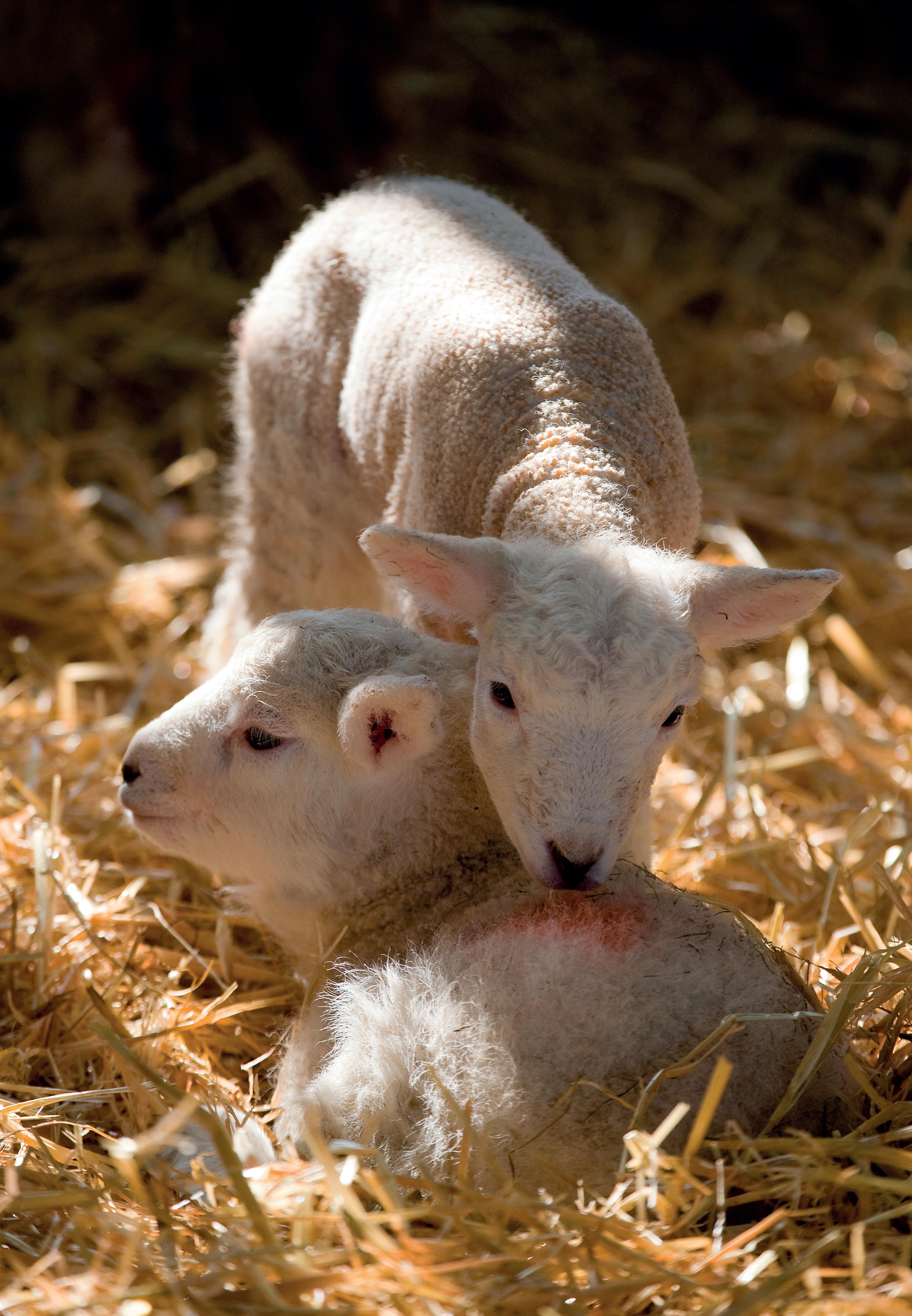















































































• Farm business & estate management • Planning & development • Subsidies & grants • Land sales & acquisitions • Viticulture • Succession • Biodiversity net gain • Ecology • Natural capital • Residential and commercial property letting and management 01892 770339 www.c-l-m.co.uk Farm business consultants with our roots in the South East February 2023 Est 1982 SPRING IS ON THE WAY NIGEL AKEHURST Nigel finds out about the abattoir, butchery and farming business at Downland Traditional Meats REPORT Oxford Real Farming Conference ON VISITORS SET TO FLOCK TO HADLOW COLLEGE FOR LAMBING WEEKEND 1 MARCH 2023


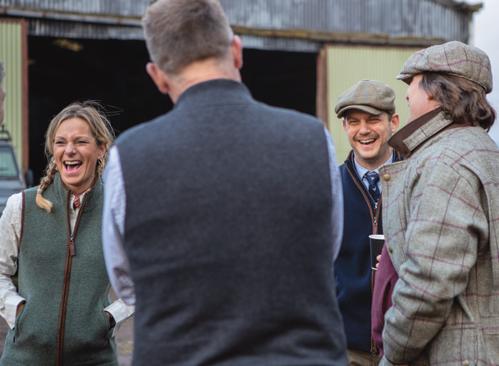

































FEATURING OVER 150 TRADE STANDS • Latest innovations in machinery • Case IH marquee • *NEW* Horizon Drills • Working demonstrations • New Holland marquee • *NEW* FarmDroid • Vintage tractors • *NEW* Viticulture machinery area • Groundcare zone • Clearance bargains • EXPANDED Construction zone • Parts and showroom offers • NRoSO and BIGGA CPD points • Country clothing store www.doeshow.ernestdoe.com #doeshow2023 AN ALL NEW LAYOUT STILL, BY FAR THE LARGEST AGRICULTURAL, CONSTRUCTION AND GROUNDCARE DEALER SHOW IN THE UK FREE PARKINGREFRESHMENTS, ANDENTRY Ulting, Maldon Essex CM9 6QH Tel 01245 380311
www.southeastfarmer.net
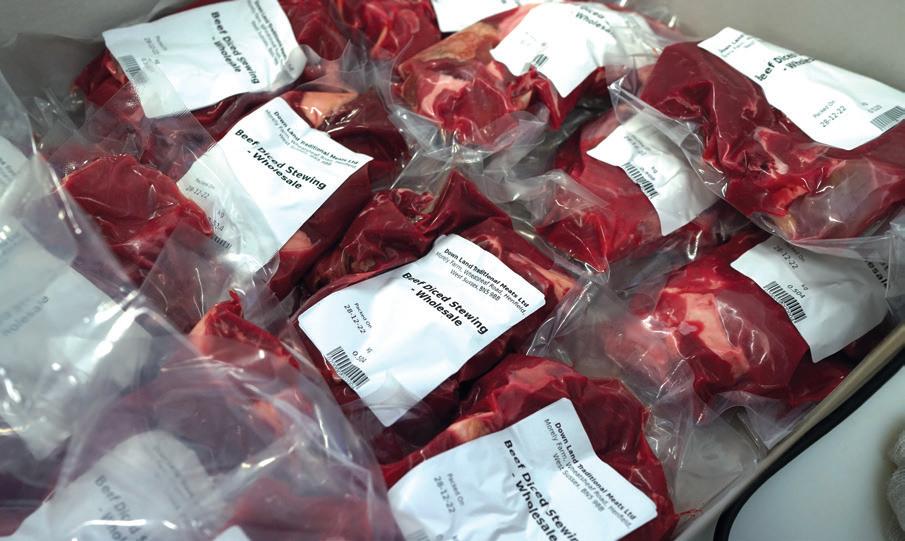
SOUTH EAST FARMER
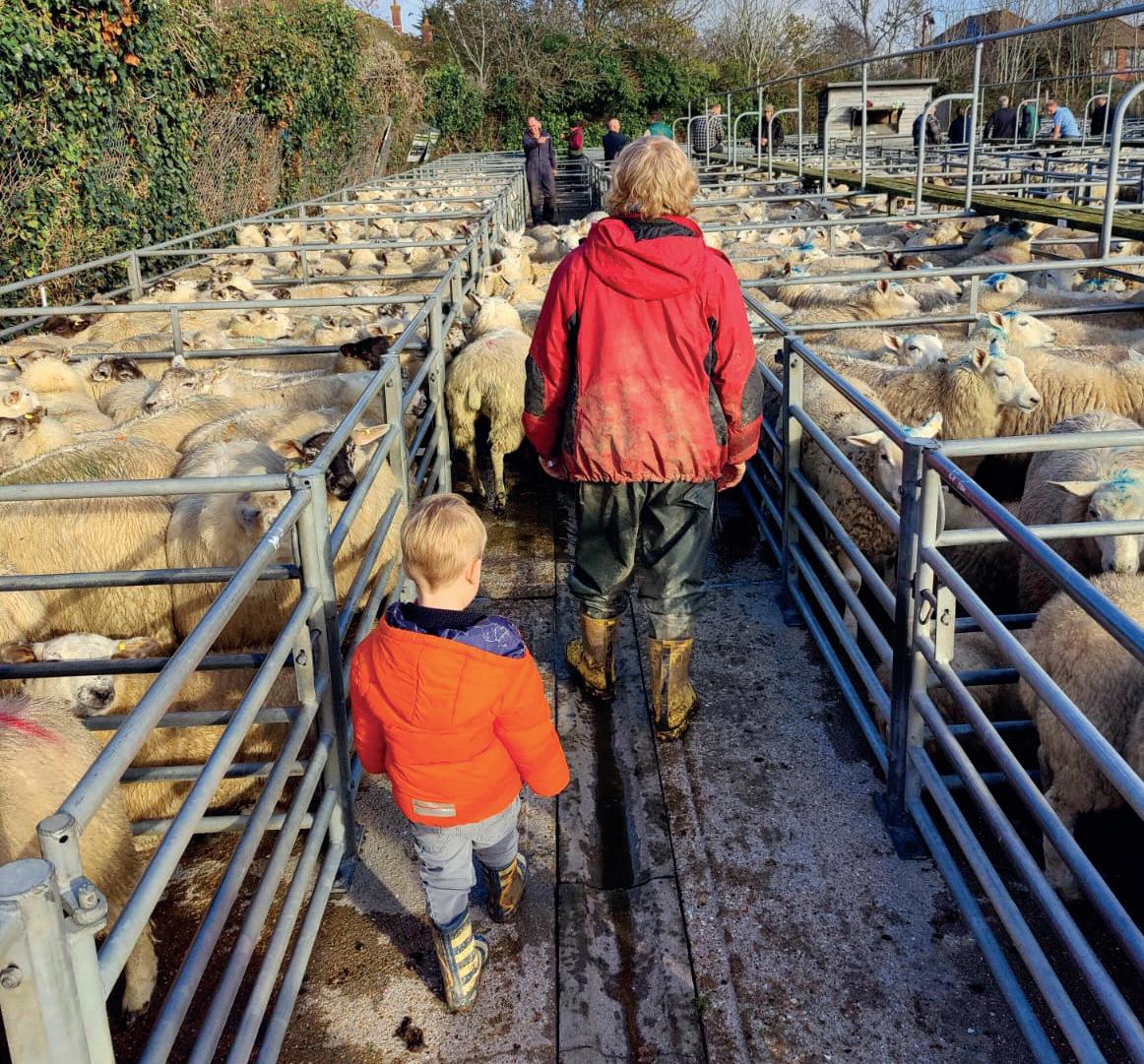
Kelsey Media, The Granary, Downs Court
Yalding Hill, Yalding, Maidstone, Kent, ME18 6AL 01959 541444

EDITORIAL
Editor: Malcolm Triggs
Email: sef.ed@kelsey.co.uk
Photography: Martin Apps, Countrywide Photographic
ADVERTISING & MARKETING
Jamie McGrorty 01303 233883 jamie.mcgrorty@kelsey.co.uk
GRAPHIC DESIGN
Jo Legg 07306 482166 jo.legg@flair-design.co.uk
MANAGEMENT
DIVISIONAL MANAGING DIRECTOR: Steve Kendall
PUBLISHER: Jamie McGrorty
RETAIL DIRECTOR: Steve Brown

SUBSCRIPTION MARKETING MANAGER: Claire Aspinall
PRINT PRODUCTION MANAGER: Kelly Orriss
DISTRIBUTION
Distribution in Great Britain: Seymour Distribution Limited


2 East Poultry Avenue, London
EC1A 9PT
Tel: 020 7429 4000 www.seymour.co.uk

Distribution in Northern Ireland and the Republic of Ireland:
Newspread
Tel: +353 23 886 3850
Kelsey Media 2023 © all rights reserved. Kelsey Media is a trading name of Kelsey Publishing Ltd. Reproduction in whole or in part is forbidden except with permission in writing from the publishers. Note to contributors: articles submitted for consideration by the editor must be the original work of the author and not previously published. Where photographs are included, which are not the property of the contributor, permission to reproduce them must have been obtained from the owner of the copyright. The editor cannot guarantee a personal response to all letters and emails received. The views expressed in the magazine are not necessarily those of the Editor or the Publisher. Kelsey Publishing Ltd accepts no liability for products and services offered by third parties.
Kelsey Media takes your personal data very seriously. For more information of our privacy policy, please visit Kelsey Media takes your personal data very seriously. For more information of our privacy policy, please visit https://www.kelsey.co.uk/privacy-policy/ . If at any point you have any queries regarding Kelsey’s data policy you can email our Data Protection Officer at dpo@kelsey.co.uk.
www.kelsey.co.uk
Cover picture: ©shutterstock.com

FEATURES
20 HADLOW COLLEGE
Jobs-focused approach leads to rewarding careers.
28 FARM EXPO PREVIEW
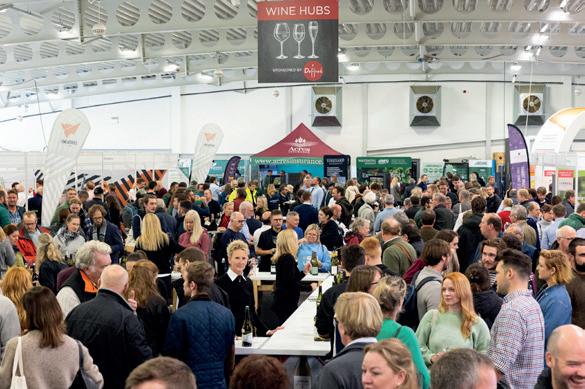
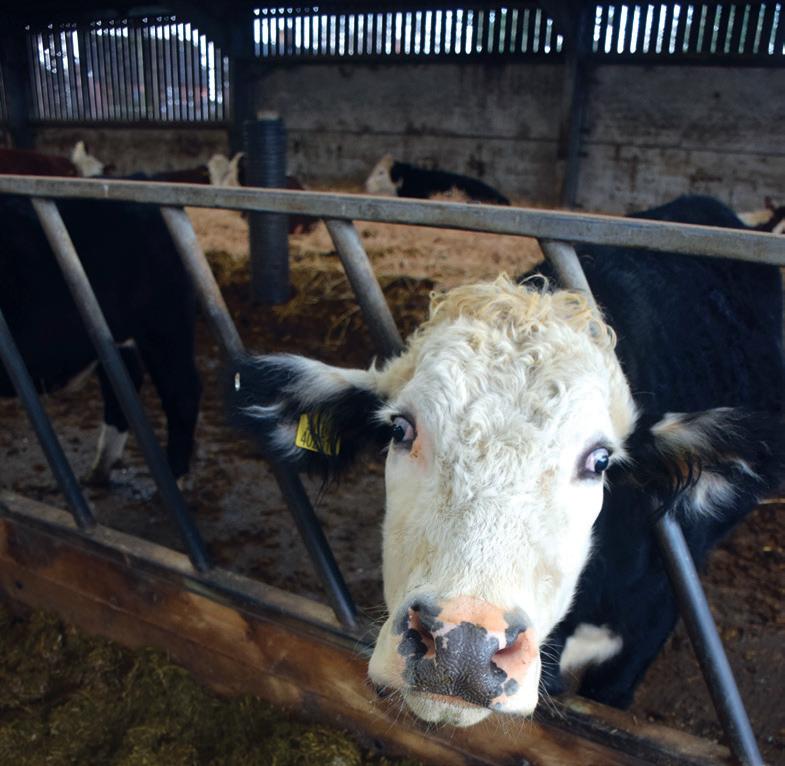
Back for a fourth year – and more important than ever.

42 PRESSURE CLEAN
Looking closely at budgets.
NEWS & REPORTS 04 “The worst” livestock attack ever seen 05 ELMS announcement previewed at busy conference. 12 Nigel Akehurst reports from the Oxford Real Farming Conference. REGULARS 17 SARAH CALCUTT 18 MONICA AKEHURST “Those sheep are mine” 24 NIGEL AKEHURST VISITS... Nigel visits Downland Traditional Meats to find out more about an abattoir, butchery and farming business. 45 STEPHEN CARR 46 ANITA HEAD 48 ALAN WEST 50 ADVICE FROM THE VET To prevent lambing problems, we need to get more in touch with our ewes. 51 NICK ADAMES 56 LEGAL 58 LAND AND FARMS FEBRUARY 2023 CONTENTS 20 28
® 24
In association with 22nd November 2023
Event Centre, Detling, Maidstone, Kent ME14 3JF SAVE THE DATE Sponsored by Vitifruit Equipment Sales and Hire 2023
18
Kent
“THE WORST” LIVESTOCK ATTACK EVER SEEN
Kent Police have again stressed that dogs worrying sheep are in danger of being shot, after investigating what has been described as “the worst” livestock attack ever seen.
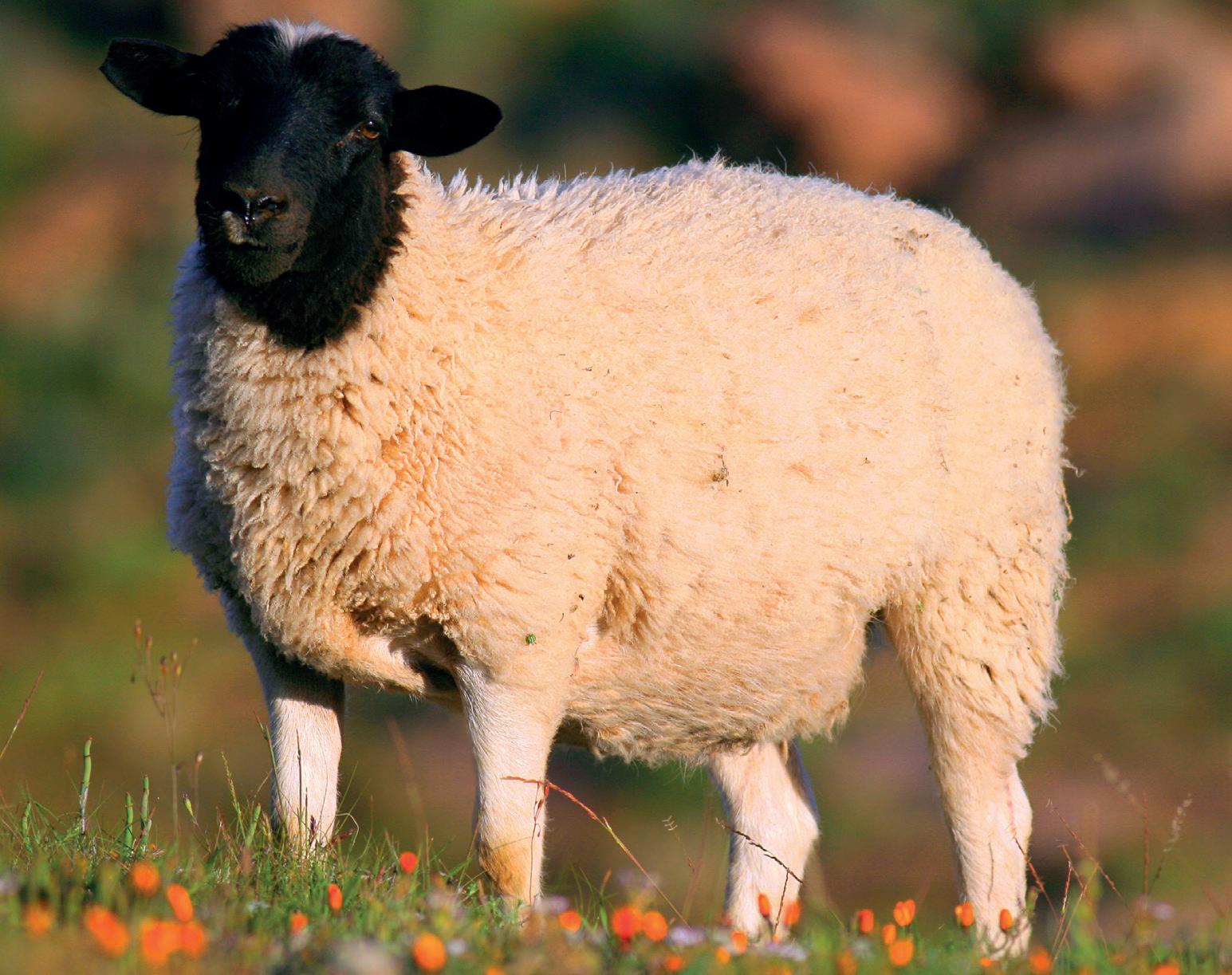
A month or so on from the Christmas attack that saw 31 sheep killed in a field near Teynham, Sittingbourne, the Rural Task Force has exhausted all lines of enquiry and confirmed that it is unable to bring a prosecution.
“We have spoken to one dog owner but there is insufficient evidence to suggest that their dog was involved and there were no witnesses to the attack,” said the force’s Sergeant Darren Walshaw. “We have now filed the case pending any new information coming forward.”
Sgt Walshaw stressed that the force would go to any lengths to bring dog owners to book, including taking DNA samples from injured animals and comparing it to suspect dogs. In this case, he told South East Farmer, the weather and the time that had elapsed between the attack and the discovery meant this had not been possible.
While the police have effectively closed their investigation, the owner of the sheep, Duncan Anderson, has said there is still the possibility of a civil prosecution being brought by his insurance company.
Sgt Walshaw, meanwhile, reminded dog owners that legislation allows a livestock owner to shoot a dog in order to protect their animals. “And that’s sad all round,” he pointed out. “You are left with injured livestock and a dead pet, and it’s all down to an irresponsible owner.”
The attack happened between Christmas Eve and lunchtime on Boxing Day, when Duncan, who also runs butchers SW Doughty in Doddington, discovered the gory evidence of the ferocious attack on the pregnant ewes.
PC Marc Pennicott, of the Rural Task Force, said at the time: "This is a distressing
incident which is possibly the worst livestock attack we have ever had. The sheep would have been petrified and had no way of escaping.
"We believe they may have been attacked by one dog but cannot rule out that more dogs may have also been responsible. The farmer has not only suffered a financial loss due to this incident, but animals have needlessly lost their lives.”
Duncan said there had been one sheep in the centre of the field with its throat torn. Most of the dead animals were in the corner of the field and had been trampled. Three more were later found in the river and another in the field, while two more had to be put down by a vet more than a day later, despite Duncan’s attempts to treat them with antibiotics and painkillers.
In total he lost 31 animals, but with all of the ewes carrying multiple lambs, he estimates at least 75 more losses, plus future
generations. The sheep cannot be replaced locally as they are from a unique, closed flock of wool-shedding Dorpers.
"Many of them would’ve come back into the flock as breeding females so it will take time to build the numbers back up," he said. “I’ve lost about 5% of the flock.”
Duncan believes the dogs were there for two to three hours in a sustained attack, only going home when they “got fed up", and he doesn’t believe that dog walkers are generally to blame for attacks on livestock.
“Most people with dogs are responsible and walkers around here are local,” he told South East Farmer. “They are horrified if one of their animals gets off the lead and worries a sheep, they put things right and they make sure it never happens again.
“In my experience the problems are generally caused by dogs not being looked after properly, getting bored and escaping. It’s rarely people exercising their pets.”
FEBRUARY 2023 | WWW.SOUTHEASTFARMER.NET 4 NEWS
Photo: A Dorper sheep ©shutterstock.com
ELMS ANNOUNCEMENT PREVIEWED AT BUSY CONFERENCE
A cautious welcome to the upcoming announcement regarding the Government’s flagship Environmental Land Management scheme dominated the opening of this year’s Kent Farming Conference organised by the Kent County Agricultural Society.
Jake Fiennes, general manager of the Holkham Estate in Norfolk and a passionate supporter of environmental schemes, was the opening speaker at the well-attended conference on The Future of Farming. But before outlining some of the remarkable work done at the Holkham Nature Reserve to support and improve biodiversity alongside historic agricultural practices, he hinted at the announcement on ELMS due to be made by DEFRA Secretary of State Thérèse Coffey the following day.
EMBARGOED ANNOUNCEMENT




While giving no details of the embargoed announcement, he conveyed his optimism about the likelihood of increased payment rates and incentives to persuade more farmers to support environmental initiatives while growing food to feed the nation.
The following day’s announcement, made just hours before South East Farmer went to press, said the Government was speeding up the Sustainable Farming Incentive (SFI) rollout by “adding six new sets of paid actions to support food production and environmentally responsible farming”.

It said an enhanced ‘Countryside Stewardship Plus’ scheme would be rolled out over the next two years to reward farmers for supporting “climate and nature aims” and promised “greater flexibility” over when farmers could apply and how agreements would be managed.
DEFRA said the SFI would give farmers “a diverse range of paid actions to manage hedgerows for wildlife, plant nectar-rich wildflowers and manage crop pests without the use of insecticides."
INSPIRING WORK
After hearing from Jake about the inspiring work at Holkham, which he said was “an example of what is possible”, NIAB’s Professor Mario Caccamo took to the stage at the Kent Event Centre to outline the scientific work the organisation is doing to help farmers feed the world’s growing population.
He was followed by Abigail Brightwell and Lee May from law firm and conference sponsors Brachers on legal considerations farmers should be considering in 2023 and by David Wolfe, who gave a fascinating talk on agroforestry – something he predicted would also be supported in the following day’s ELMS announcement – at Wakelyns in Suffolk. Rowan Duckworth, from the Small Robot Company, and Nick Evans, co-founder of agriculture-dedicated Oxbury Bank, rounded off a successful conference.
There will be a full round up of the ELMS announcement in the March edition of South East Farmer.
Remain strong and brave throughout 2023
China has been in the news recently, having been overtaken by India in population terms. Apparently its 1.4bn people makes it the world’s second most populous country, India having taken the number one spot earlier this year.
It may only be a short stay at the top for India, though, as the Chinese – or Lunar – New Year has just ushered in the Year of the Rabbit, and the reputation of rabbits for increasing populations is no secret.
Apparently, the rabbit is seen as the luckiest animal in the sequence of 12 celebrated in the Lunar New Year tradition. According to Dr Hongling Liang, a lecturer in Mandarin quoted on the BBC Bitesize website, it means we can expect the year to be “calm and gentle, bringing an energy that will help those looking for more of a balanced life”.
That would certainly be welcomed by the South East’s farmers, who have been faced with a far from balanced life of late. Most would probably align themselves more closely with last year’s animal, the tiger, seen as a symbol of strength and bravery, amongst other things.

While farmers would probably enjoy a calm and gentle year, they will no doubt have to remain strong and brave throughout 2023, with the likes of rising input costs, uncertainty over the replacement for rapidly declining basic payments and ever-shifting government policy to deal with.
But, being farmers, they will continue to innovate, create new opportunities and deliver food to the tables of UK consumers, helped by bright new entrants to the industry who can see the opportunities that still abound in this vital sector of the economy.
Back to China, and Confucius, we are told, said: “If your plan is for one year, plant rice. If your plan is for ten years, plant trees. If your plan is for 100 years, educate children.”
As this issue of South East Farmer demonstrates, Hadlow College – and others in this region and further afield – are doing just that, and in so doing are continuing to breathe new life into farming. Here’s to the Year of the Rabbit.
EMAIL YOUR VIEWS, LETTERS OR OPINIONS TO: sef.ed@kelsey.co.uk or write to the address on page 3
®
5 TO ADVERTISE CALL 01303 233883
OPINION
BIG FARMLAND BIRD COUNT
Land managers are being encouraged to highlight the good work done on farms across the South East by taking part in this year’s annual Big Farmland Bird Count.

The annual count, organised by the Game & Wildlife Conservation Trust (GWCT) and sponsored by the NFU, takes place from 3 to 19 February.
On the eve of the tenth anniversary count, Founder Jim Egan sounded a rallying call, telling land managers: “Understand that what you do makes a difference and gives the Game & Wildlife Conservation Trust a superb opportunity to shout about all the good work done on farms.”
The GWCT’s Dr Roger Draycott, who now runs the count, added: “In the ten years since the GWCT Big Farmland Bird Count began, the commitment shown by an ever-growing number of farmers and land managers to supporting and monitoring birds and other wildlife is inspiring and should be celebrated.”

Those taking part are being asked to take 30 minutes to count the birds they see on their land and submit their results to the GWCT. The aim is to measure the impact of the conservation work that so many of them carry out and enable the GWCT to build a picture of the status of the UK’s farmland bird species.
NFU President Minette Batters encouraged farmers to get involved, commenting: “Not only are farmers across the country producing sustainable, climatefriendly food, they are also maintaining and protecting the great British countryside, creating habitats for biodiversity to flourish and additional feeding for farmland birds.”
www.bfbc.org.uk


FEBRUARY 2023 | WWW.SOUTHEASTFARMER.NET 6 NEWS
Song Thrush
Big Farmland Bird Count founder Jim Egan
Photo: Andy Morffew
One of the world’s leading agricultural equipment manufacturers, Claas, saw an increase in sales in 2022 and is forecasting continued strong growth in 2023.
The company, perhaps best known for its high-end combine harvesters, saw sales rise by 2.7% to a new high of €4.9 billion, slightly up on 2021’s €4.8 billion, although earnings before taxes showed a drop to €166.3 million from the previous year’s €357.1 million as a result of “impairments in Eastern Europe as a result of geopolitical changes and disrupted
THE CLAAS OF 2022
supply chains”.
The German-based company said the market for agricultural engineering products in 2022 “benefited from continued strong demand and developed largely positively despite significant supply-side disruptions and the war-related slowdown in Eastern Europe. CLAAS achieved particularly dynamic sales growth in North America. In Europe,
the markets were robust with slight declines compared to the very positive development in 2021.”
Research and development spending at the Claas Group, which employs more than 12,000 people, rose by 6.4% to €279 million as the company looked forward to 2023, in which it “anticipates double-digit sales and income growth despite the present uncertainties."
YOUNG FARMERS RAISE £1,800
An impressive 75 tractors of all kinds took part in the second New Year’s Charity Tractor Run organised by Forest Row Young Farmers to raise money for the Kent, Surrey and Sussex Air Ambulance.
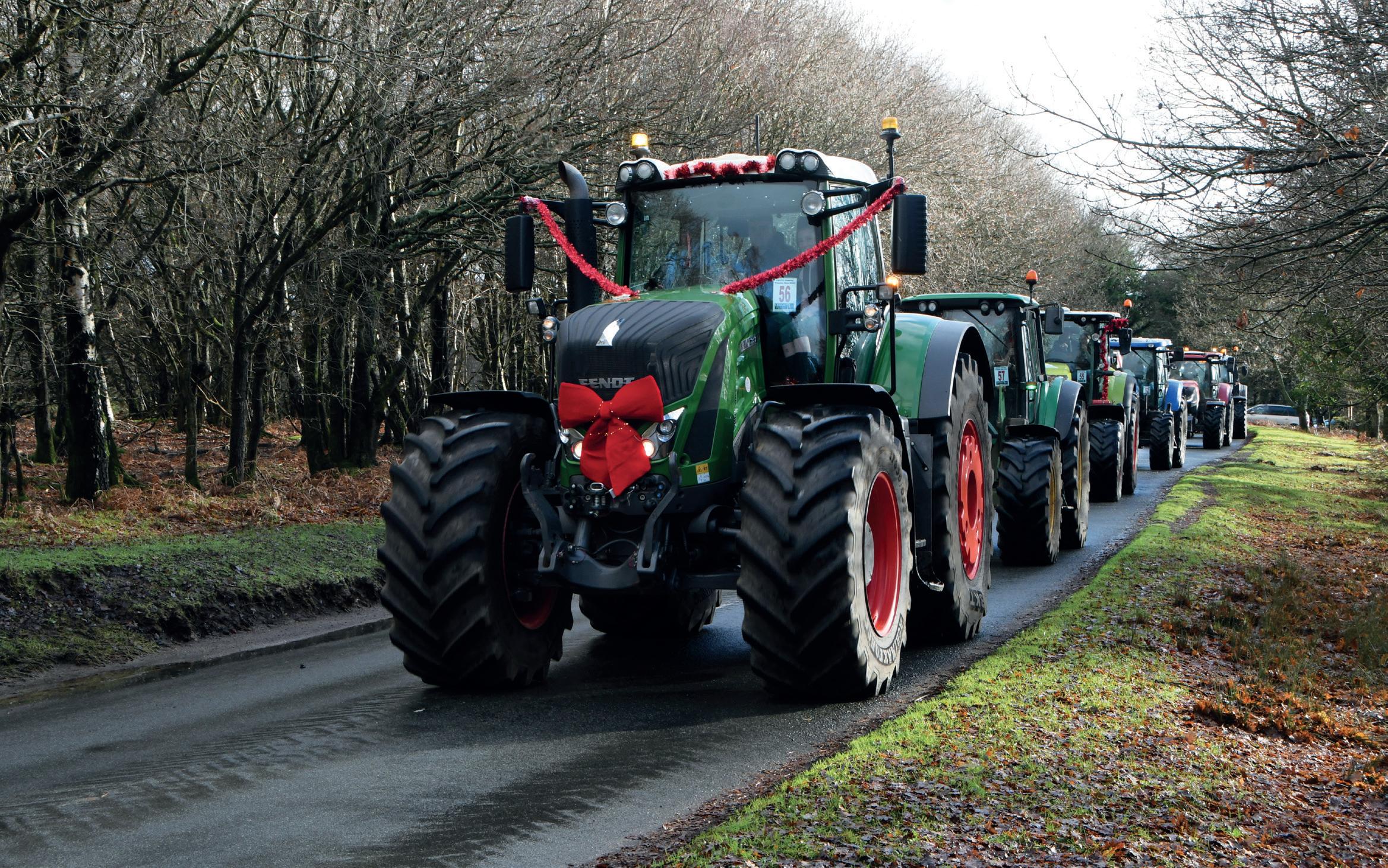
The event on 2 January 2023 saw a variety of festively decorated machinery travel from Crowborough to the Ashdown Forest, where members of the public were able to see the vehicles, and then through Nutley and Duddleswell and back to Crowborough.
More than 100 members of the public were at Box Car Park on Crowborough Road to see the spectacle and support the run, which raised more than £1,800 for the club and the air ambulance charity.
Forest Row YFC secretary Brooke Kelly said the club was grateful for their support and for the patience shown by the other road users. “It was amazing to see the local community come together and show such enthusiasm towards the local farmers and give us the opportunity to raise awareness and explain to the public a bit more about how important farming is,” she said.
“I’m extremely proud to be a Young Farmer today,” she went on. “Forest Row Young Farmers worked so hard to pull off this incredible fundraiser. The Kent, Surrey and Sussex Air Ambulance is such a deserving charity which has helped some of our own farming community in the past.”
WWW.SOUTHEASTFARMER.NET | FEBRUARY 2023 7 TO ADVERTISE CALL 01303 233883 NEWS
FREE TREE FRUIT RESEARCH WEBINAR
A free-to-attend technical webinar run by crop research organisation NIAB will outline the latest research and advice for UK and overseas tree fruit growers and farmers, trade organisations and scientists.
The online Tree Fruit Day event is taking place on 21 February 2023 and will be opened by East Malling, Kent-based Dr Charles Whitfield, who will discuss the development of a precision dosing orchard sprayer and the use of fluorometer technology to assess spray application.

Richard Colgan, from the University of Greenwich, will outine his research detecting and predicting internal browning in apples, while Mark Else will update delegates on NIAB’s plum demonstration centre. Robert Saville will then talk about how Growing Kent & Medway is supporting sustainable innovation in horticulture.
Three afternoon sessions offer new findings on pest and pathogen ecology, led by NIAB in collaboration with universities and industry. This includes canker and replant research in
apple and bacterial canker in cherry, followed by pest research on forest bug, apple sawfly and brown marmorated stink bug.
The event will also highlight work by PhD students on pear sucker, the impact of wildflowers on pest control and of solitary ground-nesting bees in apple orchards. The final session will provide an update on the development of new management techniques for spotted wing drosophila in plum and cherry trees.
NIAB knowledge exchange manager Scott Raffle said: “With the winding down of AHDB horticultural activities last year, NIAB has welcomed the opportunity to ensure this annual industry event remains on the calendar.
“Presenting it on a virtual platform has proved popular over the past few years, with a larger audience drawn from across the UK and abroad.” He said it was an opportunity for everyone with an interest in tree fruit production to keep abreast of new findings in a range of research and demonstration projects managed by NIAB at East Malling and elsewhere.
www.niab.com/webinar-niab-tree-fruit-day-21-feb-23
TELECOMS SPECIALIST JOINS TEAM
Telecoms specialist Mark East MRICS joined Batcheller Monkhouse as a consultant at the start of the year.
One of the most respected agents in the telecoms Industry, Mark founded TPCL some 18 years ago alongside another well-known name in the telecoms world, the late Derek Blatt.
He has since grown the business to become one of the most respected agents in the telecoms industry, offering professional advice to a wide range of property owners.
Tom Bodley Scott, Head of Telecoms at Batcheller Monkhouse, said he was pleased Mark had chosen to move to Batcheller Monkhouse as a means of providing additional support to his clients.
He commented: “I have known and respected Mark for many years and I am delighted that he will be joining us as a consultant to help with the transition of TPCL jobs and clients to Batcheller Monkhouse over the next three years.
“With many similarities between those clients that we service at Batcheller Monkhouse and those Mark has been working for, I am confident and excited that our expanding telecoms team at Batcheller Monkhouse will be able to replicate the high level of service provided by Mark.”
Tom can be contacted at t.bodley.scott@batchellermonkhouse.com or on 07711 316987.
FEBRUARY 2023 | WWW.SOUTHEASTFARMER.NET 8
NEWS
NEW ADVISER
Berks, Bucks and Oxon NFU has a new county adviser who will be representing members’ interests across the three counties.
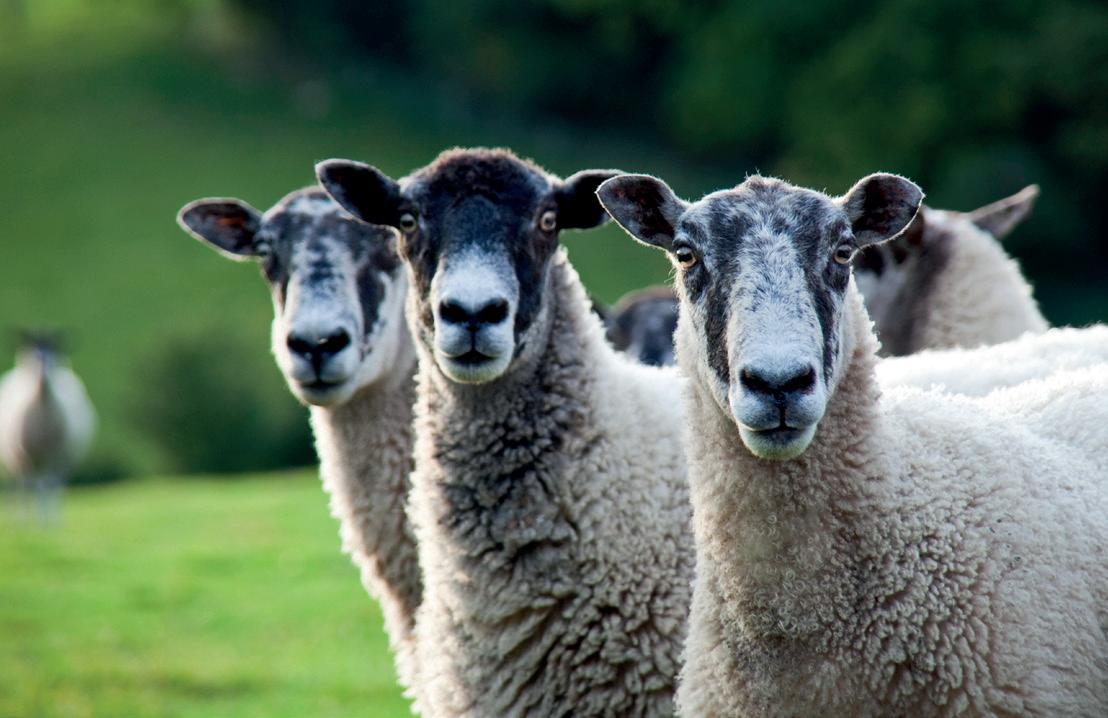
Ben Gibbons has been working in the region as an adviser with a strong focus on political lobbying for the NFU and will already be known to many.

Mr Gibbons, who is the son of a Hampshire farmer, started in his new role in December following the departure of Georgia Craig. He is looking forward to engaging with greater numbers of farmer and grower members, helping to make a difference on key policy issues for the NFU.
He said: “I have already liaised with a councillor in the Vale of the White Horse, in Oxfordshire, who had sought our help with his new agriculture brief, and we expect to be helping on a number of matters. There are also some large infrastructure projects planned for the area and we shall be assisting members affected by these.
“Moreover, we have teamed up with Royal Berkshire Fire and Rescue Service to improve our collaborative ways of working in the future, and are already represented on its working group to combat wildfire across the Thames Valley.

“For the new year, we have a packed programme of local authority liaison and MP lobbying in the diary. With our officeholders, I hope to capitalise on existing relationships and forge new ones with decisionmakers and politicians across the three counties.”




WWW.SOUTHEASTFARMER.NET | FEBRUARY 2023 9 TO ADVERTISE CALL 01303 233883
Gibbons
westpoint farm vets Supporting British Livestock Agriculture Since 2000 New client visits are FREE - book yours today! Westpoint Farm Vets Dawes Farm, Bognor Road, Warnham, West Sussex, RH12 3SH info@westpointfarmvets co.uk | westpointfarmvets co.uk Our
efficiency
South East Westpoint Ashford covering Kent & East Sussex 01306 628208 Westpoint Winchester covering Hampshire 01962 779593 Westpoint Chelmsford covering Essex 01306 628489 Westpoint Horsham covering Surrey, Sussex and Kent 01306 628086 LANDRAIS E Do you need... › A new building?
To build a noise bund?
To create a hardstanding to store silage or straw?
To build up an area to prevent flooding
To fill in an old lagoon?
may be able to help We can subsidise your costs by building up areas with subsoils classed as non-hazardous inert waste. We can gain all planning permissions needed so give us an opportunity to reduce some or all of your costs on your next project or improvement. East Sussex area preferred. RAISE THE LEVEL OF YOUR LAND Robins of Herstmonceux (Est 1962) 01323 833181 Email: helen@robinsofherstmonceux.co.uk
Ben
100% Farm Vets
teams of experienced, highly-qualified vets are focused on driving farm
and animal health across the
›
›
›
›
We
MORE CHALLENGES
Dear sir,
With the summer months topping 40°C and field fires breaking out with alarming regularity, the heat was certainly on for farming and rural businesses in 2022.
But it was not the only place where the temperature was rising this year. At our rural business conference recently, Country Land and Business Association (CLA) president Mark Tufnell laid bare how rural communities are running out of patience with the Government. Uncertainty over the future of Environmental Land Management schemes (ELMS) is eroding confidence within the industry.
With environment secretary Dr Thérèse Coffey in attendance, Mark said that the delays to the rollout of ELMS were unacceptable, and compared the lack of clarity on payment rates to “buying something from the shop without knowing the price”. Early 2023 must provide some answers and we will continue to hold the government’s feet to the fire on this issue.
But 2022 has not been all doom and gloom. The return of many of our wonderful agricultural and farming shows has been welcome, and we particularly enjoyed promoting the Countryside Code to more than 100 families through games and activities at the South of England Show in June. Importantly, they provided us all with an opportunity to reconnect with friends and colleagues after such a challenging time.
At the CLA, we used these events to meet with many MPs from our region to bang the drum on the matters of most importance to our members. At every opportunity we pressed home the importance of a profitable and sustainable farming industry. We raised issues with the planning system that are holding rural business back, called for a simpler tax regime and urged investment in skills and innovation.
Our work on tackling rural crime continued, with some notable developments. Tougher sentencing and improved powers for the courts to tackle hare coursing were added to the Police, Crime, Sentencing and Courts Act 2022. This means there are now greater tools that authorities can use to tackle the issue, which will hopefully help protect farmers and rural communities who are victims of this crime. The new powers do, of course, require offenders to
be caught, which is why the CLA is frequently in contact with police forces to ensure the rural voice is heard on all aspects of crime.
With the recent snowfall providing an Arctic blast for our region to end the year, the heat really does need to be on. And it comes at an extortionate price. From rising energy prices, higher input and raw material costs through to labour shortages, among other things, rural businesses are being squeezed.
There will undoubtedly be more challenges to overcome in 2023 with increasing concerns of a potential recession. The CLA’s role in championing the rural economy and supporting rural businesses has never been so important.
Tim Bamford, Regional Director, CLA South East
IRONIC
Dear sir,
It feels ironic that the increase in Sustainable Farming Incentive (SFI) payments was announced on the same day the Met Office reported on the UK’s record-breaking annual average temperature of more than 10°C in 2022.
This alarming data seems only to highlight the lack of any coherent policy to address the challenges we face; showing once again that our country’s policymakers seem intent on delivering too little, too late.
Surely the hottest year on record is a concrete indicator that the Government must enact wider, more progressive and forward-thinking policies around agriculture and food production in order to arrest climate change and address the decimation of our natural wildlife?
Where are the ‘world-leading’, game-changing strategies the Government so often heralds when addressing the fundamental challenges in mitigating the climate crisis and securing a long term, resilient farming sector?
Not so far away, our previous European partners are implementing their ambitious farm to fork policy and have only recently finalised the new Carbon Border Adjustment Mechanism. We are sadly missing the equivalent bold, innovative policies from our own ‘liberated’ government.
Instead, today’s announcement from DEFRA, while welcome, appears on the face of it a kneejerk reaction to pacify the sector’s concerns around the new farm payment systems. Even within this now watered-down policy, huge disparities
remain for organic farmers in payment rates for equivalent management practices undertaken by non-organic farms. Further evidence of Nero fiddling while Rome burns.
If DEFRA was genuinely interested in addressing the multiple environmental and economic challenges that our farming industry faces then why are they not actively supporting the development of low-input, closed-loop, highyielding, resilient and restorative approaches like organic?
A recent French Court of Auditors report identified “the benefits of organic farming, particularly in terms of health and the environment, and observes that the development of organic farming is the best way to make the agri-environmental transition successful and lead so-called conventional farms towards more environmentally friendly practices”.
While not every farmer may want to shift to organic, it is a growing worldwide movement with globally expanding markets which provides the UK with significant benefits both environmentally and economically.
Roger Kerr, CEO, Organic Farmers & Growers
A HEARTFELT THANK YOU
Dear sir,
I’d like to reach out on behalf of RABI to say a heartfelt thank you to the farming community who supported our Christmas Appeal. Thanks to their generosity, we raised nearly £40,000. These donations brought a little festive cheer in a somewhat bleak midwinter. Gifts from the appeal helped farming people with a range of needs – heating costs, food vouchers for families in crisis and supporting individuals with professional mental health counselling, to name just some of the ways we were able to offer support.
One person said, “What you [RABI] have done has made sure that my children will have a happy Christmas. Your support has bought me some time to sort out our issues on the farm and set up a good future.”
So, while for many Christmas was a time to reflect, relax and rest, RABI is acutely aware of how the year-round challenges facing our farming community can take their toll during the festive season and knows that many farming people had to cut back severely last year.
FEBRUARY 2023 | WWW.SOUTHEASTFARMER.NET 10 LETTERS SEND YOUR VIEWS OR COMMENTS: SEF.ED@KELSEY.CO.UK twitter @SOUTHEASTFARMER facebook-square SOUTH EAST FARMER
RABI is here for you and our 24/7 helpline is always available on 0800 188 4444.
Paul Pirie, Head of Fundraising, RABI
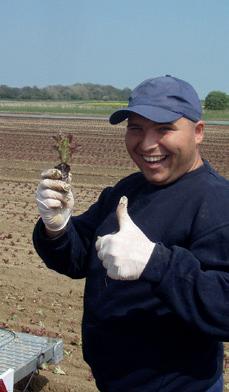

A NEW YEAR MESSAGE

Dear sir,
Nobody could have predicted what we’ve witnessed in the past 12 months, from the war in Ukraine, which has created global turmoil and significantly disrupted food and energy supply chains, to our own political upheavals. On top of that we’ve had soaring input costs and the effects of climate change as demonstrated by this year’s drought; the challenges have been unprecedented.
Clearly, events over the past year have made the job of producing food so much harder. The importance of British farming in delivering food and energy has never been clearer.
At the NFU, we never take for granted the huge public support farming receives. It is clear the nation continues to value our top quality food, produced to world-leading standards of animal welfare and environmental protection, as well as our ability to produce renewable energy
and contribute to the nation’s energy security. While it has been a challenging year, there have been a number of successes as a result of our campaigning over the past 12 months. We have seen an increase in the number of seasonal worker visas, which will be a relief to farmers and growers employing the skilled workforce needed to produce fruit, vegetables and ornamentals this year.
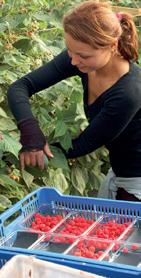
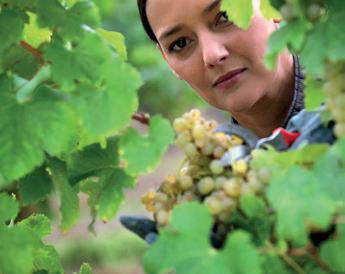
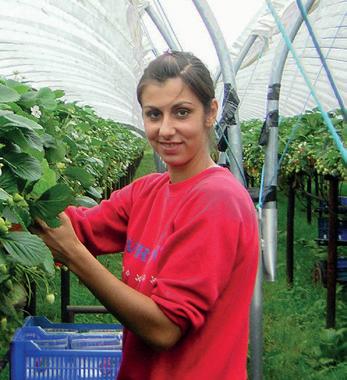
We have secured funding from government to level up rural communities through the Rural England Prosperity Fund, in addition to successfully recruiting eight new agri-food attachés overseas who will help to drive exports of British food.
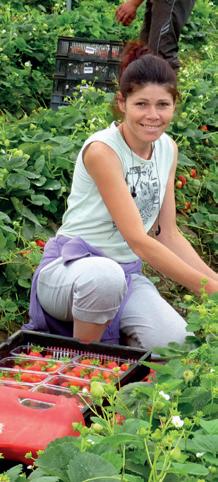
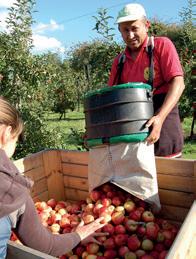
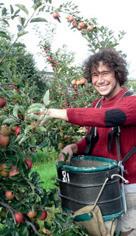
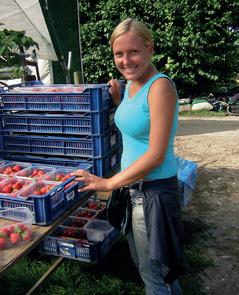
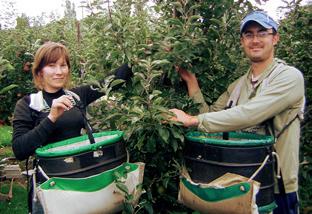
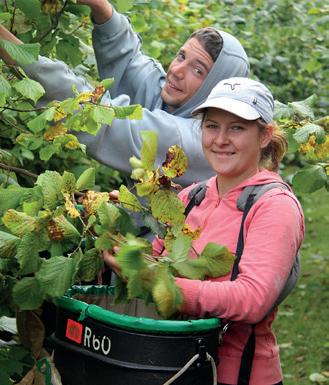
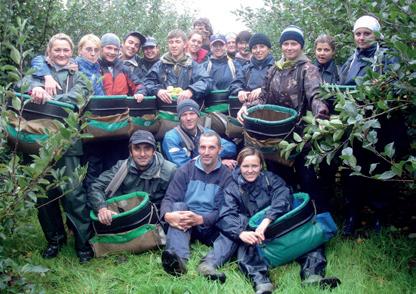



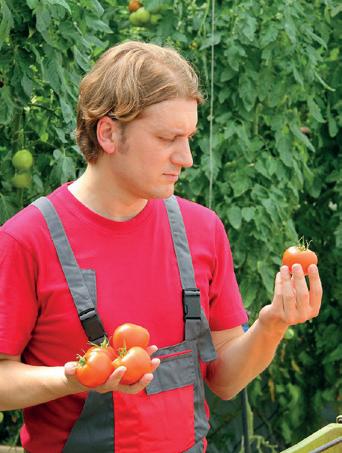
Looking to the year ahead, we have the opportunity to build on these successes and deliver more for the country. We have the ambition and drive to produce more renewable energy, enhance our environment, care for our countryside and work towards our commitment to reach net zero by 2040, all while producing sustainable food.
It is vital that the Government delivers the policies and investment needed to unlock a thriving food and farming sector able to deliver a
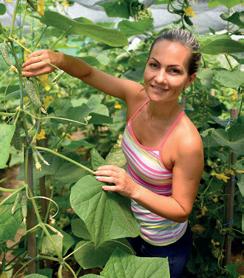
secure supply of food and energy for the nation.

NFU President Minette Batters met with the Prime Minister before Christmas and again emphasised the importance of food security and home-grown food production. It was heartening to hear that he continues to take this issue very seriously.
We now want the Prime Minister to honour a pledge made in the summer and set a target for the nation’s food security, with a statutory duty to report on domestic food levels. And we shall need clarity on policies like the Environmental Land Management schemes in order to plan financial resilience into our businesses and continue to produce climate-friendly food alongside green energy.


We hope that 2023 will be the year that the Government gets serious about British food and farming and delivers the policies and support needed for us to thrive domestically and in markets around the world. The NFU will be focusing on these areas to build resilience and profitability back into British farming, no matter what the next year brings.
Alan Clifton-Holt, NFU South East regional board chair, Burmarsh, Kent
WWW.SOUTHEASTFARMER.NET | FEBRUARY 2023 11 TO ADVERTISE CALL 01303 233883
Better people Best placed SEASONAL LABOUR PLACEMENT agrecruitment.eu|01227 806 789 English Woodlands Tree Nursery are leading suppliers of healthy, high quality plants to landowners and farmers across the South. • Fast quotations • Expert advice • Excellent service and delivery • Full range of accessories Plant Healthy certification is awarded to organisations that can demonstrate that their plant health management systems and practices comply with the Plant Healthy Standard. The scheme makes it easy for customers to identify organisations that handle plant material in a manner that promotes plant health and biosecurity. English Woodlands is among the first organisations to receive this certification, following an independent audit in 2020 T. 01435 862992 sales@englishwoodlands.com www.englishwoodlands.com Hedging
Woodland
Plant health
and
Plants
and quality assured
GRASS ROOTS ANTIDOTE JUST THE TONIC
Nigel Akehurst reports from the Oxford Real Farming Conference.
The 14th Oxford Real Farming Conference (ORFC), held in Oxford from 4-6 January, hit new heights as the largest agro-ecological gathering in the world, boasting 1,800 in-person delegates and a further 2,500 online.

For anyone unfamiliar with ORFC, the event was born out of protest in 2010 as a grass roots antidote to the original ‘establishment’ Oxford Farming Conference (OFC) which has been taking place since 1936. It now boasts more participants than the OFC.
ORFC has grown substantially since its inception in a room of 50 people above a pub back in 2010, and the main hub now is Oxford Town Hall, where many of the larger sessions are run. Inspiring speakers such as Indian activist Vandana Shiva drew large crowds to the venue, which also saw more practical sessions on herbal leys.
Part of the beauty of ORFC is the diversity of topics, and the three-day event now includes a programme of more than 70 sessions (with over 100 speakers) and has expanded to other nearby buildings. The event is run by the Real Farming Trust but is supported by other organisations including the Sustainable Food Trust, the Land Workers' Alliance,
Pasture For Life (formerly the Pasture-Fed Livestock Association), the Nature Friendly Farming Network and the Soil Association to name a few. A common thread running through the conference this year was the obvious but rarely recognised connection between what we eat, how we farm and our health. With government unable or unwilling to take the bold decisions needed to help change our food system, many of the speakers called for us all (farmers, climate activists and eaters) to work together to change the system from the ground up.
I attended the event on 5 and 6 January, when most of the in-person sessions took place. At the opening plenary the Shumei Taiko ensemble (farmers from Japan, the US and the UK) opened the event with a powerful drumming session, before handing over to a few of the organisers who helped bring the event together. Standing in a hall full of young farmers and food activists, the event felt more like a festival than a conference.
As the plenary finished, everyone made their way to their first session of the day. I attended a fascinating workshop entitled Farming and community advice and support for our landscape, climate and nature recovery
FEBRUARY 2023 | WWW.SOUTHEASTFARMER.NET 12 OXFORD REAL FARMING CONFERENCE
facilitated by Teresa Meadows (BASIS) and Jenny Phelps (FWAG South West). They highlighted the vital role of facilitation groups and their officers to bring together different actors in the community (farmers, landowners, local people, water companies, ecologists, investors etc.) to deliver projects that enhance natural capital and help build climate resilience.
Another talk in the main hall titled Is there an insect apocalypse? with Dave Goulson (University of Sussex and author) argued the case for better policies to stem the tide of insect declines seen in the past decades and set out what we as farmers can do to stem further declines and help species like the dung beetle recover (in that case by using fewer wormers).
Later in the afternoon I attended a session on funding titled Funding regeneration: how unconventional financing models can support food and farming businesses, at which a panel of speakers spoke about their experience in raising funds through impact investment and why there isn’t sufficient private capital being invested in food and farming - and why this needs, and is beginning, to change.
One emerging solution is the arrival of more ‘patient capital’ from aligned investors who are not looking for a quick exit. Another option for community run organisations looking to transform the food system are loans for enlightened agriculture programme (LEAP) run by the Real Farming Trust. LEAP can provide up to £100,000 (part loan, part grant) to small enterprises with very low rates of interest and also offers mentorship.
I then managed to catch the last half an hour of an all-female panel session titled The power of food to heal minds, bodies, communities and our land chaired by GP Sally Bell. The panel highlighted the importance of real food to restore our physical and mental health (check out Tim Spector’s book Food for Life). Sadly, in our present climate, food often polarises, confuses and perpetuates chronic illness. Luckily there is much we can all do to work together to change this.
After some nutritious food, a few beers and a good night’s rest, I was back in the town hall for day two. Running a bit late, I didn’t make it into my first-choice session on DIY soil monitoring, but I did find a space in What price for saving nature, an illuminating session focusing on how nature is being financialised.
Speakers Ian Rappel (College for Real Farming and Food Culture) and Jutta Kill (biologist and journalist) highlighted the fact that mainstream environmentalism is turning towards nature commodification as the solution.




A carbon credits ‘gold rush’ is underway, with one farmer in the audience explaining how she had been backed into a corner by her landlord and forced to sign up to pay her rent. Several other farmers in the audience had noticed neighbouring land in Scotland and in Exmoor being bought up at hugely inflated rates by private equity companies looking to take advantage of carbon credits.
Another audience member pointed out the flawed concept of net zero, where large fossil fuel companies offset their carbon by buying



WWW.SOUTHEASTFARMER.NET | FEBRUARY 2023 13 TO ADVERTISE CALL 01303 233883
WWW.ORFC.ORG.UK >> Farm Waste Recycling Experts Providing waste solutions to Agriculture, Horticulture & Equestrian Collection & Recycling of... All types of Farm Plastics Workshop Wastes Veterinary Waste Waste Oil Waste Tyres Redundant Agri chemicals WasteTyresCardboard Tel 01264 736733 ian.kitson@kitsonrecycling.co.uk www.kitsonrecycling.co.uk No Membership fees
OXFORD REAL FARMING CONFERENCE


carbon credits. What he suggested we should be doing was moving towards a fossil fuel-free economy now by investing in renewables and producing agro-ecological food, not allowing energy companies to carbon offset and continue to pollute our environment by burning more fossil fuels.
In need of something a little different, I went to a session relating to cattle entitled Cattle as translators of the land with Marthe Kiley-Worthington (farmer, ethologist and ecologist). I learnt that an ethologist is someone who studies the behaviour of animals and was fascinated to hear the experience of Samar Khan, a philosopher and artist who spent a considerable amount of time observing cattle in a dairy in the Netherlands and more recently on a farm in Hertfordshire. His observations as a non-farmer were interesting, as were other stories from members of the audience, serving as a reminder of how important it is to get to know your livestock.
My last in-person session of the day was titled Crafting the narrative to transform our food and farming systems, with a panel of
expert speakers that included Poppy Okotcha (ex-model and ecological food grower), Joya Berrow (storyteller, film maker and photographer) and Ben Andrews (organic farmer from Herefordshire).
I found Ben Andrews’ (@bentheoandrews on Instagram) insights into his experience of storytelling and his use of social media (he has an Instagram following of over 70,000)
KENT'S FREE AGRICULTURAL AND MACHINERY SHOW

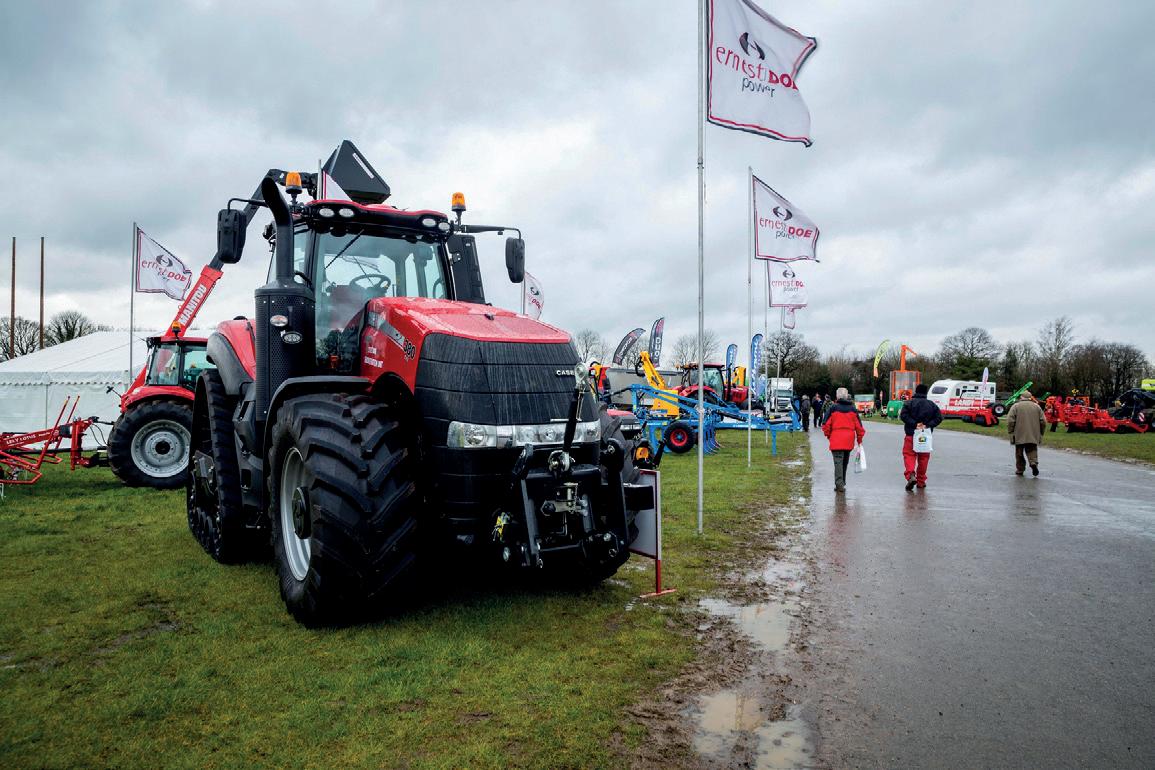

to connect with a wide audience inspiring, especially his role in celebrating LGBTQ+ people in farming.
Overall, I left ORFC feeling fired up and enthused for the farming year ahead. If you’ve enjoyed reading about the conference, some sessions will be available via YouTube (google ORFC YouTube), though it may take a few weeks for this year’s content to be uploaded).

Networking Trade Stands

Seminars

14
<<
BOOK YOUR FREE TICKET! 1MARCH 2023
INDUSTRY VISITS
Alan Johnson, Curriculum Manager reports.
Plumpton students have returned to college and are pleased to start the spring plans and activities on the farm, with the first group of ewes lambing this month and ongoing calving, which the students enjoy.
Field work will also start in the coming months if the weather ever dries up. For our students, whether managing a farm, carrying out research and development, operating and maintaining hi-tech machinery or working in an allied industry such as livestock nutrition or crop agronomy, our agricultural courses steer them towards a rewarding career.
An essential part of our courses is engagement with industry and visits to shows and events to strengthen the practical application of what our students are learning while at college.
In addition, apart from learning hands-on in our modern campus farm, our students benefit from visiting a range of agribusinesses and hearing from visiting speakers that enthuse our students through their experience and knowledge of the career on which they are about to embark.
Industry visits give our students an insight into the internal working of businesses. More than theoretical knowledge about a subject is required for an excellent professional career. Our students understand the work ethic and management principles and have an opportunity to analyse different business models. These visits go much wider than demonstrating the practical aspects of a business, while students are also taken to events to help them understand management concepts.
READ ABOUT LEVEL 3 AGRICULTURE STUDENT FAYE'S VISIT TO LAMMA IN EARLY JANUARY
On 10 January our group visited the Lincolnshire Agricultural Machinery Manufacturers’ Association (LAMMA) show. It was definitely worth seeing so much technology in one place, with all makes and models of machinery and state-of-the-art technology on show. It was interesting to see what was on offer and talk to manufacturers about the feasibility of using the kit on a farm. I found the efficiencies and advantages of using alternative power sources exciting, such as a methane-powered tractor. I found some specific examples of updated tractors, such as the new Fendt 728 replacing an older model, Krone Big

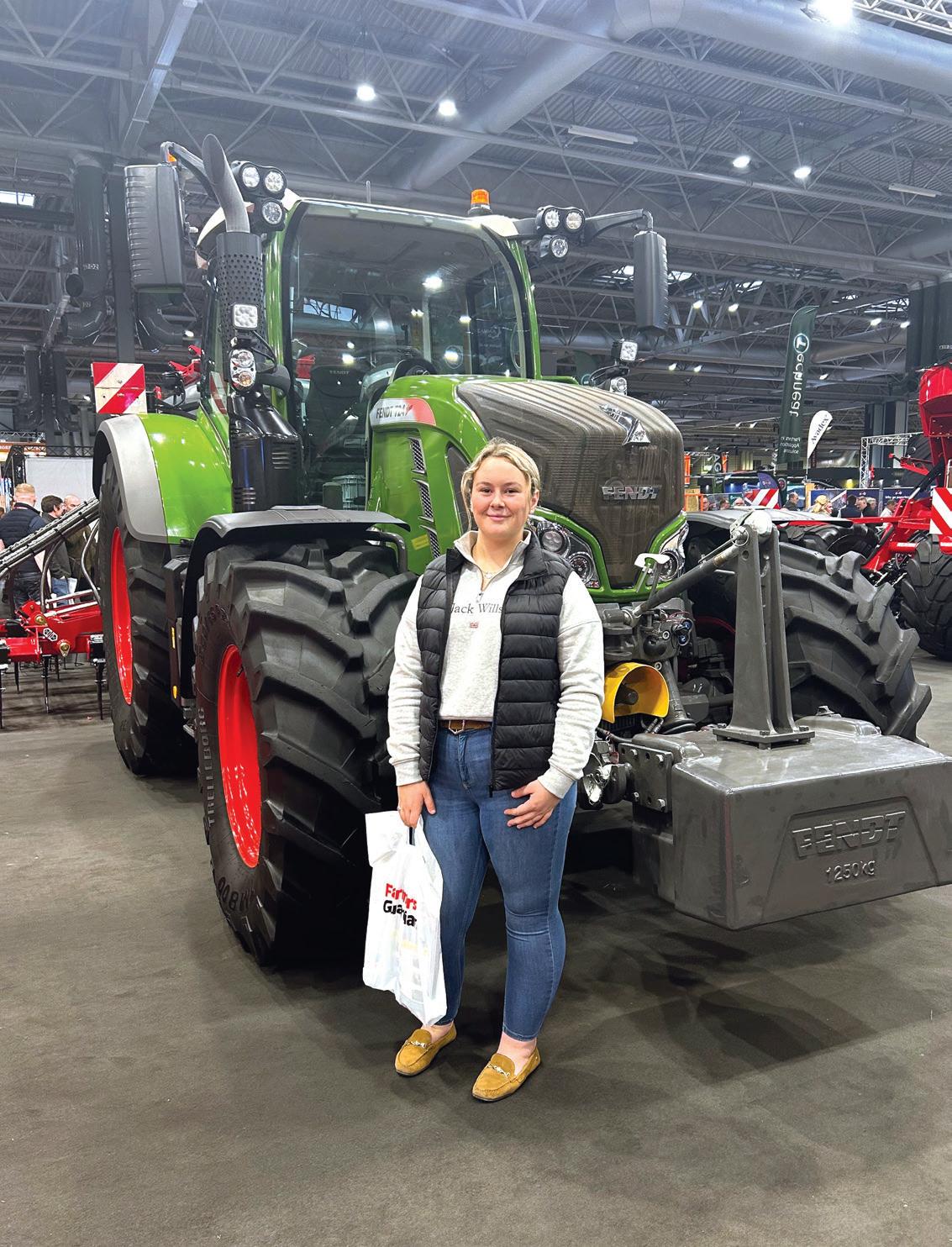
X forager with air suspension and better visibility plus a lift-up cab on a telehandler.
As we complete assessments and business plans, the information I gathered and learnt at the event can be embedded into the ideas I will be pulling together as part of my assessed coursework.

We will have many more opportunities to link in with the industry over the coming weeks. For me, it's an essential part of the course as it gives a real insight into the industry in terms of challenges and opportunities.
Saturday 13 May 2023

A er three years, we're delighted to announce that Plumpton College Open Day & Spring Fair is back!


Save the date, sign up for our newsle er and get notified when tickets go on sale.

WWW.SOUTHEASTFARMER.NET | FEBRUARY 2023 15 TO ADVERTISE CALL 01303 233883 EDUCATION Visit www.plumpton.ac.uk to study a range of fantastic land and environment courses
Faye
The Marden Fruit Show Society (MFSS) has appointed Sally Flanagan, a long-standing committee member and former executive director of The East Malling Trust, as its new chief executive officer.

Sally takes over the reins from South East Farmer’s own Sarah Calcutt, who has stepped down as executive chair and has now become honorary chair of the society.
Sally has taken over all day-to-day responsibilities of running the MFSS, which includes organising the annual National Fruit Show alongside setting up an education programme for the industry and schools together with competitions for growers and producers throughout the year.
She said it was “an absolute honour to be
NEW CEO
appointed CEO”, adding: “The work of the MFSS is essential in promoting access to knowledge and best practice relating to agriculture and horticulture here in the UK as well as information and best practice for the storage, packaging and marketing of fruit.

“We also have a team which provides a successful and growing outreach programme of science, nutrition and careers education to schools, and with additional sponsorship funding we can expand this across the UK.
"This year is also the 90th year of the National Fruit Show and following the success of the 2022 show, opened by HRH The Countess of Wessex,
we are looking to build on that success with an exciting event to showcase the talents of British Fruit growers, the best of British fruit and the wider industry, along with access to the latest technology that innovates and supports it.”
EVOLVING, NOT DECLINING
The National Fruit Show is evolving, not declining, according to new honorary chair and former executive chair of the Marden Fruit Show Society Sarah Calcutt.
Sarah was quick to respond to comments from renowned show veteran David Banfield, who wrote to South East Farmer following the impressive 2022 show putting forward his views on why he felt the number of entrants was declining.
David said the cost involved, the time it took and the fact that growers had other priorities, not least finding the workforce to pick their fruit crop, was all having an impact on the number of exhibits at the show, opened this year by Her Royal Highness The Countess of Wessex.
Using Bramleys as an example, he said: “To pick and collect for the show is done in two stages. You pick more fruit than you show as you pick and size as you go. I pick more fruit at this stage because you can't always see problems such as pests, scratch marks or internal condition.
“Enough fruit is picked for class one and two, which takes approximately 10 to 12 hours. Then there is the sorting and packing for the display trays, which can take up to three hours for each entry, providing fruit is sized well, free from blemishes etc. It takes three trays for one entry.”
He went on to suggest that picking for dessert apple categories took longer, “as you need a lot more fruit per tray; for a 35 count you
need approximately 350 plus apples to select for show trays”. He suggested that would take 12 to 14 hours. Pears were easier, needing “about 300” and taking six to 10 hours, he suggested.
In response, Sarah Calcutt pointed out that there were two new entrants in 2022, both of whom won a class, and said that despite considerable consolidation across the industry, “we are seeing consistent support from our core entrants and new competitors join in every year”.
Sarah said that Katie Langridge, a younger exhibitor who was successful at the 2022 show, taking home three prizes, packed her 15 entries of fruit over one weekend and picked fruit in the evenings, “so perhaps a half day of time over the harvest season”.
David, 89, has been showing fruit for the past 40 years, with the Bramleys he selected for Richard Edmed judged as the overall winner at this year’s show.
HERE’S HOW TO DO IT
Meanwhile Brian and Norma Tompsett, chair of the judges and competition manager respectively, have put forward their thoughts on preparing fruit for display. They also pointed out that they are happy to advise newcomers on how to approach the task and reminded newcomers that there are novice classes at the annual event.
TOP TIPS
• Select for uniformity of colour; remember there are no points for high colour, just consistency.


• Be strict on pests and diseases, shape and blemishes.
• Don’t pick masses of fruit as it takes time to pick it and then to choose the best; set yourself a high standard and stick to it.
• Keep to a narrow size range rather than picking to the extreme range allowed in the class.
• In classes with two sizes per variety, pick both at the same time (for example, for Cox 65/70 and 70/75 we would pick from 67 to 73 and separate them later).
• Using this strict approach, aim to pick three times the number required (i.e. 100 fruits per entry for dessert classes).

The two experts added: “It is hard to recall how long it took us, but I guess we could pick an entry in three to four hours. With different varieties this task is spread over several weeks.
“As for packing, from memory we would pack 12 entries over the weekend prior to the show. We would take the fruit out of store on the Thursday, giving time for it to come up to ambient temperature ready for packing on the Saturday.
“We would strongly advise encouraging keen and enthusiastic members of staff to take on this work and allow them to keep the prize money.”
FEBRUARY 2023 | WWW.SOUTHEASTFARMER.NET 16 FRUIT
Sally Flanagan
Q4 IS ALWAYS A CHALLENGE
SARAH CALCUTT Executive Chair, National Fruit Show
Q4 is always a challenging one in business, getting your brain back into gear after what was hopefully a wonderful Christmas with a memorable New Year’s Eve party shortly afterwards.
There’s the delightful small avalanche of emails, answering messages from weeks ago, the planning for the year ahead, budget reconciliation, annual accounts to prepare and possibly also a few members of staff who


have decided to jump ship during their Christmas break. Can you tell I’m writing this on ‘Blue Monday'?
If you’re a French apple farmer you are using the start of 2023 to uproot orchards and deliver them, along with rotten apples, to the entrance of power plants installed to run Carrefour and Intermarche purchasing offices. Direct action from another part of our industry suffering from the current ‘food is cheap’ culture.
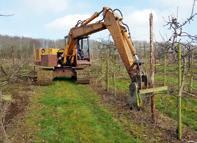
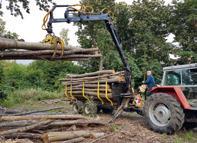
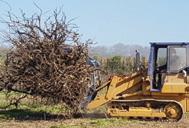

Reading through postings on LinkedIn from the global farming industry, there is nowhere that isn’t facing an utter crisis right now – exorbitant costs of inputs, labour shortages, radical changes in environmental policies as governments struggle to hit United Nations sustainable development goals and a global populace struggling to pay for anything, let alone a healthy, sustainably produced, balanced diet.
Before I get into trouble with the editor and dive down into what is happening with those struggling for food, I’ll move onto the positives I have seen.
Google has joined Dyson in investing enormous amounts of money into farming technology. The start of the year saw Google + JSR Corporation join a $13.7m investment in the farm management platform Cropin. The total deal, worth $15m, is destined for a cloud-based platform which will unify the company’s apps and services and aims to digitise the whole agricultural value chain – giving efficiencies in farm management, remote sensing and data collection for traceability.
Google’s parent company, Alphabet, is also working on hardware prototype robots destined for crop management tasks in the future and is also part of a one million hectare regenerative farming consortium testing new practices and technology-based systems.

Where I’m getting to is that if the tech giants are putting money into farming, there is sight of a good future. Clearly there is the green/carbon offset agenda for big business at the beginning of their engagement, but just think of what the potential will be when they get into tree fruit and its carbon holding capacity when compared to a field of grass, corn or alfalfa?
For those wanting to raise issues about their current situation, especially regarding the retail environment, the annual Grocery Code Adjudicator survey has started its six weeks call for action. In 2022 the


adjudicator received 2,500 responses, a considerable uplift on previous years. With the current uneconomic returns being reported I would imagine that there will be another considerable uplift this year.
The 10th survey will have 14 retailers within its scope. It remains wholly confidential and the best opportunity for British retail suppliers to share their experiences of the previous year. The 9th survey continued to demonstrate clearly the need for better returns; it also showed a fall in perceived code compliance.

The 2023 results will show if suppliers believe retailers have improved or whether compliance has worsened again during tough trading conditions. Mark White, Groceries Code Adjudicator, said: “Since my last survey, inflation has continued to affect the entire groceries sector, straining the relationships between retailers and suppliers. I am concerned about how the retailers are responding to CPI (cost price increase) requests and whether this pressure is causing other issues to arise.
“I want to hear from as many suppliers as possible so I can understand the ongoing impact of inflation and other issues affecting suppliers. This will help me to work with the retailers to ensure they are treating all suppliers fairly and lawfully.”
The GCA survey can be found at:
www.gov.uk/government/news/gca-launches-2023-annual-survey
And finally, congratulations to Sally Flannagan who has been appointed the first CEO of the Marden Fruit Show Society. To be able to build the society to a point where we would warrant a senior executive of Sally’s calibre has been a long-term aspiration of mine; I couldn’t be happier that we were able to appoint Sally.
WWW.SOUTHEASTFARMER.NET | FEBRUARY 2023 17 TO ADVERTISE CALL 01303 233883 FOCUS ON FRUIT SARAH CALCUTT
Orchard grubbing by W H Skinner & Sons
Grubbing, timber & groundwork services • orchard grubbing • windbreak removal • timber extraction • fallen tree removal • ground contouring • land clearance • excavations • cultivations • pond dredging • reservoir construction 01622 744640 - 07711 264775 www.whskinnerandsons.co.uk
W.H.Skinner
& Sons
“THOSE SHEEP ARE MINE”
The sun is shining, but the floods are at the highest they’ve been all winter. Road conditions are appalling, with alarmingly deep potholes with the potential to inflict serious damage hidden under water. After collecting Anna, aged two from nursery, I was driving along a bumpy road surface when a little voice piped up from the child seat: “Be careful, grandma.” This back seat driver also likes to give advice at road junctions. “One, two… go,” she says with great enthusiasm, and then claps as a reward. It’s worth remembering that following her advice could be catastrophic.
In the autumn we had a scrape constructed on our marsh ground. It was funded by a grant through the High Weald AONB. We were rather pleased with it, but as these marshes have been under water for most of the winter, its existence is easily overlooked. Hopefully when drier weather returns it will be revealed and the enhanced habitat appreciated.
Our oldest grandson, aged four, stood beside me watching the digger in action and, thinking it must be every boy’s dream, I asked: “When you’re older, would you like to be a digger driver?” He gave me a scornful look and exclaimed with great conviction: “No, grandma, I’m going to be a super hero.” I felt suitably reprimanded.
Not long afterwards I was invited to his superhero fancy dress birthday party. I went as a Super Ewe (sheep onesie complete with red cape). It mixed in well amongst the Batmen, Supermen, etc., frolicking on the bouncy castle and whizzing down the slides. I believe “growing old is inevitable, but growing up is optional”. Admittedly I did get a few funny looks on my way to the Sovereign Centre; no harm in promoting the sheep industry to the urban population, though.
The ewes grazing on the Pevensey levels look well despite the weather, and checking them certainly keeps me active, all part of the ‘get fit for lambing’ programme. They will be returning to the home farm at the end of February. I was hoping to scan then, but I’m told that to get accurate results it needs to be done between 80 and 100 days after inception. The marshes aren’t the ideal location for scanning, so let’s hope it’s a fine day.
Fattening lambs has been challenging. Some sold well during December when Angus, aged three, accompanied me. He loves coming to market. He asked me why some sheep in the pen had an A marked on them, and I told him it must be A for Angus. He looked around at other pens and spotted more hoggets marked with A, and with a beaming smile proclaimed: “Those sheep are mine.”


When he learns what fun shepherding is, I wonder if he’ll maintain this enthusiasm. Sheep sold, Angus celebrated in the market café with a hot chocolate. As is usual, lamb prices dropped around Christmas and, sure enough, New Zealand lamb started to appear on supermarket shelves. I’m hoping prices recover, otherwise I’ll be cursing the fact that I didn’t sell lambs as stores.
It seems particularly galling to read newspaper headlines proclaiming supermarkets are forecasting bumper profits. Both producers and consumers are likely to be paying the price for this. If large retailers refuse to pay UK farmers fair prices for their produce, that’s all the more reason for farmers to have access to alternative options, namely trading locally.
There’s strong consumer support for local produce. It’s economically beneficial, provides local employment, involves fewer food miles and reduces environmental impact and animal stress. Is our government incapable of grasping these facts? It would seem so, as they do nothing to stop the demise of small abattoirs.
Enough, no more closures. As an industry we should be supporting each other, working together and aiming for an improved food chain that is safe, less bureaucratic and workable. Wouldn’t it be great if the Food Standards Agency (FSA) could change its negative attitude
FEBRUARY 2023 | WWW.SOUTHEASTFARMER.NET 18 MONICA AKEHURST AT THE KITCHEN TABLE
Surrounded by sheep
Angus loves accompanying me to market
and actually help make improvements for the good of the whole food industry, not just worrying about export but also about the needs of UK home meat consumption trade, a market that is five times that of the export market.
The FSA has the power; we need constructive help, not obstruction to change. As a grass roots farmer, I acknowledge that perhaps I’ve been guilty of taking the work of abattoirs for granted and not fully realising the problems they face. Getting animals booked in in advance helps their work schedule.

There’s no point in moaning about the past. We should look to the future and ensure that no more abattoirs are lost. In December the Local Abattoirs R Key (LARK) group organised visits to our two closest abattoirs; firstly Forge Farm Meats, located in Southborough, 45 minutes by car, 24 miles from here, and secondly Downland Traditional Meats, Henfield, 49 minutes by car, 34 miles (timings estimated off peak and distances from our farm according to Google Maps).
They were worthwhile visits; our group looked very fetching attired in white boiler suits and hair nets. At Forge Farm I witnessed sheep being slaughtered and at Downland, cattle. It’s a skilled job, professionally done; the staff were friendly and answered all our queries. I was impressed by both businesses and they have my admiration and support.
The NFU held an interesting virtual abattoir meeting at which three panelists spoke about their experiences/challenges running abattoirs. Also discussed was the idea of setting up a mobile abattoir, the cost of which sounded eye watering, not to mention the logistical, bio security and licensing challenges. It’s certainly not the quick fix that some are making it out to be.
At home, winter calving is almost finished. We tested our pulling skills once more when a cow surprised us by having twins. She calved the smallest first, and while it was filling itself on colostrum we observed another pair of legs appearing. We decided assistance might be wise as the second girl was impressively large, considering she was a twin. I don’t know where the cow had been hiding them.

Six Sussex cows and 20 sheep are presently residing in the grounds of Herstmonceux Castle, employed on conservation grazing duties.


In the farmhouse kitchen the war on dirt and straw continues. it might drive me to drink. It’s not the dogs….



WWW.SOUTHEASTFARMER.NET | FEBRUARY 2023 19 TO ADVERTISE CALL 01303 233883
Resident swans on the marsh
Proud mother with her calves
Dirt… We’re not the culprits, awaiting shower
Water, water every where
Floods subside to reveal scrape
Cattle conservation grazing
A responsive and jobs-focused approach to learning gives students at Hadlow College the best possible opportunity to move on into a rewarding career in the agricultural industry.

Close access to the college farm gives them hands-on experience with livestock, while top-level teaching is backed up by extra-curricular activities that give students valuable additional skills.
While the agriculture curriculum follows a nationally agreed syllabus, there are optional modules, which allow the tutors to liaise with local businesses, the industry and students to ensure that the final mix is relevant to local skills needs and job opportunities.
James Wright, Hadlow’s head of curriculum for agriculture, agricultural engineering, fisheries management and countryside, explained the importance of
JOBS-FOCUSED APPROACH LEADS TO REWARDING CAREERS
creating the most appropriate curriculum for today’s students.
“We work hard to give our students a great experience and a rounded education, but we also want them to be able to find good jobs when they leave here,” he commented. “That’s why we talk to the industry about the skills that are needed and the opportunities there are so that we can make sure the curriculum reflects those things.”
Agriculture lecturer Josh Velvick has first-hand experience of the way the college operates, having attended Hadlow as a student and left with a level 6 BSc Hons degree in agriculture. After spending a few years back on the family farm in Hawkhurst he returned to the college to manage the dairy herd, which he did for 18 months.
Josh then decided that while he enjoyed
working with livestock he preferred the company of students, so he trained as a lecturer, earning his post graduate certificate in education with Hadlow in association with Canterbury Christchurch University.
He began lecturing while training and, now qualified, finds it a worthwhile and rewarding career. “I really enjoy seeing the new intake of keen young students arrive in September, develop their skills and knowledge during the year, achieve their qualifications and then head off to the world of work,” he explained.
The focus on making students workready is central to the Hadlow ethos and is reflected in the results the college achieves. James estimated that more than 90% of students left college and found themselves a job in agriculture, with many of them
FEBRUARY 2023 | WWW.SOUTHEASTFARMER.NET 20
Students Finn Selby-Green, Georgia Field and Bingo Bunkuea
staying in touch over the years and regularly updating their former tutors on their career progress.
“It’s great to hear from students who have left and gone on to do well,” said Josh. “We’ve just heard from one who is working out in Australia at the moment and lots of them keep in touch.”
While the dairy herd is no longer at Hadlow, having been replaced by a 25-strong herd of mainly Hereford suckler cows, that doesn’t mean current students don’t get their fair share of dairy experience, including early morning milking duties.

The college has set up a strong link with the Pickering family which welcomes students to its dairy set up at Park Farm, just two miles away from the Hadlow campus.

“It’s a strong relationship and it works really well, giving our students access to a successful dairy business and a chance to see how a commercial dairy farm works,” said Josh.
“It’s a real-world scenario and great preparation for life beyond the college. Learning and working on a commercial dairy gives our students a real sense of responsibility as they know how important it is to get things right in that kind of setting.”
The students agree that the off-site opportunity provided at Park Farm is a benefit rather than a disadvantage.
Finn Selby-Green, a 19 year-old level 4 agriculture student, commented: “Seeing how another business works is a real bonus. It allows us to compare strategies and see a different approach as well as getting the chance to gain some practical experience.
The college farm – Blackman’s Farm, close to the main campus – has a flock of around 450 Suffolk mules, north country mules and Lleyns which graze close to 500 acres.
The farm is looked after by Simon Newington, who, while his main focus is the welfare of the animals, is also well aware of the support he can give to the teaching staff and students, who routinely help with a range of jobs on the farm, from feeding to vaccinations.
“When you are working with livestock things happen, sometimes unpredictably, and part of my job is to make sure that I pass on any opportunities for students to get
involved with hands-on farming outside the usual curriculum,” he explained.
The way to make sure that happens is by having clear lines of communication between the farm and the teaching staff, something that benefits from the fact that Simon’s partner Tania Bucknell is a technical instructor at the college as well as working alongside him on the farm.
Simon, who took on the farm manager’s role in September, was born of farming stock in Groombridge, East Sussex. After graduating from Harper Adams University in Shropshire he worked for Sentry Ltd on a number of different farms before gaining experience in a variety of environments, including an organic farm in the Cotswolds where he looked after two dairy herds.
“My main role here is to look after the farm and see that the stock is well managed, but I’m always on the lookout for opportunities to contribute to the students’ experience,” he said.
With a neighbouring farm offering its fields for crop walking and farm operation experience, and the dairy herd no longer on farm, Simon is looking to make the best use of the grassland at Hadlow and is considering expanding both the beef and sheep herds. He is also keen to make good use of the existing buildings at Hadlow, with calf rearing one future option.
While not a commercial entity as such, the college farm is expected to “make a margin”, in James’ words, something he feels is important. “The students need to understand the economics of agriculture,”
he said. “It’s something they study and it’s important for the farm to demonstrate how it works in practice.”
Simon is currently preparing for a busy lambing season, with 400 ewes having scanned at 200%. “Including 40 sets of triplets,” he added. It could mean a few headaches when things get busy, but it should make the college’s popular lambing weekend an event not to be missed.
This year’s event on 25 and 26 March will offer a great chance for members of the public to see not just newborn lambs but everything else the college has to offer.
With climbing walls and other family friendly activities, plus a chance to
WWW.SOUTHEASTFARMER.NET | FEBRUARY 2023 21 TO ADVERTISE CALL 01303 233883
>>
James Wright and Josh Velvick
www.hadlow.ac.uk TIKTOK
tour the animal management and reptile centres and learn more about what the college has to offer, it promises to be a great day out. Alongside the chance to enjoy the sight of scores of spring lambs gambolling in the field, there is always the chance to visit the lambing sheds and potentially see a newborn enter the world.
There will be food and drink on offer, as well as a range of stalls and other attractions. The event normally attracts between 8,000 and 10,000 people, so booking early is advised. Tickets, at £10 per adult, £5 for children 2 to 16, students and concessions and £25 per family (two adults and up to three children) are available online.
Farm manager Simon said that as well as offering a great opportunity for visitors to see around the farm, it also gave the students experience in dealing with the public and a chance to share their knowledge.

While student Finn Selby-Green is keen to use his degree as a springboard towards a more management-focused career, level 3 agriculture students Georgia Field and Bingo
Bunkuea, both in their second year, are hoping to begin their careers at the end of their current studies.
Bingo, who comes from Thailand, where his grandfather grows sugar cane, is considering returning to that country at some point to share his knowledge and pursue a farming career there, while Georgia said she enjoyed every aspect of the course but was particularly keen on working with livestock and enjoyed milking.
Looking forward, the trio said that they expected technology and integrated farming systems to be the way forward for agriculture, along with a focus on protecting the environment. All three were full of praise for the skills they had learned at Hadlow College.
Lecturer Josh Velvick explained that extra-curricular activities at Hadlow allowed students to gain additional qualifications such as a telehandler ticket, while the Yellow Wellies Foundation supplied valuable health and safety training and local vets provided injection training.
Another popular part of the Hadlow
offering is the end of year study tour that takes in different farms and businesses and gives students a wealth of experience, great contacts and, in some case, the chance to impress a future employer.
“It’s just another way in which we make sure the college retains a clear focus on helping students into work,” added curriculum boss James Wright.
The photographs accompanying this article were taken by Daisy Moseley, a former North Kent College photography student who is now the marketing and communications assistant at Hadlow College.
25-26 March 2023
www.hadlow.ac.uk
FEBRUARY 2023 | WWW.SOUTHEASTFARMER.NET 22
TIKTOK
<<
LAMBING WEEKEND
Simon Newington
ANOTHER VOICE IN THE FOOD, FARMING AND RURAL ECONOMY LANDSCAPE?
Although most people know me as a partner at top ten accountancy firm MHA, the UK member firm for Baker Tilly International, I also chair the Rural Policy Group, itself supported and sponsored by MHA.

The Rural Policy Group came into being at the start of lockdown, but it has already grown to be a powerful force in rural affairs.
It grew out of two things: Firstly, my many years working within the rural economy, in rural further and higher education and training, as well as with many rural businesses. I have always been passionate about giving back and making a difference to the sector, which I believe we did for many years, providing exceptional educational and commercial training to students to future proof the rural industries in Kent and the wider South East.
Secondly, it grew out of a passion to highlight (and help do something about) the issues faced by many rural businesses. These include challenges such as fair payment terms, rural health, rural crime, the huge issue of achieving 70% UK food security (in my mind by 2030) and, of course, the continuing issues surrounding rural employment.
CHAMPION OF SUSTAINABILITY
I’m also a champion of sustainability in rural businesses, not only because there are critical environmental issues that face us all but also because a robust sustainability or ESG (Environmental, Social and Governance) strategy can add value to rural businesses.

At MHA we talk about ESG in terms of ‘profit with purpose’. For us, ESG programmes should not just be a continuum of investment in technologies. We look at the return on investment forensically, too. After all, as one of the Rural Policy Group RED Talk event
attendees said: “It’s hard to be green when you’re in the red”. Wise words.
DYNAMIC ESG
The MHA ESG programme is called Dynamic ESG. It’s so named to differentiate it from the plethora of ESG offerings that are static and that, all too often, are simply a drain on business finances, worthy beyond comparison though the end goal is.
The Dynamic ESG approach means rural businesses can invest because it pays to do so. That’s a win-win for all of us. In effect, delivering profitability with purposeful action.
REPORT
In the 2021 Rural Policy Group Annual Report (copies available to download at https://www.ruralpolictgroup.com), we reported on the role of farmers and landowners in providing environmental services to the wider economy. With 70% of UK land mass under agricultural ownership, I cannot think of a more pressing mission for these custodians of our future.
The report also looked at investing in fair value and food security. In fact, the Rural Policy Group’s priorities are encapsulated in the phrase ‘Sustainable finance priorities to stimulate and support the long-term future of agriculture, food and farming’. That includes food pricing (fair value in the upstream and downstream supply chain) and food security (70% UK self-sufficiency in food production by 2030).
For those of you thinking that all of this sounds fine, but where are the actions, I’m delighted to report that RPG has been invited to form an All-Party Parliamentary Group with a direct voice to the ears of government and opposition.
This is the first time that an independent body with a strong food, farming and rural economy agenda has the voice to match its ambitions.
I shall be reporting on the APPG progress in future editions of South East Farmer, but suffice to say that when it sometimes feels like your voice is the only one in the food, farming and rural economy wilderness you can be assured that MHA and the Rural Policy Group are out there shouting with you too.
MARK J LUMSDON-TAYLOR Partner, MHA and Head of Sustainability and ESG UK
WWW.SOUTHEASTFARMER.NET | FEBRUARY 2023 23 TO ADVERTISE CALL 01303 233883
www.macintyrehudson.co.uk
HELPING FARMERS SELL MEAT DIRECT
I visited the Downland Traditional Meats abattoir back in December as part of a small group of local farmers and members of LARK (Local Abbatoirs R Key) exploring alternative options in the wake of Tottingworth’s decision to close in January.
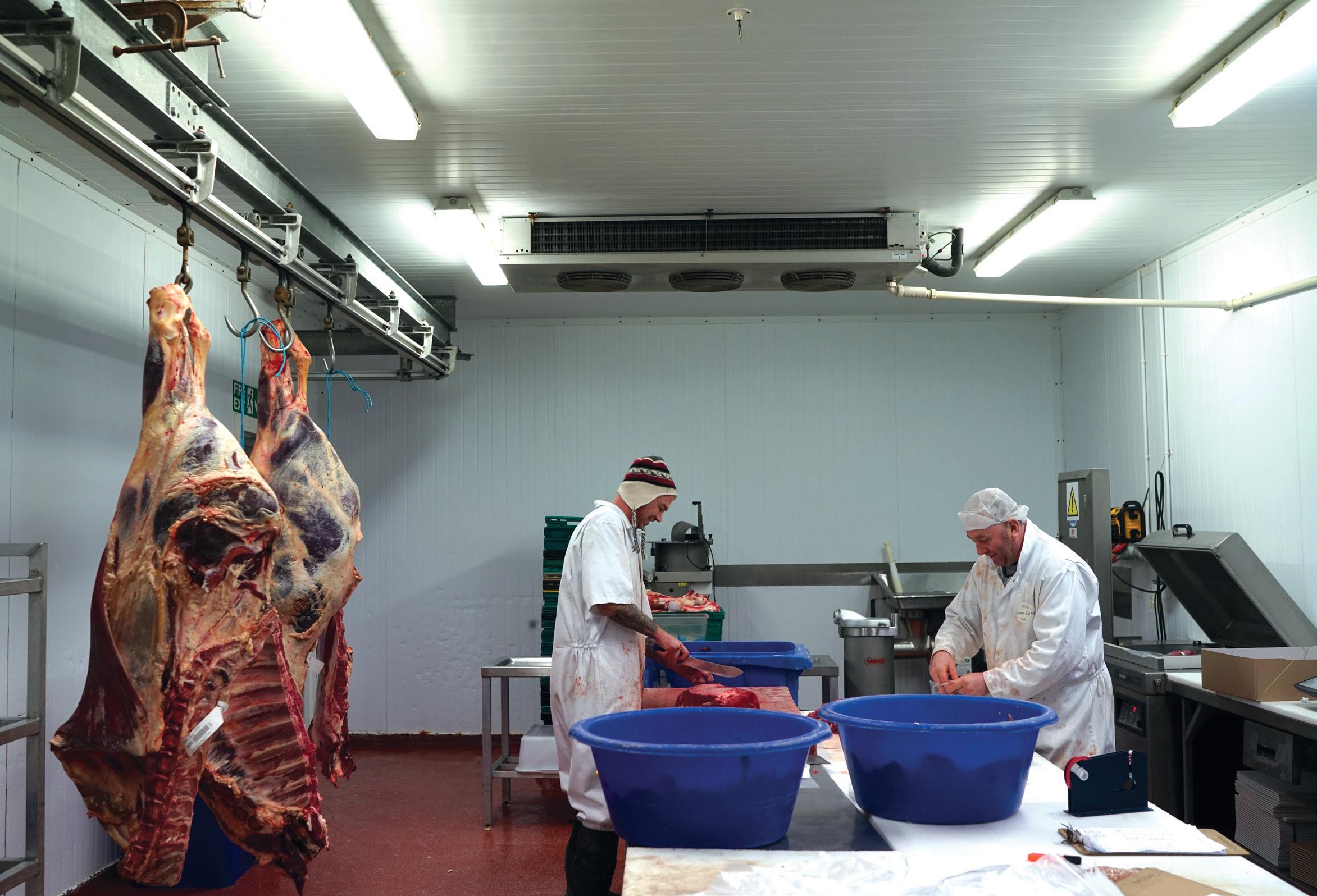
Leaving our small family farm in Boreham Street it took us approximately 49 minutes door to door, including a slight detour thanks to some questionable navigation by Google Maps.
We eventually arrived at Morley Farm, located off the main Henfield road. The site
is set down a long gravel track across farm land which leads to an enclosed yard. In the middle is a large agricultural building that houses the lairage, slaughter house, fridges and butchery.
We park up and head towards a couple of temporary buildings, where we are greeted by the business owner Luke Smith and Sally Biggs, a member of his team who handles sales and logistics. As we wait for a few other members of the group to arrive, we watch a farmer turn up with a livestock trailer and back onto the lairage to unload a couple
of cattle. Reassuringly, the process looked straightforward, with plenty of space to turn, and the drop off went without a hitch.
When everyone had arrived we moved inside one of their cabins, where Luke explained a bit more about his own farming background, the abattoir and what he was doing to try to help farmers like ourselves carry on selling our meat direct to the public.
The abattoir had been “ticking along nicely” since he had taken it over in September 2021, said Luke, but demand had rocketed since the news broke about Tottingworth.
FEBRUARY 2023 | WWW.SOUTHEASTFARMER.NET 24 NIGEL AKEHURST VISITS: DOWNLAND TRADITIONAL MEATS
This month Nigel Akehurst visits Downland Traditional Meats at Morley Farm in Henfield, West Sussex, to meet Luke Smith and find out more about his abattoir, butchery and farming business.
“From a personal perspective I think the news is a complete disaster,” he said, referring to the many local farmers, smallholders and butchers who will no longer have access to a local cattle and sheep abattoir in East Sussex.
However, he said they were trying to make the best of a “not great" situation.
“We are expanding the business to help and moving from killing three days a week to four days from the end of January,” he said.
To do this he is taking on additional members of staff and moving to killing pigs only on a Monday and killing cattle and sheep from Tuesday to Thursday, he explained.
By killing on a Thursday he hopes to support people that are buying out of Hailsham Market on a Wednesday.
“They can get them here on a Wednesday and lairage them with us and we can kill them on a Thursday. That's what we're going to try to do and we're going to start that from the end of January,” he said.
Luke acknowledges that February might be a “tricky” month, while they iron out any teething issues with the new system and put two additional slots into the slaughter hall. He stressed that the more notice farmers could give, the better the system would operate.
The conversation in the room turned to deliveries and Luke explained that they currently deliver meat back to customers throughout the South East. They operate two lorries and a van and deliver weekly to Steve Smithers in Hellingly.
There followed a short discussion around the idea of setting up a collection point at Hailsham Market, something that farmers and Luke agreed could work well in the future subject to agreement from parties such as Hailsham Market and DEFRA.
BUTCHERY AND ABATTOIR TOUR
We put on white suits, boots and hair nets before following Luke into the main building. We walk down a white corridor and enter a large modern butchery, where two of Luke’s butchers are busy dicing, weighing and packaging up stewing beef for a customer.


“Since taking over the premises we have invested a significant sum into the butchery, with all new weighing and labelling kit,” he explained.
We then head back to the main corridor and walk past a series of cooling fridges towards the main slaughter hall, a large double height space up into the eaves. As we enter, the slaughter men (and one young woman) are busy at work on the line. The workforce is 100% English.
The whole set up seems clean and professional. Luke explained how it worked in terms of identification, which is a question they are asked regularly and an area they pride themselves on (to ensure customers get the same animal back).
FARM FACTS
• Rents around 2,000 acres within a five-mile radius of Dorking Town Centre. Mainly conservation grazing agreements
• Two full-time staff on the farm side of the business
• Herd of 70 native breed suckler cows (split into two closed herds) plus some bought-in stores
• All grass fed and mainly grass finished (using some food waste when available)
• Out winter around half the cattle on various grazing projects
• 700 breeding ewes (mainly commercial Suffolk mules with small number of Jacobs for niche markets)
• Buy in straw for winter bedding but make all their own silage and hay
• Direct meat sales business selling 25 to 35 lambs, 15 to 20 pigs and two to three cattle a week into customers in London and Surrey.
• Took on the running of the abattoir and butchery site at Morley Farm, Henfield in September 2021
• Has invested a significant sum in modern labelling kit to improve the butchery facility
• Moving to four days a week killing from end of January
• Fourteen full time staff in the abattoir, butchery and transport
• Deliver meat throughout the South East using two lorries and a van
WWW.SOUTHEASTFARMER.NET | FEBRUARY 2023 25 TO ADVERTISE CALL 01303 233883 >>
Luke Smith
NIGEL
VISITS: DOWNLAND TRADITIONAL MEATS

“When you bring your animals in, your name and number of animals goes on the whiteboard outside. The lad in the lairage enters the details into a computer in the exact order they will kill them in, which comes through to the computer screen in the slaughter hall.
“In terms of cattle, they are on the rail in terms of the order they are killed. The tags are checked against the passports. The passports are all then numbered in terms of their kill number and that system will stay with them all the way round the line,” he said. Weighing is also carried out in the same room.
On the topic of offal, he explained: “If you haven’t had any rejections on the returns you get all the offal; tongue, cheeks, kidney, lung, tail, heart, which has to be collected ideally the next day,” he said. If farmers don’t want their offal it is either offered to other customers or goes for dog food; nothing is wasted.
Sheep skins are another byproduct that can be collected (at no cost) and Luke said they will even salt the skins for customers if they are unable to collect on the same day.
During a break in proceedings, we head out into the lairage and Luke shows us the sheep and pigs’ pens and explains that they kill both
organic and non-organic animals, starting with organic animals at the beginning of the day.
<< Farmer ’s December 2014 edition).
Concluding our tour, we head back to the cabin and take off our white suits and put our farm boots back on. After a short group chat we all leave feeling a lot more optimistic about continuing our direct meat sales in 2023.
FARMING BACKGROUND
To find out a bit more background information and hear how things are progressing at the abattoir, I give Luke a call some time later.
I learn he grew up helping his mum, Amanda, who has always worked on livestock farms, while his dad, Ian, worked in construction. On his 18th birthday his parents bought him a couple of Jacob ewes, marking the start of his farming journey. He added a couple more ewes and rented some fields in a local village.
Like a lot of young farmers, Luke knew he would need to get a full-time job to support his farming ambitions. He started out as a trainee sales rep at Agricultural Central Trading, better known in the industry as ACT, selling agricultural products to farmers (his appointment was featured in South East
Any spare money or time was invested into his own fledgling farm business as he continued to build up his sheep numbers and started adding value by selling boxes direct.
In 2017 he moved to ABP as a trainee cattle buyer, which allowed him to continue to earn money but also have more time on his own farm. He enjoyed the more practical role and spent time travelling around farms in the West Country, selecting cattle and sheep for slaughter.
After a couple of years he was given a call by a recruiter and asked to go for a job interview with Genus. Getting the job, he joined as an area sales manager and began managing their salesforce in Dorset and Somerset. That gave him the next step up, allowing him to work from home a couple of days a week.
Before leaving ABP he spent his last year working in Guildford, in their operations department, where he learnt a lot about the abattoir game in terms of things like transport and logistics, he said.
By this point, he was being offered grazing projects by the National Trust and had bought his first herd of 12 Dexters. Then another project came up and they wanted Galloways,
FEBRUARY 2023 | WWW.SOUTHEASTFARMER.NET 26
AKEHURST
so we bought a herd of Galloways, he said.
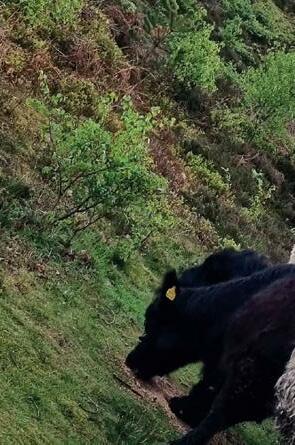
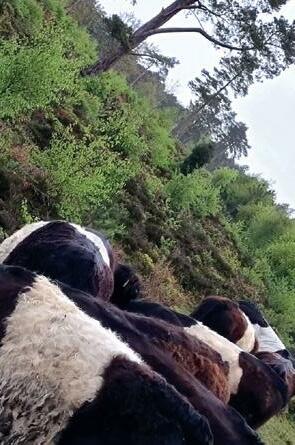

During this process, Luke was adding value to the end product by boxing up the animals and selling them direct to the public. He used a local abattoir and butcher friend John, who let him come in and help do the labelling and sorting to keep costs down
A couple of years after Luke had joined Genus, the farm business had grown to a point where he needed to focus on it full time. Then the abattoir came up for rent in September 2021 and he went to view it. Luke was initially hesitant but ultimately realised it made sense to take it on.
“I had more animals than I needed (for the box scheme) and was selling them at market, which from an animal welfare perspective didn’t feel like the best thing to be doing,” he said.
“I remember hearing about things like live export and non-stun Halal slaughter” he recalled, adding that he believed both practices should be banned.
TAKING ON THE RUNNING OF THE ABATTOIR AND PARTNERSHIP FARMING BUSINESS MODEL
Taking on the abattoir was a big learning curve, he said, but his experience at ABP, coupled with being new to the job, helped attract more farmers to start using them.
Luke now spends most of his time at the abattoir, with his partner Georgina Forrest carrying out the day-to-day work on the farm with one other full-time member of staff. The farming business now encompasses
nearly 2,000 acres of land within a fivemile radius of Dorking, Surrey. Most of the land is farmed on various partnership agreements, (some of which he pays for) and conservation grazing projects where he is paid to graze.


The majority of their suckler cows are Galloways (a closed herd of 43), with a recent acquisition of another 30 or so Blue Greys run as a separate herd. Nearly all the offspring are reared to fat off a grass-based diet with some waste foods, such as bread, fed to housed fattening cattle when available.

All the fat animals are processed through the slaughterhouse and 90% of the products go to customers in London (either as carcasses or in primals). This year they will lamb down around 700 ewes, mostly Suffolk Mules with around 45 Jacobs, and they also rear Large White and Landrace pigs, which they buy in as weaners or close to finish to put through the abattoir once fat. These then go to customers in the London and Surrey area.
Luke is a huge advocate of the partnership model of farming and works closely with the National Trust. He has recently taken on a 940-acre block where he is carrying out various grazing projects.

On the phasing out of Basic Payments, he doesn’t see it as a problem for his own business and says he only receives it on one 100-acre farm where he pays an inflated rent.
Most farmers and land owners are being forced into countryside stewardship agreements to make ends meet, he said, but they still need livestock to graze the land,




a model that has proved a sustainable and profitable endeavour for himself.



UPDATE ON THE ABATTOIR
I asked how things were going.
Luke replied that it’s been a slow start to the year and that he has yet to see a lot of talk of new customers actually materialising in his ‘book’.
“In two weeks’ time I’ve only got 30 sheep booked in,” he said, albeit adding that he is confident that figure will rise to 300 or 400.
The conversation tured to the recent dip in lamb prices, which Luke thinks may encourage more farmers to start boxing them up and selling direct again.
He also brought up a recent NFU webinar on mobile slaughterhouses, which he thinks are great in theory, although he hopes people don’t overlook what they have in front of them. He also feels like more support should be forthcoming from government to help with the increasing regulation and costs for existing smaller scale slaughterhouses like his own and Forge Farm Meats in Southborough, Kent.
THE FUTURE
Ultimately, Luke feels optimistic about his plans to expand and take on more customers. Having visited his abattoir and spent time getting to know Luke, I am sure his efforts to scale up will be rewarded as more farmers like myself start to use him. I only hope that our government finally wakes up and starts doing more to support our local food infrastructure before it is too late.
WWW.SOUTHEASTFARMER.NET | FEBRUARY 2023 27 TO ADVERTISE CALL 01303 233883
BACK FOR A FOURTH YEAR – AND MORE IMPORTANT THAN EVER
The South East’s largest agricultural and machinery show, Farm Expo, will return for its fourth year at Kent Showground, Maidstone on 1 March 2023. The event will showcase the best of farming machinery, goods, and services from national and international suppliers.

Launched in 2019 with the aim of connecting farming merchants and buyers, Farm Expo has rapidly become a key date in the diary for both agri businesses and visitors. More than 100 exhibitors are expected to attend, showcasing the latest in innovative equipment and technology in all sectors of farming, land management and related businesses.
The organisers promise “an opportunity to see live demonstrations, view equipment and machinery up close and have access to a wide variety of expert knowledge - all in one place”. Alongside the trade stands on offer, Farm Expo’s seminar programme will add an additional draw. In 2022, visitors heard from a number of speakers on the topic of 21st Century Farming: Evolving in a Changing Landscape
The programme covered themes such as diversification, regenerative soil practices, natural capital and succession. The headline seminar for 2023 is set again to look at major issues facing the agricultural industry, with personal anecdotes and words of wisdom from the panel of speakers.
Julian Barnes, Chairman of the Kent County Agricultural Society, said: “Farmers have never before faced as many challenges as they do now. With today’s society ever changing, new barriers are thrown up continually, whether it be sustainability, an economic crisis or the lasting impact of Covid-19. Farmers are having to constantly diversify and evolve.
“It is more important than ever that Farm Expo brings farmers the knowledge and innovation needed to help their businesses not just survive but thrive. With the range of exhibitors and other resources on offer, Farm Expo is an important date in the calendar for farmers to meet their peers and see developments in the industry.”
FEBRUARY 2023 | WWW.SOUTHEASTFARMER.NET 28 FARM EXPO 2023 PREVIEW
Farm Expo is FREE to attend. Book your space online at : www.kcas.org.uk/farm-expo/
1 MARCH 2023
Support the Kent County Agricultural Society’s charitable work by becoming a member. Visit the website to get started: www.kcas.org.uk






PANEL OF GUEST SPEAKERS
Each year Farm Expo welcomes a panel of guest speakers to take part in seminars covering topics related to farming and agriculture.
Last year, visitors heard from Sam Barnes, Tom Sewell, Richard Wordsworth, Sarah Mannooch and Callum Preece on a range of subjects such as diversification, sustainable land and business management and natural capital.


Furthering the theme of The Future of Farming, this year’s Farm Expo seminar will be a continuation of topics raised at the Kent Farming Conference held on 25 January.
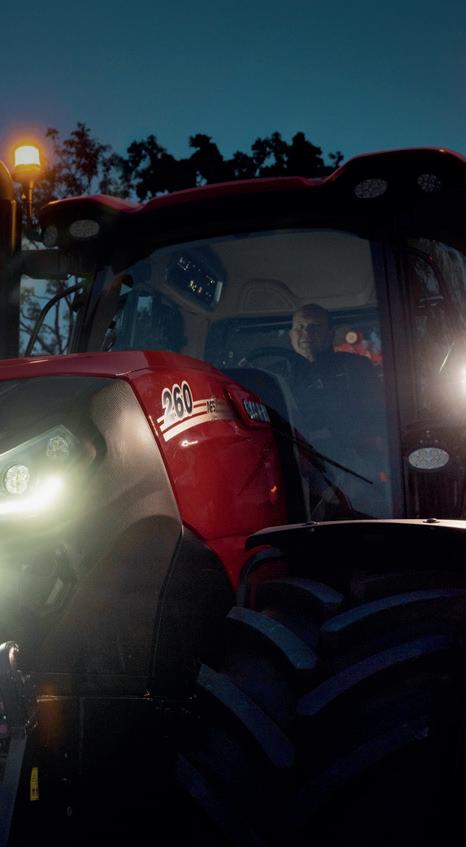

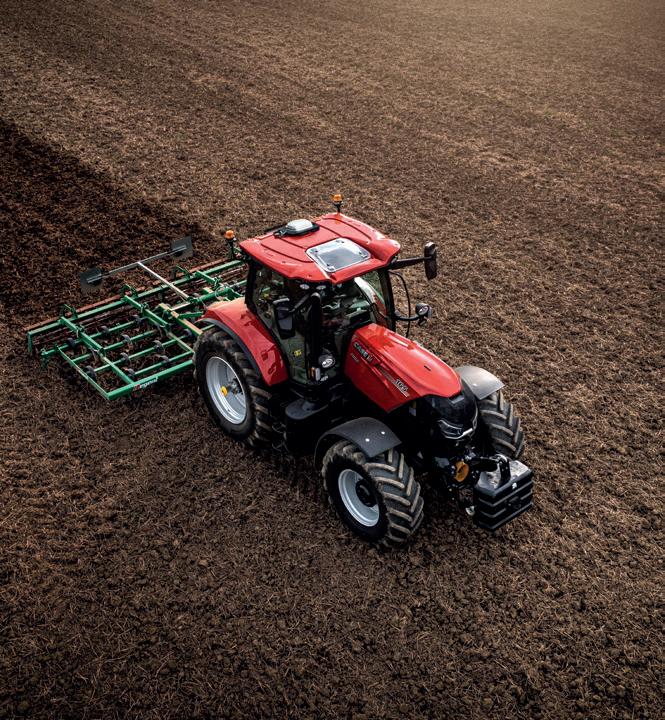
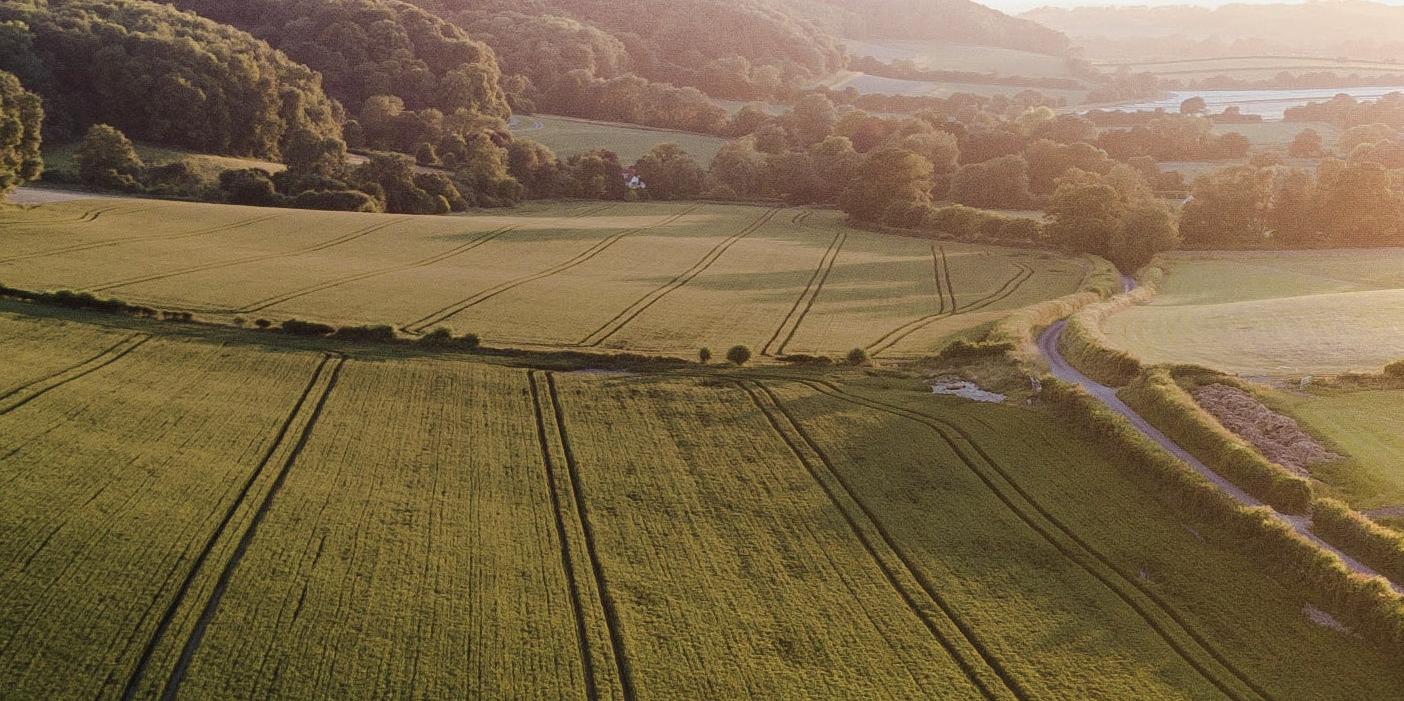
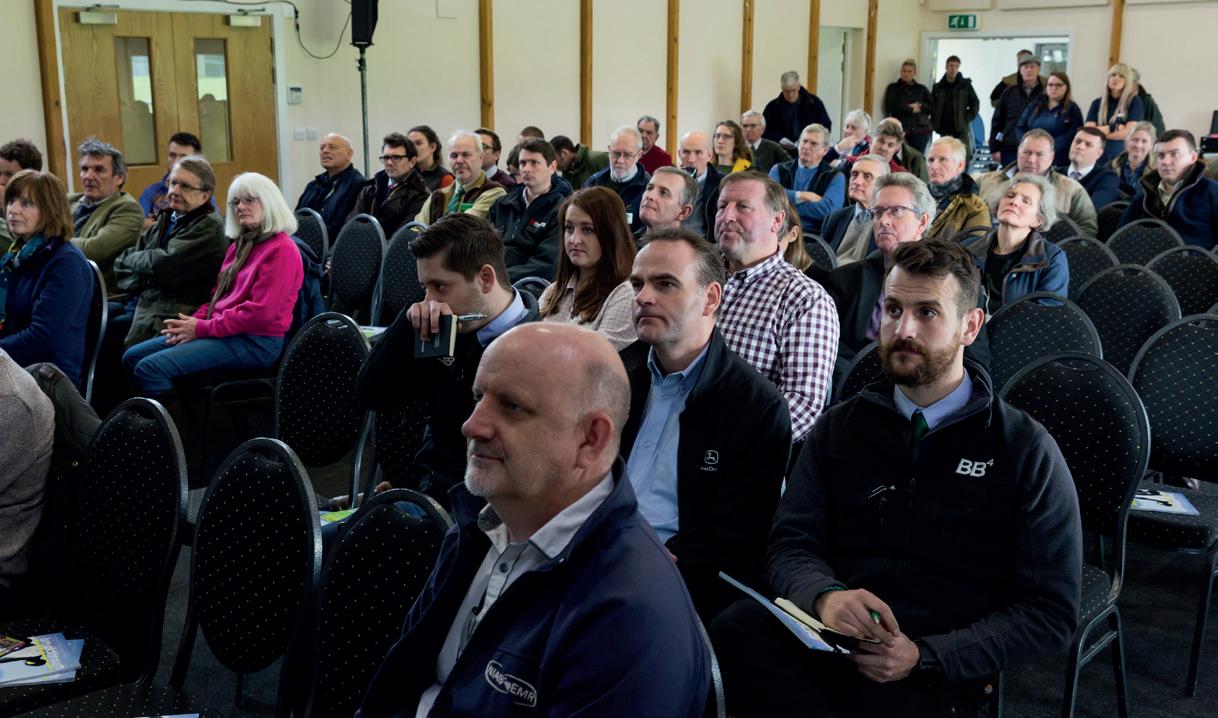
The first speaker, James Loder-Symonds, is director and owner of Nonington Farms in Kent and winner of the British Farming Awards (BFA) Arable Farmer of the Year Award 2022. James will discuss diversification and land management, sharing his thoughts on the future direction of these areas.
The second speaker, Colin Hall, director at BTF, Heathfield, is a qualified solicitor with a broad knowledge of a wide range of rural professional matters. Colin manages the firm’s specialist employment division known as The BTF 50 Club and will touch on the labour shortage issue and examine the future of labour supply. A third speaker will be announced soon.
Nikki Dorkings, General Manager of the Kent County Agricultural Society, said: “These seminars are an invaluable part of Farm Expo as they facilitate important conversations about challenges and opportunities facing our farming community. Not only do they give visitors the chance to explore new ideas and solutions, but also to join in a conversation with their peers.”
The seminar will take place in the Astor Pavilion at 11am. It is free to attend.














WWW.SOUTHEASTFARMER.NET | FEBRUARY 2023 29 TO ADVERTISE CALL 01303 233883
1 MARCH 2023 When it comes to land & property in the South East, all roads lead to Batcheller Monkhouse batchellermonkhouse.com Join us at Farm Expo 2023 for a complimentary coffee & advice on the latest grants, barriers & opportunities in the rural world. A CHOICE FOR ANY REQUIREMENTS Birchington CT7 0PT Tel: 01843 847207 Haynesagri @agrimachines Haynes Agri Come and see the Haynes team at Farm Expo MADE FOR THE REAL PRO For more information talk to your local authorised Case IH dealer or visit www.caseih.com THE NEXT LEVEL OF PRODUCTIVITY • AFS Connect telematics AFS AccuGuide Remote diagnosis and service Software/Firmware over the air MyCase IH platform THE NEXT LEVEL OF PROACTIVITY • Improved Multicontroller operating armrest with AFS Pro 1200 monitor • Keyless entry and theft protection THE NEXT LEVEL OF PROFITABILITY • Economical, reliable HVO engines from 250 rated horsepower to 313 max. horsepower • Optimal efficiency – 50kph at 1,600rpm (CVXDrive) THE NEXT LEVEL OF PROTECTION • 3 Years SAFEGUARD CONNECT Package • CNHi Capital professional financing solutions for every investment OPTUM AFS CONNECTTM HAYNES AGRITEC LTD.
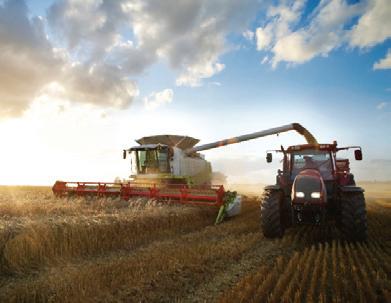
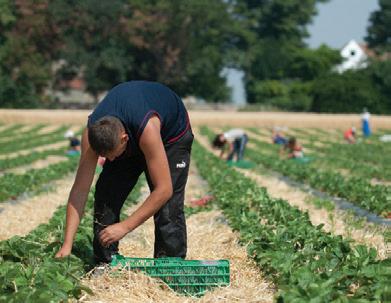
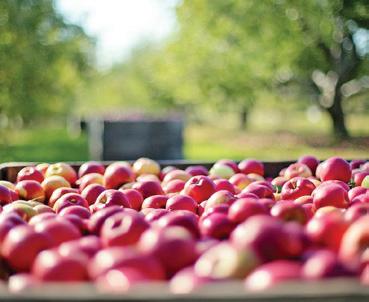








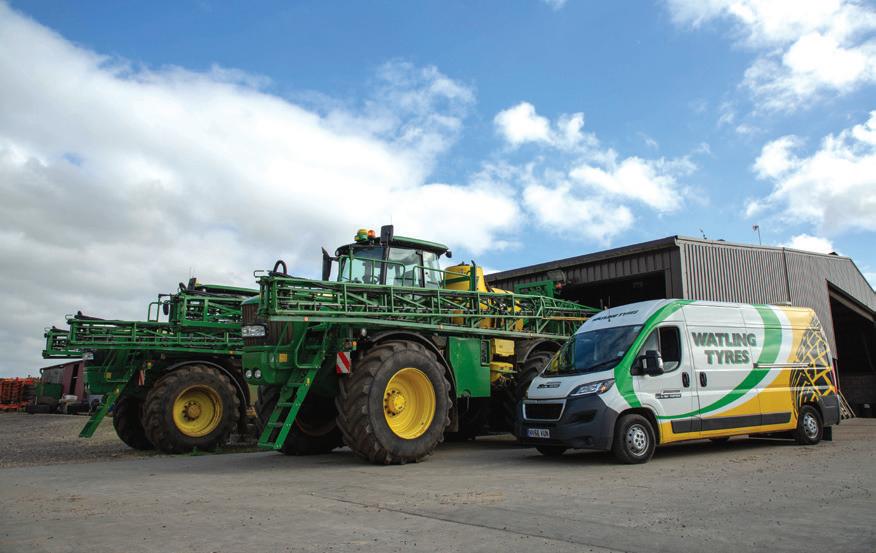
















FEBRUARY 2023 | WWW.SOUTHEASTFARMER.NET 30 Land&PropertyExperts www.btfpartnership.co.uk PropertySales,Lettings &Acquisitions Valuations Property&Estate Management Landlord&Tenant Employment&HRAdvice Telecommunications& Renewables CompulsoryPurchase &Compensation Planning AgriculturalFinance Development Grants&Subsidies Auctions Viticulture Canterbury 01227763663 Challock 01233740077 Heathfield 01435864455 FOUR JAYS GROUP Tel: 01622 843135 enquiries@fourjays.co.uk www.fourjays.co.uk HIRE SPECIALISTS ACROSS THE SOUTH EAST For Short or Long Term Hire • Single Plastic & Mains Connect Toilets • Shower Trailers • Welfare Units & Canteen Trailers or Cabins • Temporary Storage Containers & Offices • Effluent Tank Emptying including Cess Pits & Septic Tanks For Events • Luxury Prestige & Themed Trailer Toilets • Single Event Toilets including Enhanced Access • Generators • Chiller Trailers & Shower Trailers www.watlingtyres.co.uk Ashford 2 Victoria Road, TN23 7HJ (01233) 620599/662297 Canterbury 85 Sturry Road, CT1 1DA (01227) 464328/453966 Maidstone 1a Hope Street, ME11 2TF (01622) 764449/672952 Hastings Keats Close, TN38 0PP (01424) 422224 Northfleet Unit 2, Grove Road, DA11 9AX (01474) 327855 Medway London Road, ME8 6YX (01634) 364255 Sittingbourne St Michaels Road, ME10 3DN (01795) 472354 On Site Tyre Repair or Replacement Great service Great choice Great value since 1962 YOUR NO.1 INDEPENDENT TYRE DEALER The South East’s Agricultural Tyre Specialist Tractor, Trailer and all Agricultural Tyres at the Best Prices COME AND SEE US AT 1 MARCH 2023 THE IMPOSSIBLE IS THEIR SPECIALTY Winchester SO21 3DN 01962 794100 Newbury RG20 7DJ 01635 281222 Horsham RH12 3PW 01403 790777 Wrotham TN15 8LW 01732 880880 Uckfield TN22 5RB 01825 841100 Great Chart TN26 1JJ 01233 822205 Haynesagri @agrimachines Haynes Agri Come and see the Haynes team at Farm Expo
100 YEARS OF THE KENT COUNTY AGRICULTURAL SOCIETY
The organisation behind Farm Expo, the Kent County Agricultural Society, is celebrating its centenary, having been founded in 1923.
The founding council, chaired by The Right Honourable The Earl of Guilford, tackled the ambitious task of holding the first Kent County Agricultural Show in Wombell Hall Park, Gravesend that June.
With post-WW1 income no longer guaranteed, there was a great appetite from breeders and agriculturalists, and the livestock turnout for that first show marked it as a success.
For one whole week the town opened its streets for the Kent County Agricultural Society in a great celebration, with evening entertainment from bands, concerts, drama productions, swimming exhibitions, schools’
sports, and a carnival – and so set the precedent for 92 more shows of its kind.
Throughout its history, the society’s mission has been embedded in endorsing agriculture, improving the breeding and rearing of livestock and encouraging the invention and development of agricultural implements and machinery.
In 1963, after outgrowing the grounds at Mote Park, the Society decided it was ready for a more permanent fixture, buying the 38-acre site at Detling Aerodrome, where it has remained for the past 60 years. In 1990 the society applied to The Charity Commission, and on 17 December that year the Kent County Agricultural Society was officially registered as a charity.
100 years on from its establishment, the society’s core ambitions remain the same.
It now holds six events annually: The Kent Farming Conference, Farm Expo, the Heritage Transport Show, Living Land, Biddenden Tractorfest and its flagship public event, the Kent County Show. Through these events, the Kent County Agricultural Society continues to encourage best farming practices and inspire the next generation.

In 2015 the society established the Kent Rural Scholarship Scheme, supporting up to three new students a year studying a farming or land-based degree course.
In the seven years of the scheme, the society has sponsored 20 scholars, donating a total of £60,000 in scholarship awards. The society has also donated between £9,000 and £20,000 a year in grants to Kent Young Farmers’ Clubs, providing essential funding for the services and materials they need.
TRADE STAND AWARDS
South East Farmer Magazine is delighted to be sponsoring the Outstanding Exhibitors Awards 2023 at Farm Expo.
All trade stands will be automatically enrolled into the competition in one of the three categories and will be judged on criteria
such as design of the stand, quality of the product, staff representation, customer service and presentation of message.
Competition categories include:
• Best trade stand for agricultural products
• Best trade stand for machinery
• Best trade stand for services. Applications for trade stands are still open. With indoor and outdoor options available to suit all businesses and budgets, contact tradestands@kentshowground.co.uk or call 01622 630975.
WWW.SOUTHEASTFARMER.NET | FEBRUARY 2023 31 TO ADVERTISE CALL 01303 233883 FARM EXPO 2023 PREVIEW
EVERYTHING YOU NEED
Lister Wilder, main dealers in Kent for Kubota, Merlo, Yamaha, Kockerling, Bomford and more, will be at this year’s Farm Expo with a large range of machinery, including the all-new Kubota M6002 tractor and a selection of Kubota implements including the hugely popular Geospread.
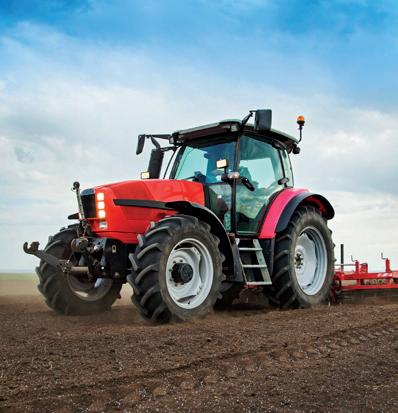
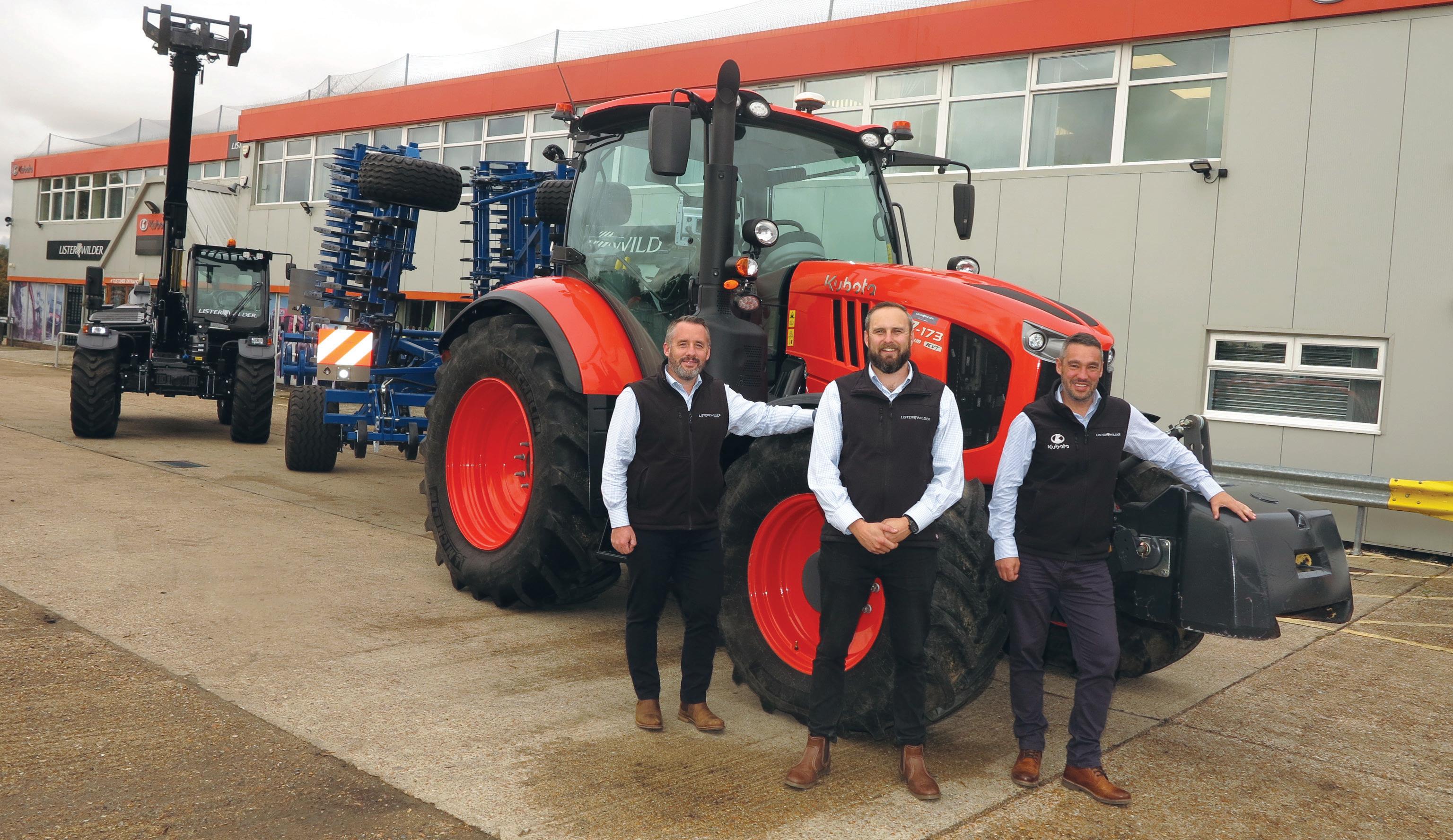
Merlo handlers, from the compact 27.6 to the special edition 42.7 with cab suspension, will also be on display, alongside Yamaha ATVs and side-by-sides, Bomford side arms and flail
toppers and Kockerling cultivation equipment.
Established in 1947, Lister Wilder is proud to remain a wholly owned family business committed to providing an unparalleled end-to-end service for all machinery and equipment needs in agriculture, groundcare, construction and arboriculture in the south of England.

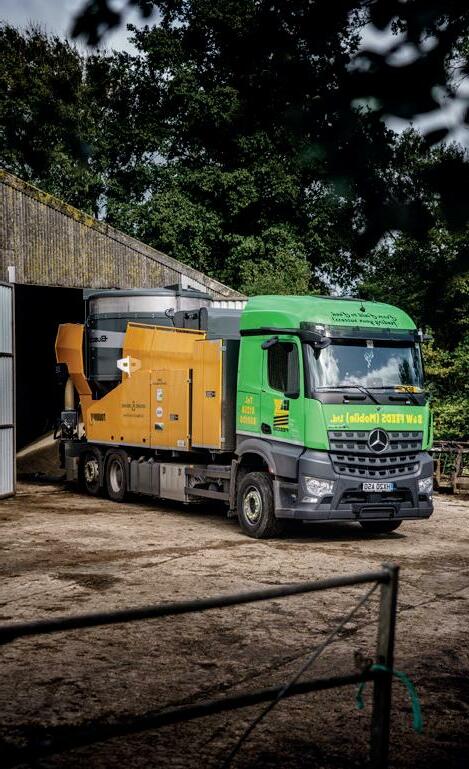
It is an accredited supplier of leading brands within each of these industries and has a dedicated, specialised knowledge base across its Ashford, Bristol, Cirencester, Guildford and

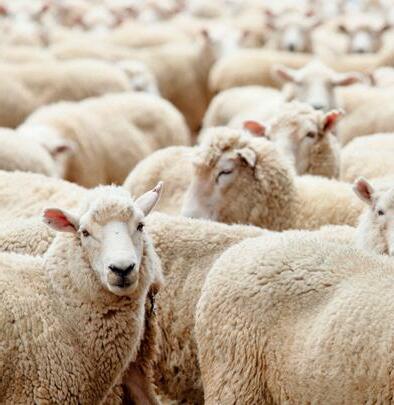
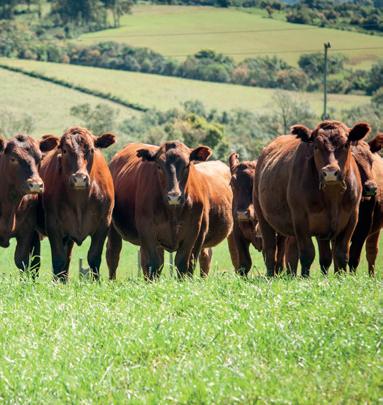
Reading branches.
The dealership works hard to live up to its reputation as an award-winning, professional machinery and service provider, and believes this boils down to its dedicated team of more than 100 people who always go the extra mile, together with over 70 years’ experience and an extensive product portfolio.



Lister Wilder’s aim is to be your partner of choice; together we will ensure your machinery delivers everything you need –year in, year out.
To be the first to receive updates and learn more about Society events throughout the year, subscribe to the KCAS newsletter at: www.kcas.org.uk
FEBRUARY 2023 | WWW.SOUTHEASTFARMER.NET 32 FARM EXPO 2023 PREVIEW
01258 830100 enquiries@bwfeeds.com www.bwfeeds.com Have you ever asked yourself... • Do I really know what’s in my feed? • Am I paying too much for feed? • Can I use my homegrown crops? Use our mobile mill and mix service! • Free expert nutrition advice • Quality feed made on your farm • Fully certified to work with organic & conventional farms! We offer... Property Consultants RURAL LAND AND PROPERTY Hobbs Parker Property Consultants LLP Romney House, Orbital Park, Ashford, Kent TN24 0HB Email: consultants@hobbsparker.co.uk 01233 506201 www.hobbsparker.co.uk Advising farmers and landowners throughout the South East • Farming Arrangements • Valuations • Compulsory Purchase & Utility Schemes • Development Advice • Land Sales & Purchases • Basic Payment Scheme • Renewable Energy • Planning • AMC Agents See us at Farm Expo Come and speak to one of our experts.
MORE TO A PROJECT THAN JUST A BUILDING
Wealden AM is always excited to attend the Farm Expo show. The company has been supplying and managing steel-framed building projects in the South East of England for nearly 30 years. In that time, Wealden AM has delivered projects to meet a wide range of needs for agricultural, industrial and commercial customers. Wealden AM understands that there is more to a building project than just a building.
Providing a first-rate customer service is at the heart of what we do and we pride ourselves on being able to offer a complete building package, from expertise and advice during the planning and design stages through to the supply and management of the construction itself.


Wealden AM’s in-house team provides the variety of skills and enthusiasm needed to give every project its all, and, working alongside our suppliers and contractors, enables us to put together a team best suited to each individual project. This can include planning consultancy and groundworks, together with all building elements. Located in East Sussex, most of our existing customers are based in Kent and East and West Sussex. If you have a project in mind that Wealden AM may be able to assist with, visit us at stand K162.
UPCOMING EVENTS



1 APRIL 2023 THE HERITAGE TRANSPORT SHOW
A display of over 1,000 vintage vehicles including classic cars, motorcycles, tractors, steam and stationary engines, joined by hundreds of buses from across the South East and beyond.
4 MAY 2023 LIVING LAND
A free event for primary school children in years 3 and 4 to learn about farming, food production and the countryside. Over 47,600 children have taken part in this event since it was initiated 18 years ago.
7 TO 9 JULY 2023 KENT COUNTY SHOW
The society’s showcase event celebrating farming, livestock and rural crafts throughout the Garden of England.
19 AND 20 AUGUST 2023 BIDDENDEN TRACTORFEST
A family friendly annual country fair with a focus on vintage, classic and modern tractors. Part of the event proceeds are donated back into the community.
To learn more about any society event, or how you can get involved, head to www.kcas.org.uk Alternatively call 01622 630975 or email info@kentshowground.co.uk
Sowing the seeds for your success
Discover an approach to law that’s more progressive, more proactive and more pragmatic.
We’ll help your agricultural business to reach the next level.


birketts.co.uk
Southern Farmers Ltd.
Buying For Our Members – Not For Profit!
One of the largest agricultural buying groups in the UK with over 1000 members serving farming members in Kent, Sussex, Surrey, Hampshire and beyond. Access to accounts with extensive list of local and national suppliers at discounted prices. One account and one monthly payment by direct debit. Windmill
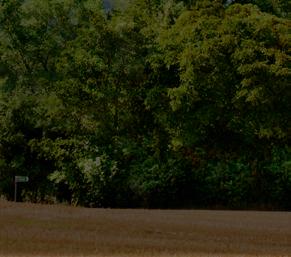




WWW.SOUTHEASTFARMER.NET | FEBRUARY 2023 33 TO ADVERTISE CALL 01303 233883
1 MARCH 2023
Farm, Rolvenden, Cranbrook, Kent. TN17 4PF
Tel: 01580 241401 enquiries@southernfarmers.co.uk www.southernfarmers.co.uk
REALISING THE FULL POTENTIAL OF DIGITAL FARMING
To fully realise the potential of precision farming, Hutchinsons believes in taking a raft of information, beginning with the soil and adding layers of data from a variety of sources, to enable intelligent and informed decision making. This level of detail and data can bring greater visibility into farm performance.


Precision farming is nothing new to the 335ha farming business DH Woods & Son that has been variably drilling crops for 12 years to allow it to tailor seed rates to soil type and condition.
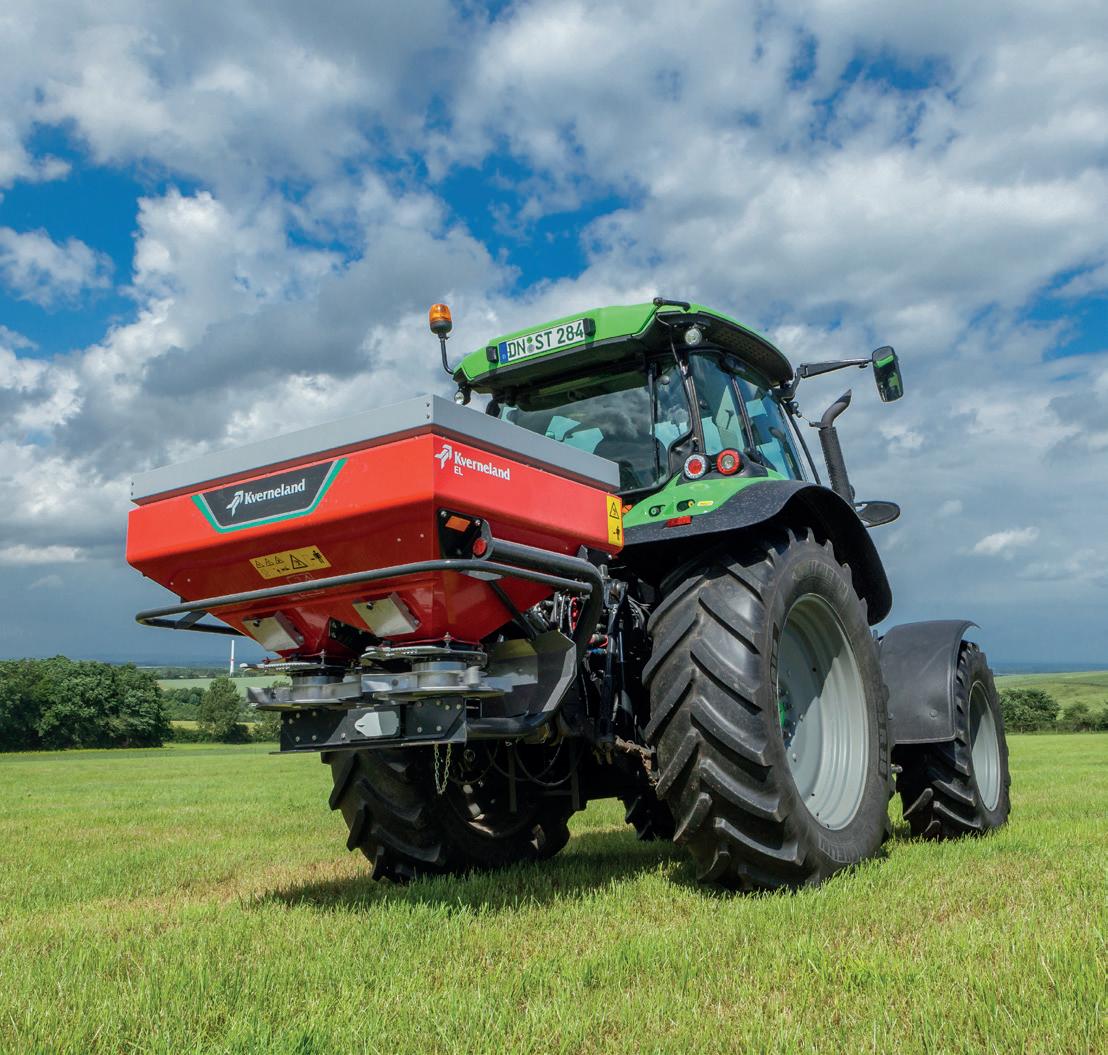
After having the whole farm TerraMapped and moving over to the Omnia Digital Farming system, Mr Woods has been impressed by the level of detail and accuracy, “having shown up clear variations in the soils that had not been seen before”.
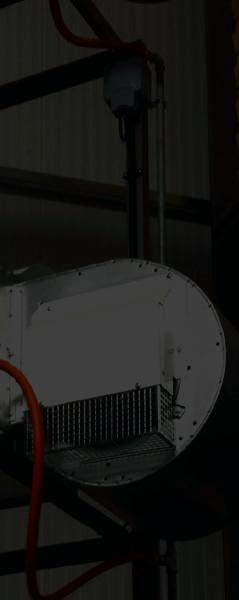
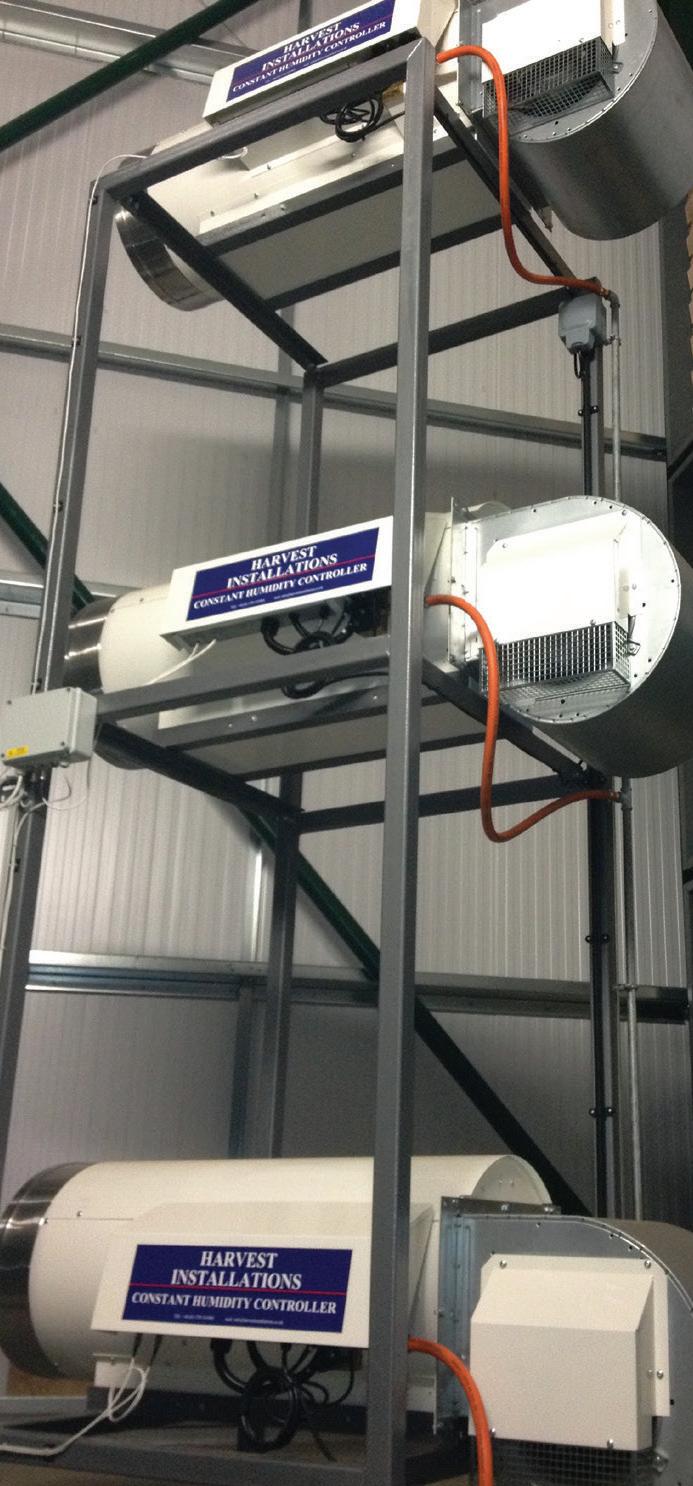


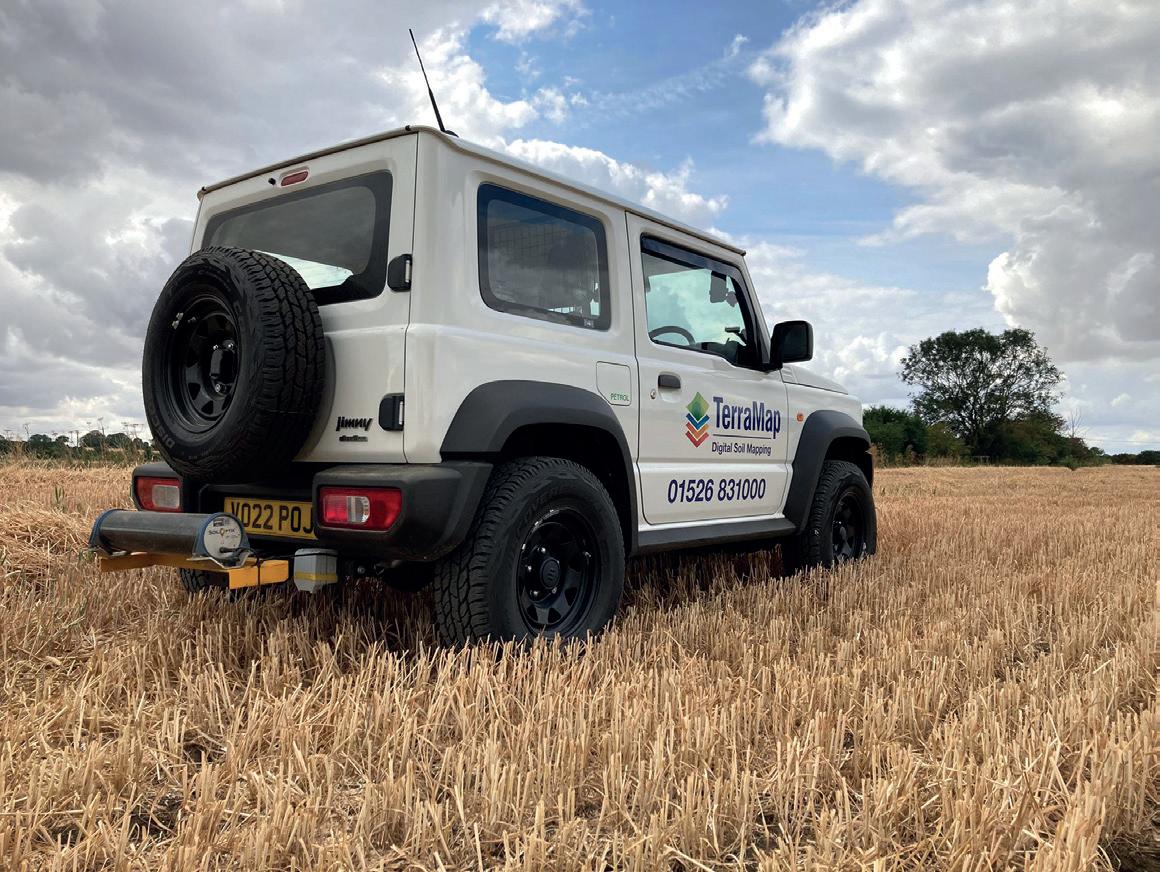
Mr Woods said: “TerraMap made it pretty clear that we had been generating variable rate plans on quite shallow and inaccurate data. For example, pH is actually more variable than we thought, as is our soil texture.
“So going forward we will use this new level of data from TerraMap to generate accurate and precise drilling plans that work on a sub-field basis.”

TerraMap is Hutchinsons’ revolutionary soil scanning service that provides greater definition and more accurate soil maps than any other system.


To find out more and how your farm business could benefit, visit the Hutchinsons stand at Farm Expo.

FEBRUARY 2023 | WWW.SOUTHEASTFARMER.NET 34 FARM EXPO 2023
Support That Lasts a Lifetime Bell Agricultural Ltd Support That Lasts a Lifetime Ivychurch, Kent TN29 0AW www.bellag.co.uk | 01797 344 688 QUALITY SPREADING COME AND SEE US ON OUR STAND GREENCROP IRRIGATION MAIN DEALER HARVEST INSTALLATIONS CALL: 01795 533903 : Unit 2/3 Oaklands Park, Rougham Hill, Bur y St Edmunds, Suffolk, IP33 2RW info@har vestinstallations .co.uk HARVEST INSTALLATIONS www.harvestinstallations.co.uk HARVEST CONSTANT HUMIDITY CONTROLLER Gives you guaranteed dr ying conditions, 24/7. of units in use on all combinable crops and onion stores nationwide CROP DRYING SPECIALISTS
24/7 OPERATION ACROSS SOUTH EAST
With sixty years of service under their wheels, the experienced team at Watling Tyres knows all there is to know about supplying and fitting agricultural tyres.
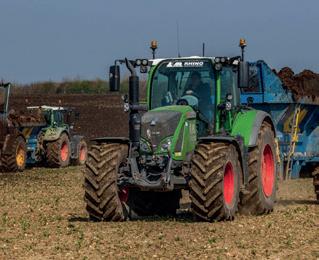

The family business, set up in 1962, has grown steadily over the years and now looks after farmers and farming businesses across Kent, Surrey and East Sussex from 14 wellsited locations throughout the region.
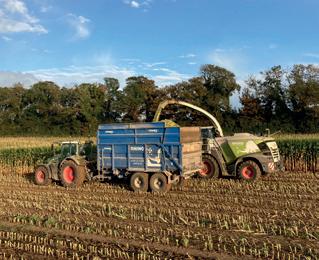

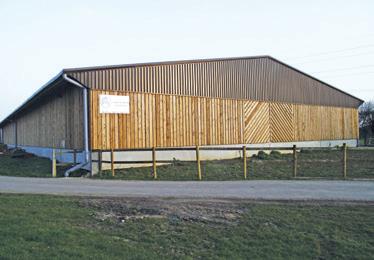

The highly skilled team, providing a 24/7 operation across the South East from a



50-strong fleet of specialist vehicles, meets or exceeds the industry standard response time of 90 minutes and can supply and fit a huge range of tyres.
Executive director Pat Laming said the strength of the Gravesend, Kent-based company was “in its excellent, well-trained and customer-focused staff”. While its focus was on service, Watling Tyres prided itself on offering competitive prices and could fit tyres for anything from a fuel bowser or fruit
trailer to a tractor, telehandler/loader or combine harvester, he said.
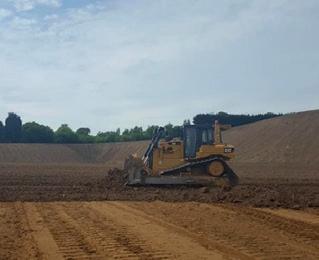

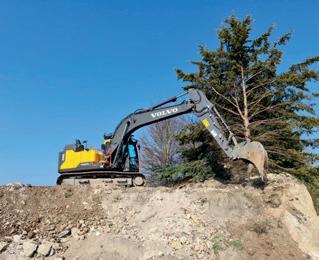
Looking forward to 2023, Pat said that with the industry going through a great deal of change, Watling Tyres had ambitions to be a “key partner” with farmers and growers as the country moved towards providing more of its own food.
Watling Tyres will be exhibiting at Farm Expo, where Pat said the team was looking forward to meeting customers old and new.
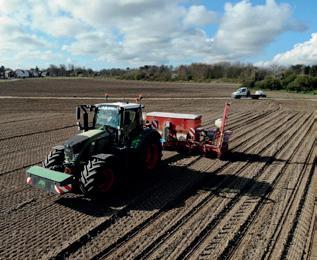
WWW.SOUTHEASTFARMER.NET | FEBRUARY 2023 35 TO ADVERTISE CALL 01303 233883
1 MARCH 2023 www.gjelgarconstruction.co.uk For more information contact us: t: 01233 623739 m: 07860 414227 e: office@gjelgarconstruction.co.uk • Steel frame buildings • Sheeting and cladding • Guttering and repairs • Groundworks and drainage • Demolition and asbestos removal • Refurbishment and change of use • Concrete frame and steel frame repairs • Insurance and general repairs • Concrete floor and block paving G. J. ELGAR CONSTRUCTION Ltd CONTACT Porlock Collingwood Road, St. Margarets at Cliff, Dover, Kent CT15 6EX Neil Morgan 07860 510300 Office/Fax: 01304 853289 Email: rhinoplant43@gmail.com www.rhinoplanthire.co.uk Self propelled forage harvester – Maize & grass Muck Spreading with high capacity equipment Hedge cutting River weed cutting & de-silting machinery Low loader service STG02 category Silage & hay making equipment Drilling & cultivation works Tele-handler & skid steer hire 360 Excavator & bulldozer hire Bale wrapping – square or round Big square & round baling PLANT & AGRICULTURAL CONTRACTORS RHINO AGRICULTURAL SERVICES Celebrating 30 years in 2023
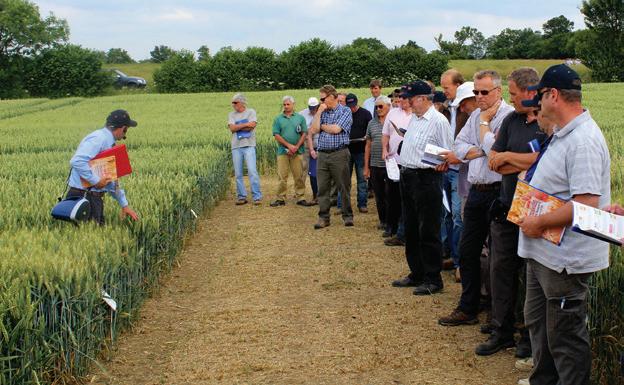
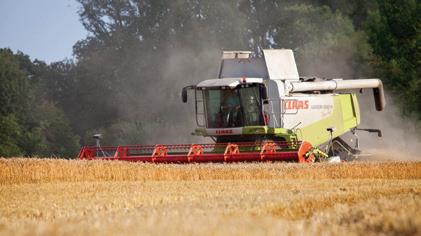
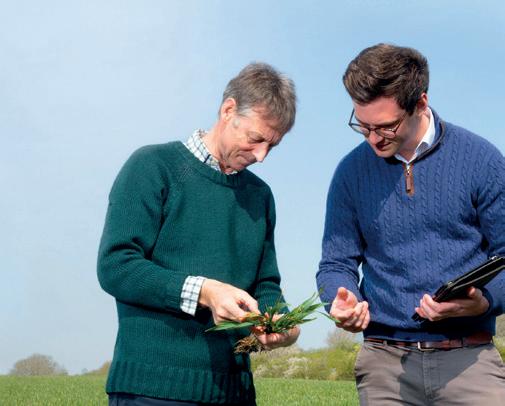
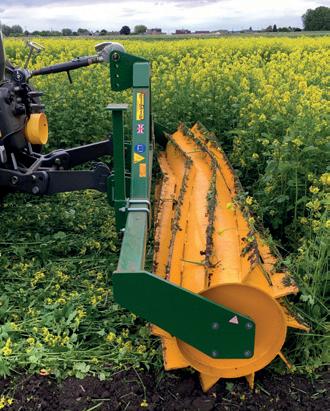
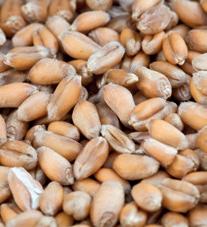
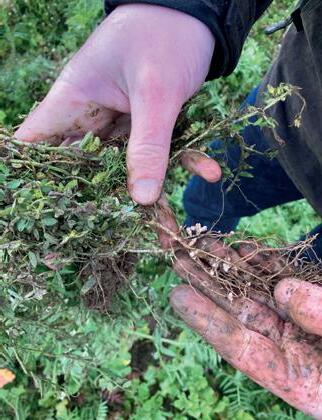
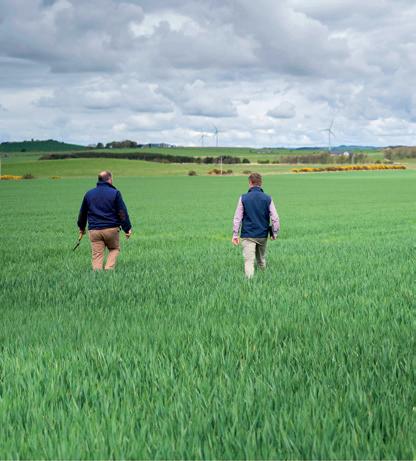
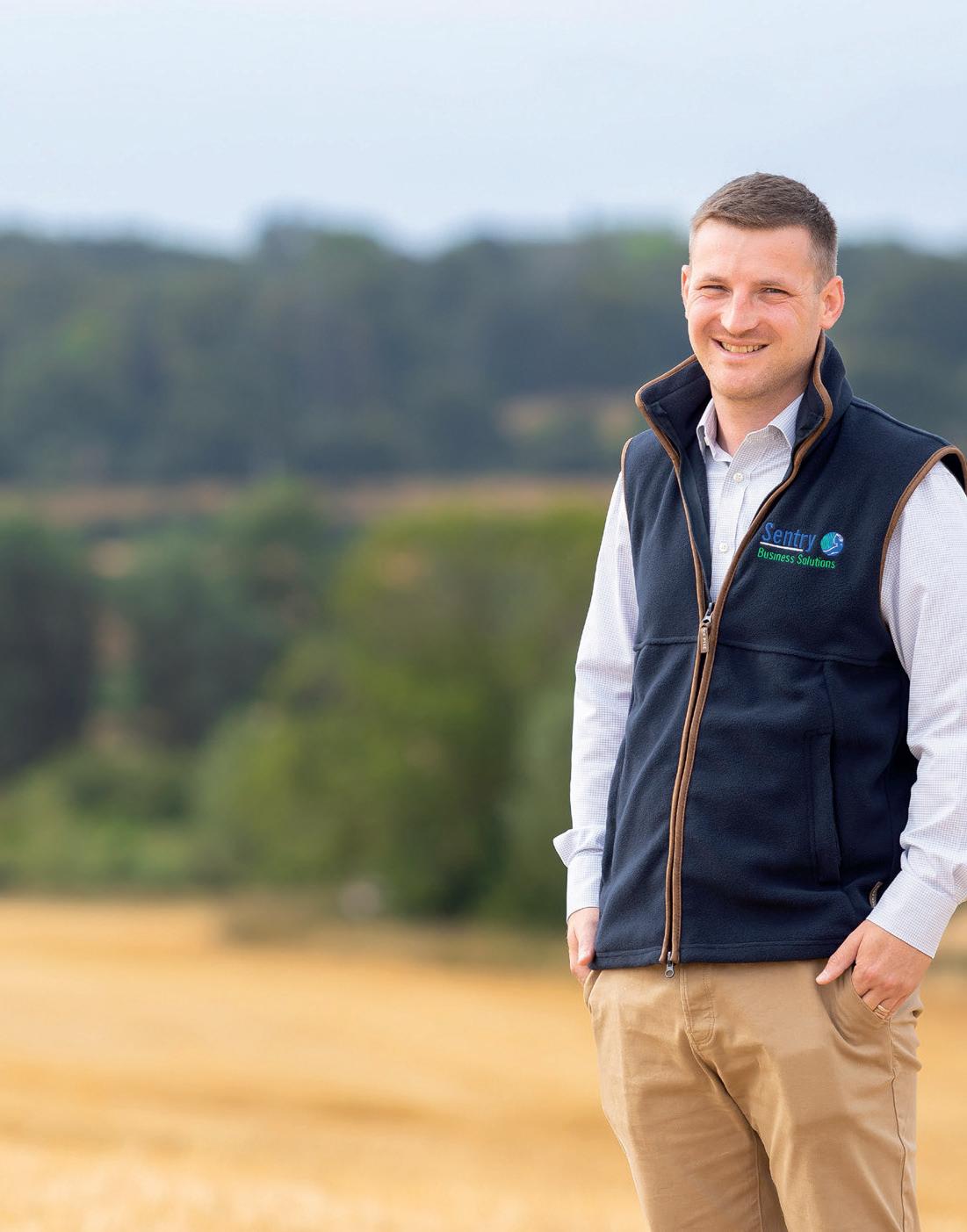














































































































































































































































































































































































































































































































































































FEBRUARY 2023 | WWW.SOUTHEASTFARMER.NET 36 @Hutchinsons_Ag HLHutchinsons Talk to us and see the difference for yourself! Providing specialist agronomic advice, services and inputs nationwide. You have a question? Hutchinsons has the answer! • Soil health strategy • Digital farming solutions • Environmental stewardship advice • Agroecology advice • Farm business consultancy • Seed and nutrition planning • Product supply • Carbon measurement and planning • A comprehensive range of packaging for the fresh produce industry. Your local depot: Canterbury Business Park Highland Court Farm Cold Harbour Lane Bridge • Canterbury • CT4 5HW t: 01227 830064 e: canterbury@hlhltd.co.uk www.hlhltd.co.uk Working with growers for over 80 years VISIT US AT FARM EXPO 2023 21876HUT-Farm_Expo_Ads(93x133).indd 1 16/01/2023 10:19 Delivering Rural Advice and Product Supply 01473 812015 sbs@sentry.co.uk Follow @SentryLtd Follow Sentry Ltd GRANT FUNDED FREE BUSINESS ADVICE Helping provide the Pathway to your Profitability WHOLE FARM BUSINESS REVIEW Fully funded day of one-to-one farm business consultancy, providing a business review, tailored advice, action plan, relevant signposting and support. Further advice ranging from carbon audits and reports, succession advice, budgets, cashflows, business plans or diversification advice to name a few. GROW YOUR BUSINESS WITH US. Reach your target audience in 2023 by advertising your products/services in our popular titles. Book now by calling Jamie on 01303 233883 or email jamie.mcgrorty@kelsey.co.uk JANUARY 2023 K L Y m e d a K L Y m e d a E L m d m d MARCH 2023 Ba Size0.62’–6’3” –1.9m See inside front cover YOU ARE INVITED TO HAYNES NEWBURY OPEN DAY Date: 19th January 2023 Address: Ridgeway Works, Ball Pit Road, East Ilsley, Berkshire RG20 7DJ Winchester Newbury Horsham Wrotham Uckfield LAND & PROPERTY CONSULTANTS Expert advice for viticulture: Site-finding Planning applications schemes grants on Matthew Berryman INSIDE Event buzzing with enthusiasm Keeping ahead of the game Sampling English wine The Grange Winery in Hampshire is a place where past, present and future are inextricably linked. JANUARY Past, present and future business & estate management Planning & development grants Land Viticulture net gain Ecology Residential and commercial management www.c-l-m.co.uk Farm business consultants with our roots in the South East Full review begins on page 16 NEW YEAR, NEW OPPORTUNITIES FARM CONSTRUCTION Investment in new infrastructure must balance cost and value CATTLE SHOW REVIEWS THE INDUSTRY COMES TOGETHER TO TACKLE ABATTOIR CAPACITY ISSUES VISIT US: www.southeastfarmer.net | www.farmmachinery.co.uk | www.vineyardmagazine.co.uk
DESIGNED WITH ECONOMICAL ORCHARD MANAGEMENT IN MIND
On its stand at Farm Expo this year, NP Seymour, the UK’s leading specialist in new and used tractors and machinery for fruit, hop and vine growers, will be displaying a dual-purpose orchard trimmer from BMV which can be used to control growth and promote heavier cropping in new fruit wall systems.
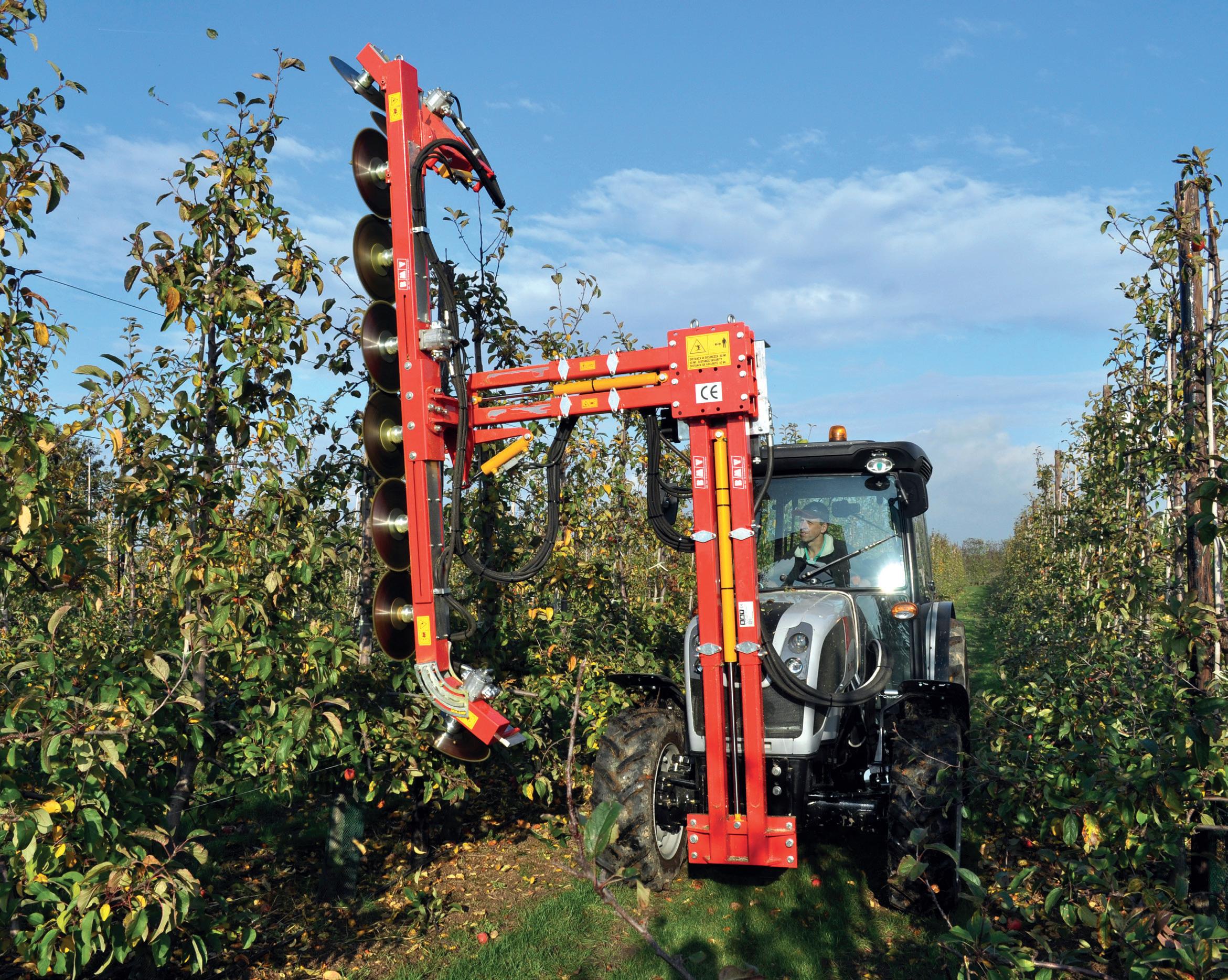
Designed with economical orchard management in mind, the BMV FL800 PC can be equipped with saw blades in the winter for mechanical pruning and then with knives in the summer for trimming and cutting green wood.
Mounted on the front of a new Gen 3 Fendt 210F, the FL800 PC from BMV features one lower, seven middle and two top 400mm saw blades. The bottom blade can work either vertically or at any angle up to 90 degrees. Equally, the top cutting bar can work both vertically and horizontally, and on the PC model, operators can also adjust the proximity of the two top disks. While NP Seymour also stocks and supplies other brands of mechanical pruners and trimmers, the BMV has been selected as it has been praised recently by growers for its multipurpose capabilities.
“The BMV FL800 PC can even be used for cutting hedges and windbreaks up to 4.5 metres tall around the orchard,” said Claire Seymour, sales and marketing director at NP Seymour.
“With the economy the way it is at the moment, everyone is looking to get more for less. Investing in orchard and vineyard machinery is no different, and so we are always looking for ways to provide growers with quality products which suit budgets and can also be used to tackle more than one job on the farm.”
Visit the NP Seymour team on Stand 242.
WWW.SOUTHEASTFARMER.NET | FEBRUARY 2023 37 TO ADVERTISE CALL 01303 233883 FARM EXPO 2023 PREVIEW
CUT THE COSTS OF MAIZE ESTABLISHMENT

With costs uppermost in most farmers’ minds at the moment, Rhino Plant will be unveiling a cost-saving striptill implement that promises to cut the costs of maize establishment at this year’s Farm Expo.
The Carre eight-row striptill machine is the number one seller in Europe, where the practice is more widespread than it is currently in the UK.
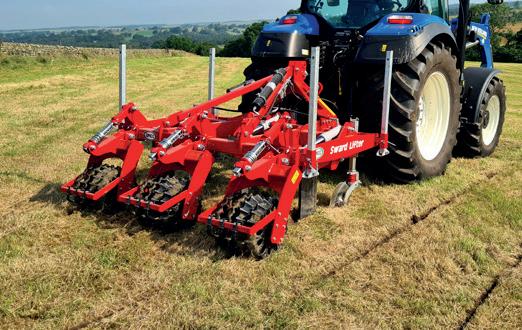
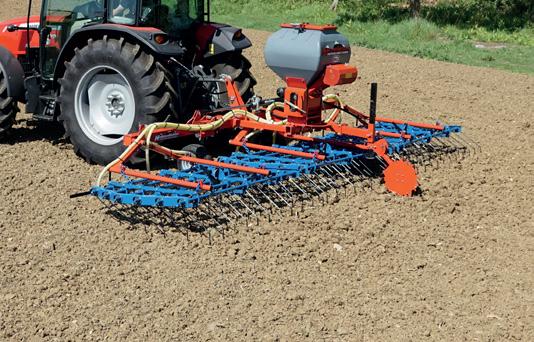


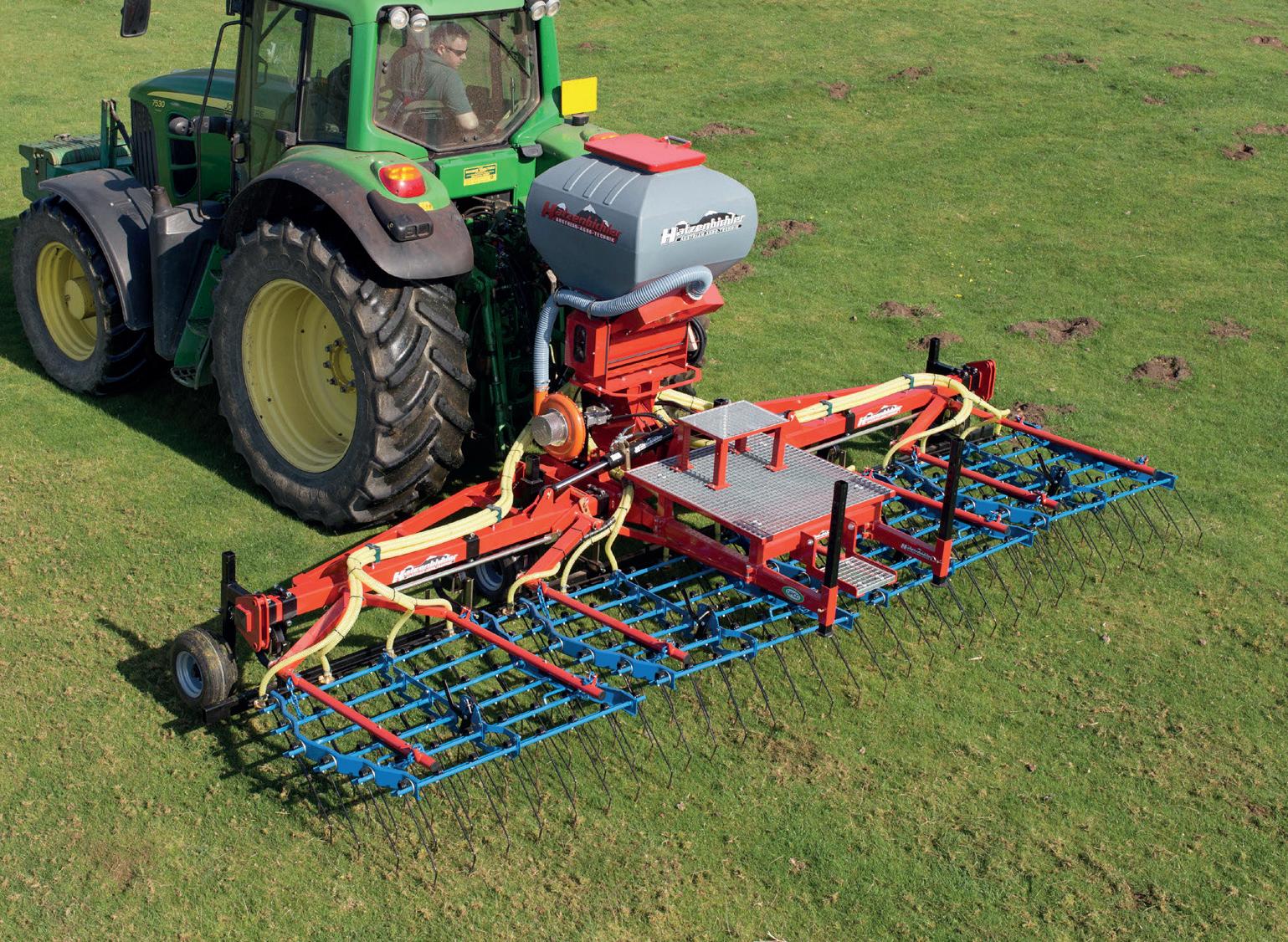
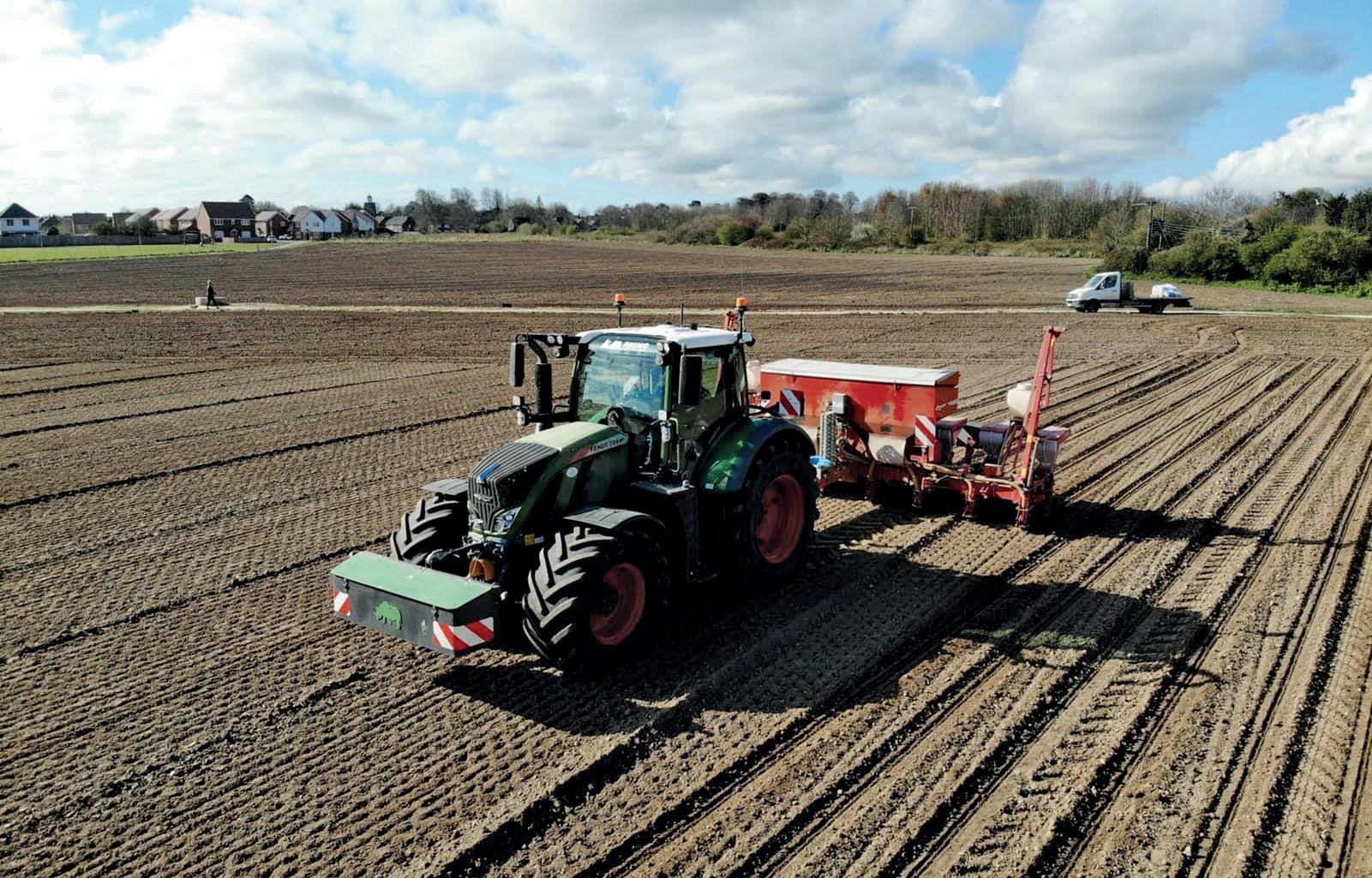
“The practice is big in Europe and we think it will soon be big here as farmers realise the savings it offers,” explained Rhino Plant boss Neil Morgan. “By only cultivating the strip you are planting, rather than the whole field, you significantly cut energy costs.”

Rhino Plant, which has established an impressive customer base over the past 30 years, is the first contractor in the South East to make the Carre available to farmers across Kent. “Every item on the machine can be adjusted, allowing it to be used on all types and conditions of soil,” said Neil.

Rhino Plant, which has 12 full-time operators, offers general agricultural contracting including forage harvesting and prides itself on delivering a friendly, reliable service at a competitive price.









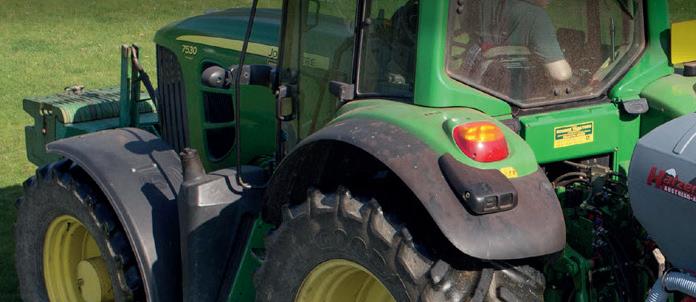
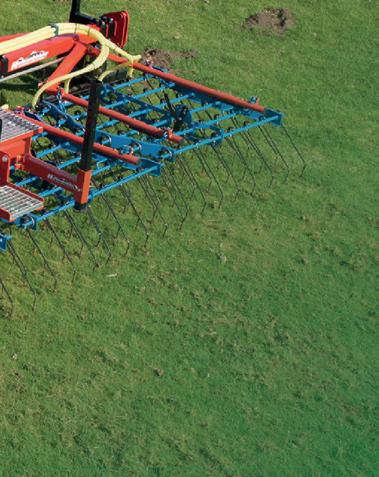


It runs a fleet of mainly John Deere tractors, JCB, Volvo and Caterpillar excavators, a Claas forage harvester and a range of other equipment, including a new JCB loading shovel. Long-term clients include Wessex Archaeology, the Environment Agency and drainage boards.

Look out for a special feature on Rhino Plant’s 30-year anniversary in the March edition of South East Farmer.

FEBRUARY 2023 | WWW.SOUTHEASTFARMER.NET 38 FARM EXPO 2023
Well managed grassland
productivity
conditioning
over-seeding or reseeding
achieve greater yields from grassland Correct usage of OPICO’s range of grassland maintenance and improvement machinery will • Harrow & Seeder - improve and maintain grass quality • Grass Master - a harrow and seeder designed for large scale farm rs Sward Lifter - impr , drainage and aeration OPICO Ltd. 01778 421111 ask @opico.co.uk opico.co.uk
is essential for maximising
Soil
as well as
will help
Profit from our kn owledge R EV I TALIS E Y O U R GR ASS L A N D Grass Master Scan from your mobile SCAN ME SWARD LIFTER HARROW & SEEDER R WC R AW F O R D CO .U K A G WOO D. CO .U K STOCK AVAILABLE FOR IMMEDIATE DELIVERY Untitled-2 1 25/01/2023 20:32:23
#MoreFromGrass
KNOWLEDGE AND EXPERIENCE

Graham Elgar makes no secret of the fact that he would have enjoyed a career in farming, but as the boss of G J Elgar Construction he has been able to combine his love of the industry with his knowledge of building.
That combination allows the farming community to benefit from practical building knowledge and quality workmanship rooted in a love of the industry and the people in it.
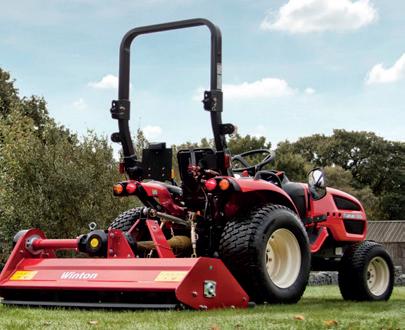
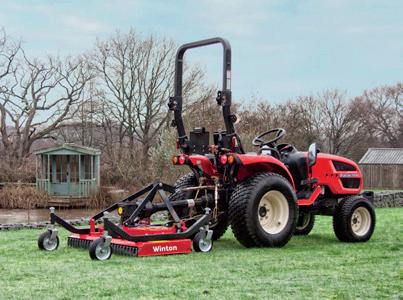
Graham’s knowledge and experience is particularly valuable when assessing the change of use potential of redundant farm buildings to industrial units or looking for alternative income streams.
“You need experience to be able to look at a building and know what will work best in that space,” he said.

Ashford, Kent-based G J Elgar has grown strongly over the years and now employs 38 people, delivering a comprehensive range



of building services, from turnkey newbuild projects to conversions, extensions and groundworks.


Working across Kent, Surrey, Sussex, Essex and Hampshire on both agricultural and industrial projects, the company specialises in steel-framed buildings and groundworks as well as offering demolition services, asbestos fibre cement removal and
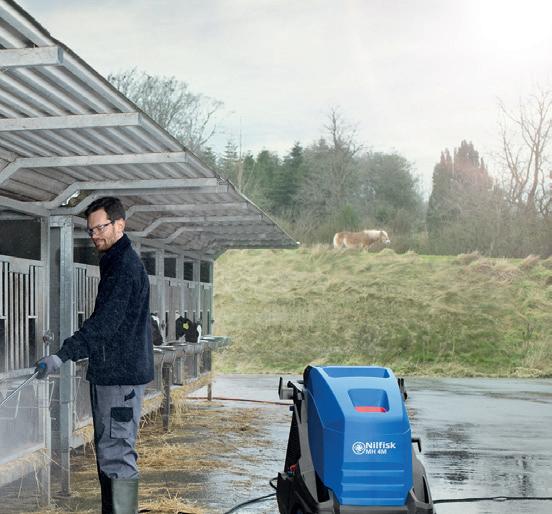
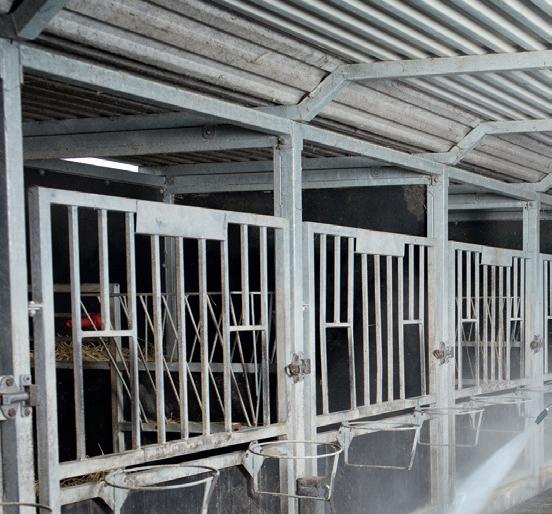



disposal and a health and safety-compliant scaffolding service.
The company’s comprehensive service includes planning, structural calculations, contract management and health and safety consultancy, while the regularly upgraded plant includes excavators, rollers, dumpers, Genie booms, scissor lifts and high-reach forklifts.
WWW.SOUTHEASTFARMER.NET | FEBRUARY 2023 39 TO ADVERTISE CALL 01303 233883
1 MARCH 2023 SALES AND SERVICE M A BROWN & SONS LTD & M&A Brown & Sons Ltd, Iden Green Farm, Cranbrook Road, Goudhurst, Kent TN17 2PA info@mabg.co.uk 01580 211599 www.mabg.co.uk Comprehensive range of professional tractors from 19hp to 75hp WORLD CLASS POWER TOOLS Come and see us on stand 174 Stand 200 We are a leading supplier and an approved repair centre With 50 years trading in the cleaning industry. With our strong ties and long term relationship with the leading manufacturers 01825 705777 Unit 4, 72 Bell Lane Uckfield, East Sussex TN22 1QL enquiries@pressureclean.co.uk SALES SERVICE HIRE
SIGN UP FOR YOUR PERSONALISED FARM BUSINESS REVIEW
Sentry is offering a fully funded day of one-to-one farm business consultancy with its expert team.

The offer reflects the fact that it is more important than ever for farming businesses to gain independent advice and consultancy support.
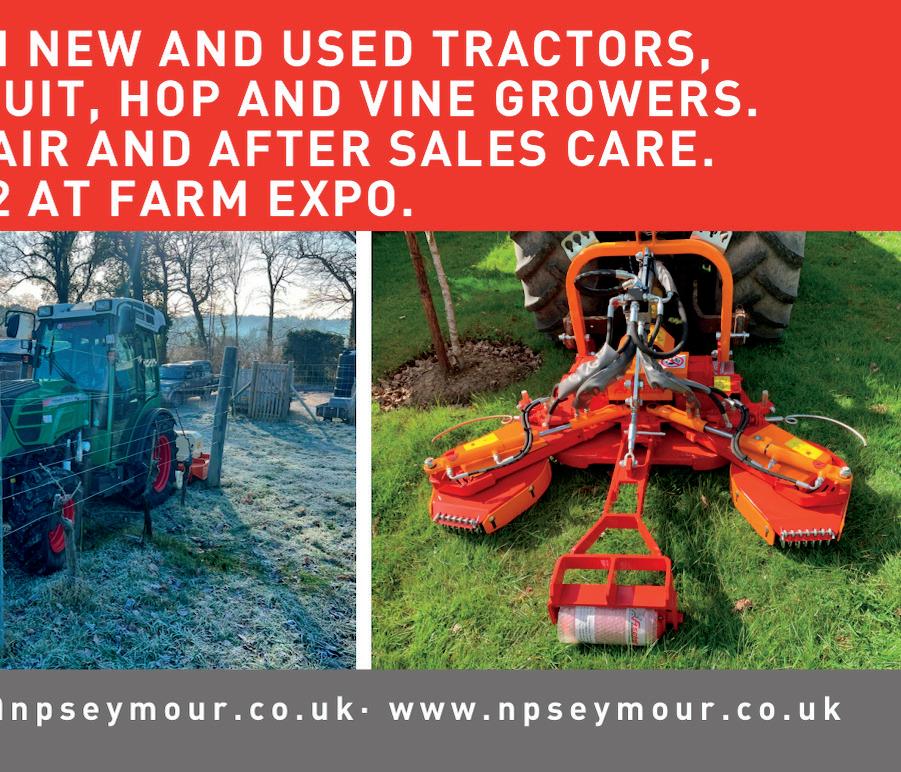
The personalised farm business review, funded through DEFRA’s grant business advice scheme, The Future Farming Resilience Fund, will focus on achieving increased profitability. It will also establish
an action plan to help businesses transition away from government support.


Sentry takes a hands-on approach and can advise on the full spectrum of services for rural businesses, including carbon audits and reports, succession advice, budgets, cashflows, business plans and diversification advice.
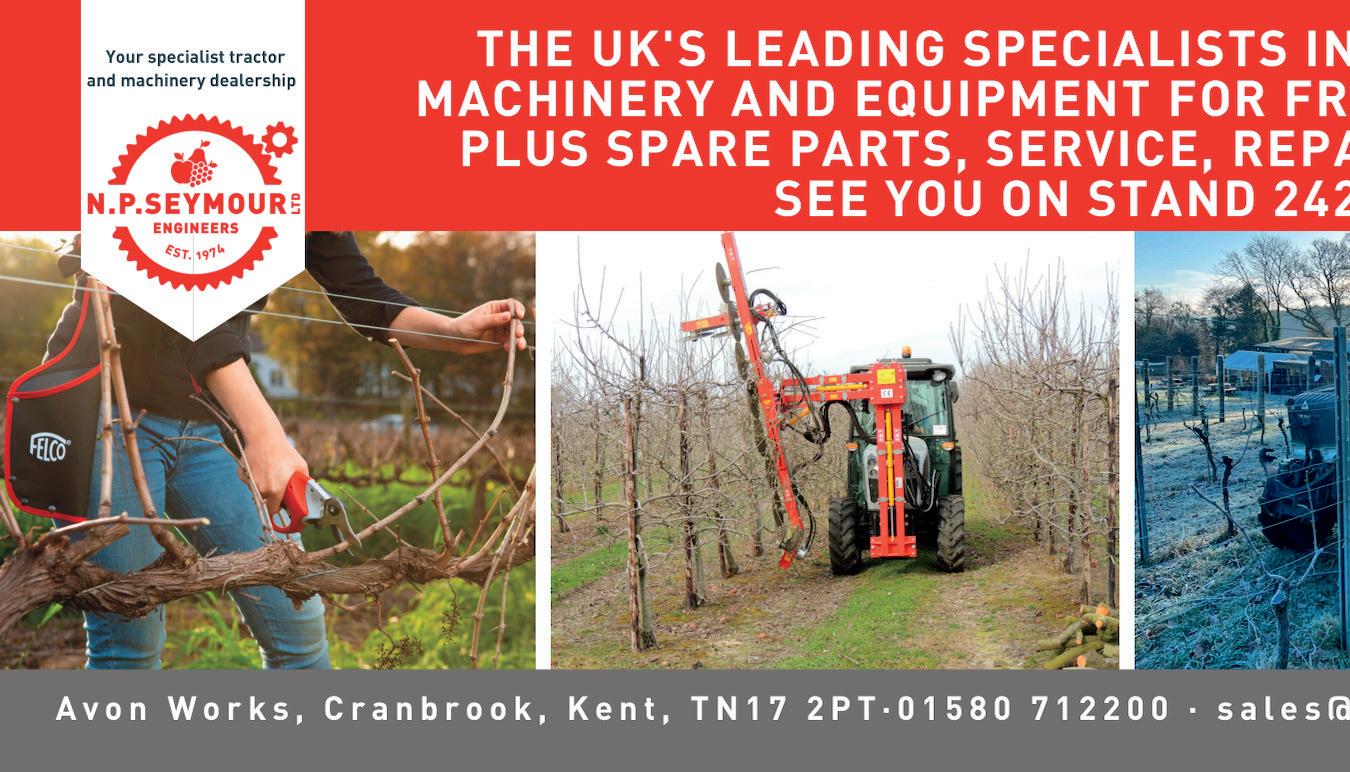
Get in touch to book your fully funded personalised farm business review by emailing SBS@sentry.co.uk or calling 01473 812015.

FEBRUARY 2023 | WWW.SOUTHEASTFARMER.NET 40 FARM EXPO 2023 PREVIEW
OF






















Visitors to Farm Expo on Wednesday 1 March will be able to talk to a range of specialist suppliers, including Mitsubishi and SsangYong dealer Humphries and Parks.


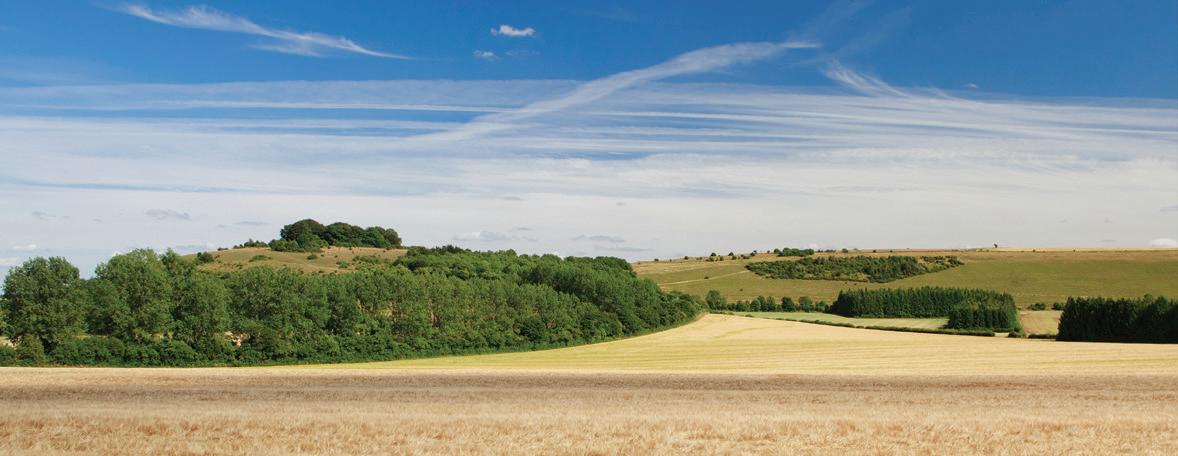

The family-owned business is proud to serve the community both around its base in West Malling and all across Kent. Marcus Joy of Auto-Joy, owner and managing director, works alongside his three sons and a professional management team to deliver the best customer experience possible using good, old fashioned honest, friendly service in all areas of new and used vehicle sales, vehicle servicing and parts supply.

The business is four times the size it was when he purchased it in 2012 and was awarded Auto Trader magazine’s Customer








Experience Retailer of the Year award for 2022, being selected from amongst 13,500 subscribing trade businesses.

Humphries and Parks will be showing the Korean-manufactured SsangYong Musso 4x4 pick up, named 4x4 Truck of the Year 2022/3 in both 4x4 Buyer and Car Buyer magazines.
This robust vehicle comes with a five-year warranty and is attractively priced at £32,915 +VAT for the top model, the Saracen, which comes with all the usual extras including heated and cooled seats for all weather use.
Supply is good, with most models available within six to eight weeks of order.


















The dealer always carries a stock of at least 15 4x4 used pick ups of all brands on the Humphries and Parks 100+ car forecourt on the A20 at West Malling.



WWW.SOUTHEASTFARMER.NET | FEBRUARY 2023 41 TO ADVERTISE CALL 01303 233883
RANGE
SPECIALIST SUPPLIERS 1 MARCH 2023 COPPERWHEAT BARLOW It’s time consuming, It’s pressure driven, It’s all the same... But not any more! Agricultural and Contracting Insurance For YOUR free no obligation quotation, contact: • 01795 842479 • info@ copperwheatbarlow.co.uk • @Copper_W_Barlow • www.copperwheatbarlow.co.uk New Contractor’s Insurance package now available ruralmortgages.co.uk 0800 781 0639 rob@randbs.co.uk Competitive finance for farms and rural businesses
LOOKING CLOSELY AT BUDGETS
There are two ways of cutting costs when it comes to investing in agricultural cleaning equipment, and Uckfield-based Pressure Clean can help farming businesses with both of them.

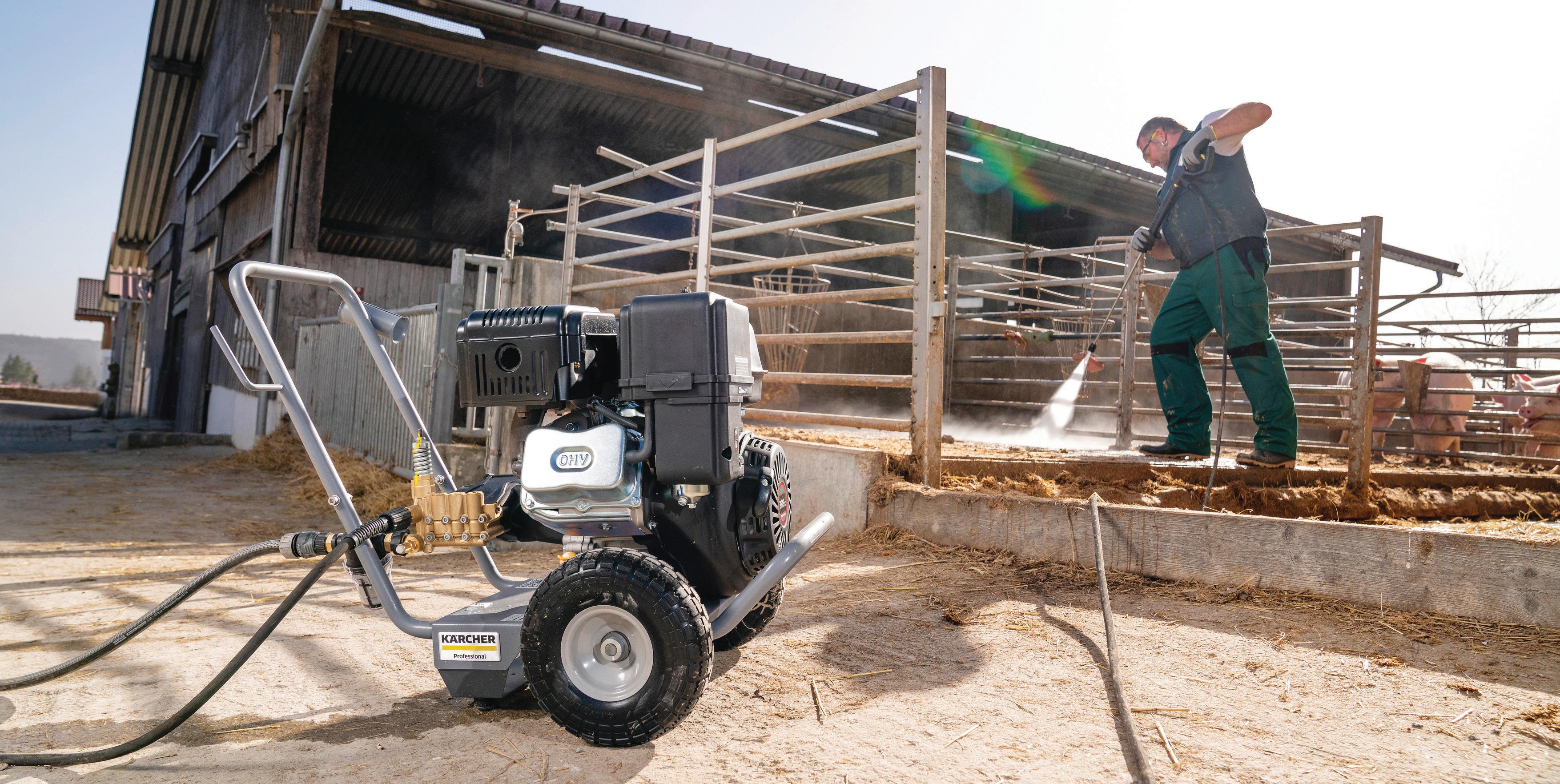
Not only can the long-established business provide expert servicing to keep existing pressure washers and other cleaning equipment performing at its best for as long as possible, but it can also supply new machines that offer particularly good value.

“We know that farmers and growers are looking closely at budgets at the moment, and price is increasingly being brought up in conversations around replacement cleaning equipment,” said Gary Fielding, who runs the well-respected business with wife Donna.
“That’s why we have looked carefully at what’s out there and have found new machines that offer the same quality and performance as established models but at a more affordable price.”
Those machines include the Karcher Classic range and Nilfisk’s Viper brand, both of which offer slightly less sophisticated equipment that
nonetheless benefits from the build quality and reliability associated with these top name brands.



Viper’s ROS1300 ride on sweeper, which sums itself up as “simple, rugged and affordable”, is a case in point and has proved to be an ideal solution for cleaning potato sheds and grain stores.
Viper claims the low maintenance model is “designed for optimum productivity”, with long battery run time and just one button to start the main broom, side brooms and vacuum fan.
“What’s particularly impressive is that as well as being a lower cost option than many other machines, Viper has included many of the features that are often priced as extras, including two side brushes. It really does offer great value at a time when value is more important than ever,” commented Gary.
Karcher’s Classic range of pressure washers features a number of smaller, cold water machines that bridge the gap between domestic washers and commercial equipment at an entry level price point. “When
FEBRUARY 2023 | WWW.SOUTHEASTFARMER.NET 42 PRESSURE WASHERS
Pressure Clean Ltd Unit 4, 72 Bell Lane, Uckfield, TN22 1QL Tel: 0800 212328 www.pressureclean.co.uk
you need to upgrade from a domestic machine while keeping an eye on the budget, the Classic range is ideal,” Gary said.





The HD 4/10 X Classic boasts a ten-metre integrated high pressure industrial hose, an operating pressure of 100 bar and a flow rate of 400 litres an hour. With automatic pressure relief, a retractable handle and robust wheels, it’s an ideal entry level machine, while the brass pump head is a reassuring upgrade over a domestic pressure washer.
Karcher also offers a range of petrol-driven, cold water-filled Classic pressure washers that can be filled either from a hose or by using suction from a tank or other water supply. The range runs from the HD 6/15 G Classic, with an operating pressure of 150 bar and a flow rate of 600 litres/hr through to the HD 9/25 G Classic, which has a working pressure of 250 bar and a flow rate of 900 litres/hr.

Every model in the range benefits from outstanding mobility, an ergonomic design, a robust tubular steel frame and the flexibility offered by a petrol-driven machine.



One range that has proved Increasingly popular recently, especially amongst those for whom red diesel is no longer an option, is the MAC International Plantmaster line-up of electrically heated static pressure washers.




The Plantmaster range can live outside in a lagged, stainless steel tank, which keeps frost at bay and allows quick and easy ‘drive up and turn on’ operation. They offer particularly good value for farmers and growers with access to their own solar PV-generated electricity. Emission free, always a bonus for those looking to enhance their environmental credentials, the three-phase electric machines with electrically heated water tanks have a working pressure of between 160 and 200 bar, depending on the model, and a flow rate of between 780 and 1,100 litres/hr.
For those whose goal is to keep their existing machines going for as long as possible or make sure new equipment enjoys a long and productive life, Pressure Clean has a highly trained and responsive team of engineers out on the road as well as a busy in-house engineer at the company’s showroom and parts department on the Bell Brook Industrial Estate in Uckfield.
“A lot of farmers and growers are looking to maintain their equipment better these days because it makes economic sense,” said Gary. “And we have a skilled team that can do that cost effectively.
“We are also finding our service agreements are popular at the moment as it means owners can relax in the knowledge that maintenance and repairs are covered for a known, fixed sum.” Pressure Clean will be displaying a range of cleaning equipment on its stand at the Farm Expo event being organised by Kent County Agricultural Society at the Kent Showground on Wednesday 1 March.

WWW.SOUTHEASTFARMER.NET | FEBRUARY 2023 43 TO ADVERTISE CALL 01303 233883 FEATURED COMPANY:
FOR MORE INFORMATION CONTACT US TODAY Powerful, robust, optimal cleaning efficiency What you need to get the job done. Tel: 0800 212328 www.pressureclean.co.uk CASHBACK £150 UP TO T&Cs apply Pressure Clean Ltd Unit 4, 72 Bell Lane, Uckfield, TN22 1QL SHOW OFFER AT FARM EXPO ON THE DAY KARCHER HD 4/10 X CLASSIC £249 +VAT NILFISK MH3C 90/670X £2,049 +VAT
ELVED PHILLIPS ARABLE NOTES








TRADERS CAN BACK FILL SOME OF THEIR TENDER BUSINESS WITH UK WHEAT
We are now officially back to pre-Russian war prices! So it’s a case of war, what war?
The main residual factor is the ‘grain corridor’ in the Black Sea. This should remain open until March. So far it’s been successful in enabling the cheap Ukrainian and Russian grain to be exported to the world, but it’s not helped the price evolution in the market place.
There are plenty of big tenders for wheat to all the usual suspects and they are priced against the Black Sea, still the cheapest origin in the world. However, in most cases the big global trading houses that regularly take this business onto their books are then turning to the UK as the next cheapest source of wheat to lay off some of their execution risk.
While it’s more expensive than Black Sea, it means these traders can back fill some of their tender business with UK wheat, as it’s guaranteed to be available to ship anyway and there are no surcharges for marine insurance. Also, some of the tender business will be for shipment beyond March. Russia could still close the corridor again in March, so having wheat purchased from the UK for April, May and June is a good insurance against Russia taking this action. So, while this demand continues we still have aspirations of getting through our wheat surplus before harvest, to provide a boost to price in later months. No one accurately knows how much
Ukrainian wheat has been exported or how much is left. They, like some other exporters, could well be down to bare boards well before harvest. The USDA stock report in January was almost ‘bullish’ for a change. They conceded that three years of average at best world wheat crops have eroded stocks, with maize, wheat and soya all being less than expected.
For instance, world maize stocks, if you exclude China (which would never make any surplus available to the West) amount to only 31 days of demand. That is dangerously low by any standard. The low wheat stock was partially offset by the bigger than expected crop in Australia, but irrespective of its crop size Australia does not have the export infrastructure or additional capacity to export more than it usually does.
The USDA did return to type by ignoring the much speculated about production issues in South America. At the very least this will mean lower carry out stocks at the end of the season.
The next major factor is the massive positions that the big hedge funds have taken in the Chicago futures. They have built up short positions on wheat and long positions in maize which amount to millions of tonnes of futures contracts. Recently the trend has been to crystalise their position to being more short of wheat on all international futures markets. One day they will have to buy back that short position and some think that market has already bottomed out. So, if their position squaring happens to coincide with something like Russia deciding not to re-open the grain corridor, there would be fireworks.
It seems that over half of the wheat allowed
out via the grain corridor has ended up in Europe and Turkey. This has not pleased President Putin.



New crop prices have followed the old crop prices down. They are now at levels which can only be justified if world wheat production rebounds to levels not seen for four years.
The Argentine drought is the worst for 60 years and this will impact their old crop stocks and new crop prospects. Apart from not knowing how much old crop is left in Ukraine, we have no idea what they have been able to plant in the winter, or will in the spring, but it must be less than last year. There have been temperatures of minus 25 degrees in Ukraine and Russia, with no snow cover, so some winter kill is certain.
As long as the UK is able to continue its pace of wheat export sales, we should clear our surplus in the next six months. It will be seven months before any new crop wheat is available.
At last China is showing signs of recovery, as its pork consumption is at a two-year high. There are enough latent bullish possibilities to justify holding onto wheat at least until Easter. Milling premiums are higher by up to £65 per tonne and so, as I have said many times, there is no excuse for not selling milling wheat, especially if you have other commodities unsold.
Winston Churchill said: “The inherent vice of capitalism is the unequal sharing of blessings. The inherent vice of socialism is the equal sharing of miseries”. The people of Russia, and unfortunately Ukraine, are certainly sharing plenty of misery just now.
FEBRUARY 2023 | WWW.SOUTHEASTFARMER.NET 44
GRAIN STORAGE FERTILISER SEED T: 01264 321 595 www.openfield.co.uk
ELVED PHILLIPS Openfield
WORRIED ABOUT MY FINANCIAL FUTURE
Invited to talk to a group of farmers last month, I delivered a prediction of how I expect farm policy in England to develop postBrexit. I said that I foresaw food import tariffs being gradually lowered as the Government in Westminster, now free of the EU, reverted to a traditional cheap-food, free-trade policy.
It seems I might not be the only arable farmer worried about my financial future, even with grain prices quite high at the moment. Even before I got up to speak a land agent at the meeting had told me that the rental market for grade three arable land in Kent was showing signs of unravelling. Indeed, he forecast that rents on short-term arable farm business tenancies (FBTs) might soon settle back to £50 per acre on the poorer soils.
Gloomy as I am, even I was a little shaken by that news. But he was quite adamant that, even with feed wheat prices currently at £250 per tonne, profits on poor arable land are currently under intense pressure due to inflation in input prices, and that very low rental bids were coming in for some farms.
He and I agreed that an important reason why rents might have to fall heavily on grade three arable land was the erosion of Basic Payments. Cuts really start to bite this year and, even after Sustainable Farming Incentive (SFI) payments were improved slightly after a DEFRA review last month, they do not look like they will do much to replace the loss of the BPS. Without the BPS, the only meaningful source of income from arable land will be the value of crops produced. On poorer land where costs are generally higher and yields lower, the economic implications are clear.
But I was not speaking to a group of farmers entirely made up of arable farmers on poor quality land. Indeed, it soon became apparent that at least one member of my audience farmed very good quality land indeed.
No sooner had I sat down after delivering my gloomy analysis than he robustly pointed out that I was talking ‘tosh’. Of course, he said, there were always ‘risks’ with everything, but farming was doing just fine and I should acknowledge it.
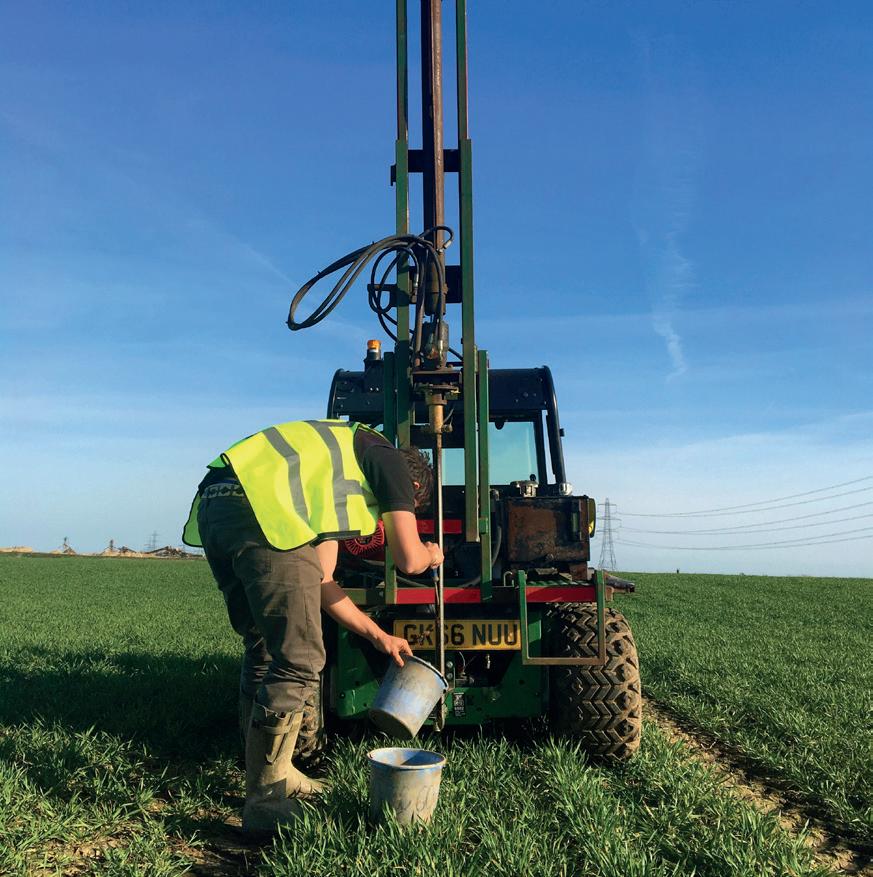
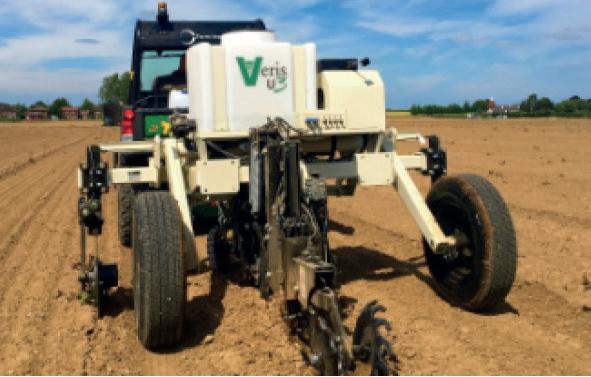
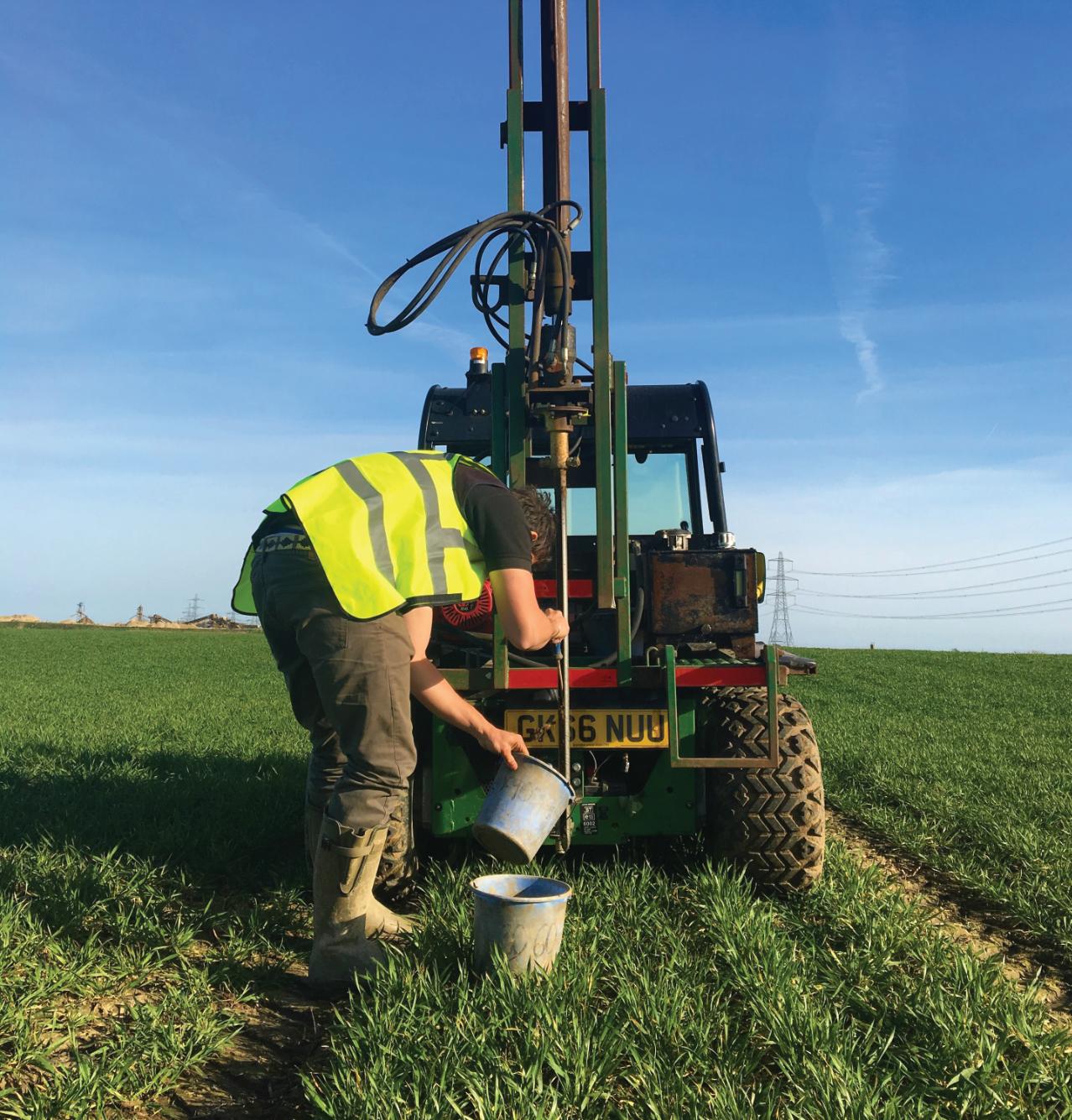





We soon settled our differences on the basis that while arable farmers like him were always likely to earn a good living (provided their rent or bank borrowings were not too high) farmers like me, on marginal land, might struggle to make ends meet.
I’m not sure my speech was particularly enlightening for my audience, but I came away from the meeting greatly educated. A very considerable divergence in arable farm rents between the best and worst land is already underway.
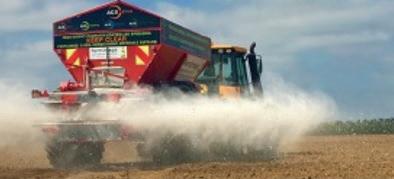
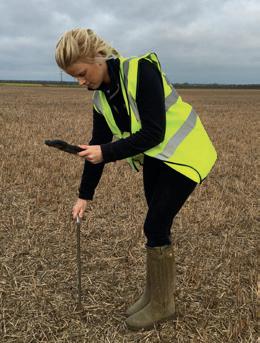
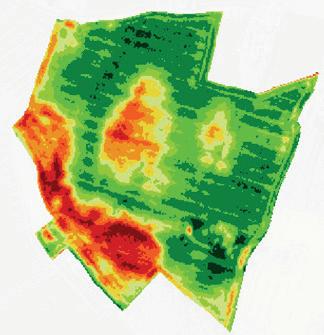
•

WWW.SOUTHEASTFARMER.NET | FEBRUARY 2023 45 TO ADVERTISE CALL 01303 233883 STEPHEN CARR
productssupplied, andspreadtoyourfarm. Offering20years’experience insoil servicestailoredforyouand yourbusiness Soilsmartsampling,GPSprecision, Verissoilscanning,NCore,Ph,PCN 01233 740247 enquiries@farmimage.co.uk www.farmimage.co.uk
Soil Scanning
High definition in-field scanning of
field properties including pH,
Matter, Electrical Conductivity and Topography
STEPHEN CARR Arable farmer
• Ultimate
–
major
Organic
Precision Soil Sampling and Mapping
Imagery
• Biomass
Soil Sampling –
pH
Cyst Nematode Analysis (PCN)
Nitrogen Sampling
Slurry and Product Analysis
supply and variable
application
• Standard
P, K, Mg and
• Potato/Pea
• Deep Core
• Manure,
• Lime
rate
READY FOR A BUSY SEASON
Family life has returned to some sort of normality, or should I say as normal as it gets in our rather manic household. Fergus, aka Mr Fixit, has returned from his travels and is back on the farm with a bang. A very long list of equipment purchases has been seen on his desk.
Judging by the running commentary since his return he has had the most amazing time and has come home with renewed vigour and new ideas. Let’s hope the bank balance can keep up. Mr Grumpy has now resumed his normal stance now his right-hand man has returned.

Trail hunting will be coming to the end of its season soon and so the eventing season will begin. The horses are all fit and ready to go. Ted received a miniature Shetland pony for Christmas which he has named Duck. Duck seems to be more like a dog and follows him everywhere, including inside the house. Any ideas for toilet training would be welcome. I’m
sure the dogs won’t mind sharing their bed!
Later this month the arable side of the farm will start moving forward at a rate of knots, spraying will be in full flow and fertiliser will not be too far off being applied. For now, the yards have all been cleaned out and the slurry tanker has been serviced and is ready for a busy season. The crops seem to have fared well in this rather wet and sporadically cold winter. We look forward to starting silage making at the end of April if the weather is kind to us.
I was reading with interest the other night an article that was explaining that the average daily temperature for 2022 was lower than in previous years. Scientists are now predicting a mini-ice age in 2030.




Using the sun’s activity, solar researchers estimate that in the 2030s the movements of two waves of fluids will lead to a 60% reduction in solar activity. The decline in the northern hemisphere temperatures will be similar to the freezing conditions seen in





western Europe during the late 17th century. During that time, now known as the “the little ice age”, the Thames froze over for several weeks, which it hasn’t done since. I am sure the debate will continue in our house for weeks over this prospect and whether or not it will occur.
I was sad to read that in the recent cold spell, when all his pipes were frozen, a farmer in South Wales had transported water to his suckler cows in an IBC that had contained AdBlu in a previous life. He had thoroughly rinsed the container before using, but found all his cows dead upon arrival the following morning.
At first electrocution was suspected but it transpires that the slight residue that was left in the container was enough to cause the cattle to have a fit and die within an hour. This is tragic for all concerned and a stark warning to us all to be extra vigilant when reusing containers.
FEBRUARY 2023 | WWW.SOUTHEASTFARMER.NET 46
ANITA HEAD ORGANISED CHAOS
ANITA HEAD Farmer
LIZZIE BATT

T: 07812 771622
E: Lizzie.batt@hlhltd.co.uk
Canterbury: 01227 830064 www.hlhltd.co.uk
A NEW RELATIONSHIP WITH NITROGEN
Firstly, the high cost of nitrogen (N) fertiliser has focused our attention on maximising the return on a major investment. Secondly, incoming legislation on urea-based fertiliser has highlighted risks associated with the use of urea as a fertiliser and, thirdly, there is a broader recognition that N fertilisers are the largest contributor to the carbon footprint of crops where N fertiliser is applied, providing further impetus to look at N differently in pursuit of mitigating climate change.
Finally, we have experienced a number of dry springs which have presented challenges in managing N applications to maintain crop uptake.
To start the 2023 season optimistically, we will look at ways of using organic manures, ammonium nitrate and urea fertilisers more efficiently this spring.
MAKING BETTER USE OF NITROGEN
This is not just about N fertilisers; the value of N in manures has also tripled. Such a valuable resource should be managed with that in mind. An average tonne of poultry manure is now worth more than £50 in available nutrients alone.
Applying manures accurately at the right time and minimising ammonia losses creates a win-win situation, since it means less additional N and a reduction in ammonia emissions.

The soil will typically supply around half the N required as cereals start growing again, but mineralisation of organic N is temperature and moisture dependant. It is unwise to rely on the soil supplying too much early N, especially if the soil temperature is below 5°C at rooting depth.
Ammonium nitrate supplies readily available nitrate N as well as slower release ammonium N. Urea once in soil solution will supply ammonium N. For those using urea for the first time, it is worth knowing that as urea must undergo chemical change to become plant available, it
is advisable to apply it earlier than you would ammonium nitrate. Once conditions allow, urea can be applied without any major risks attached. The best and most consistent results come from front-loading N applications.An application of 80kg once conditions allow helps to meet the early crop demand. Once winter cereals begin rapid growth they will need nearly 20kg of N per week to keep up with demand.
HOW DO YOU SOLVE A PROBLEM LIKE UREA?
Impending restrictions on the use of urea-based fertilisers mean that fertiliser used in the spring of 2024 will need to meet the new guidelines. Urease inhibitors are effective at reducing the risk of ammonia losses from urea. From 2024 these will need to be used from 1 April each year. If we experience warm dry conditions in March, there could still be significant N losses from urea.
For liquid N users it is simple to respond to the conditions and include an inhibitor if needed. It’s not so simple for granular urea, which needs to be protected before it is delivered. More people are opting for protected urea, with a urease inhibitor impregnated or applied to the fertiliser prior to bagging. Protected urea offers benefits in terms of performance over untreated urea; increased efficiency of N will inevitably reduce the amount of N needed to meet the optimum N supply.
The fact that legislation is telling us that urea can be inefficient gives us the opportunity to learn how to make it as effective as possible. This is important, given the reduction in the amount of ammonium nitrate that is available for the UK farmer.
The use of methylene urea products as a source of foliar N is a very effective way of maintaining N uptake through dry periods. Bypassing the soil and supplying a source of N that is safe and highly efficient offers further opportunities to rely less on conventional N fertilisers.
WWW.SOUTHEASTFARMER.NET | FEBRUARY 2023 47 TO ADVERTISE CALL 01303 233883
AGRONOMY
Lizzie Batt, Hutchinsons agronomist based out of Canterbury, looks at ways of using organic manures, ammonium nitrate and urea fertilisers more efficiently this spring.
Their dogs chase and worry our sheep, an increasing and often devastating problem, they may from time to time leave gates open, they allow their dogs to foul our grazing, they don’t always stick to footpaths, they chuck rubbish over the hedge and dump it in gateways, they can be a real a pain in the neck and, unfortunately, there are a lot more of them than there are of us. The general public; why should we have to put up with them?
If faced with dead or badly mauled sheep simply because some idiot devoid of the necessary skills or intelligence to even own a dog has failed to keep theirs under control, it is easy to blame all dog walkers; if sheep have escaped through a gate that has been left open, it’s just as easy to blame all walkers, etc. But to be fair, they are not all bad and in spite of their significant faults (none of us is perfect) their misdeeds are generally not done in malice but out of ignorance. Simply polarising and blaming them all does both the general public and us a disservice.
The indisputable reality of the situation is simply that the public makes up our potential customer base, or at least 95% plus of them do, and when faced with a shrinking domestic demand for our products - domestic demand for lamb dropped by 17% last year - we simply cannot afford to alienate them and, as much as we might like to, we cannot ignore them.
We happen to be fortunate this year in that a strong global market and a healthy crossChannel export trade has propped up UK market prices, but, sadly, we probably need them more that they need us; there are plenty of other meat choices available and there are plenty of global suppliers who would be happy to supply lamb for British supermarkets.
There are lots of arguments as to why demand should have dropped, but to many UK consumers lamb was simply becoming too expensive. It is not that a lot of people have stopped eating meat; many have switched to less meat or cheaper alternatives, poultry for example.
We obviously do not want to see lamb and sheep meat prices fall significantly; that is not in anyone’s long-term interest, so how can we convince consumers to buy more British lamb? To the average consumer, lamb is just lamb; sheep producers might want to know where the lamb in their local supermarket comes from, simply because they have a vested interest and
COMMUNICATION, EDUCATION AND UNDERSTANDING
they care. They look at the label, particularly the bit that states “country of origin”. Most consumers are really not that concerned; they look at the label but really only see the bit that tells them the price.
In order to regain some of this lost market share, we need to convince consumers that British lamb is something special, which it certainly is, and to encourage support for British producers. As sheep producers we may not think that what we do is special, but it is; we just need to relay that to our customers.
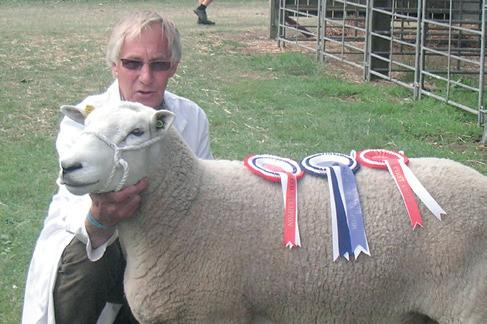

What we are all capable of is helping mitigate some of the issues that arise as a result of the appalling lack of public knowledge and understanding about what we as sheep producers do and the problems we frequently face. It is not that complicated. Often all it needs is a cheery hallo and a bit of a chat. We can all contribute, even if only in a very small way; if we all simply say that we “haven’t got time” to help enlighten and educate them, then we are all partially to blame. They are our customers
and product information, including some of the back-story, is all part of good marketing.
Just as a small example, on the opposite side of the road to one of my paddocks there is a new, small, housing development, and several weeks ago one of the occupants of these new houses telephoned me to tell me that I had a lame sheep; she told me how much she enjoys watching the sheep, which is nice, but had spotted that one was limping.
I already knew this; it was a ram lamb with a touch of scald that I had treated that same morning, but I thanked her for her concern and explained the situation, no problem. It just so happened that the next morning as I was on my sheep rounds she was walking her dog up the lane, so I made a point of being by the gate as she came past. After a few pleasantries,
FEBRUARY 2023 | WWW.SOUTHEASTFARMER.NET 48
TOPICS
ALAN WEST SHEEP
ALAN WEST Sheep farmer
AVOID TWIN LAMB DISEASE THIS SEASON
A developing ovine foetus does nearly 70% of its growth in the final six weeks of gestation. As the unborn lamb grows, so does the energy demand placed on the heavily pregnant ewe. The more lambs she carries, the greater her daily energy requirement.
Twin lamb disease (pregnancy toxaemia) results from an inadequate dietary energy intake by the ewe.
To maintain the growth rate of her unborn lambs she supplies them with extra energy from her own body reserves; her own back fat. The fat is transported to the liver where it is broken down into useable units called ketone bodies.
If the energy deficit is too great and the ewe mobilises too much fat, however, the level of ketone bodies in the blood actually begins to poison her and she can go down with twin lamb disease.
Ensuring the ewe receives a balanced ration with sufficient dietary energy is the best way to reduce the risk of twin lamb disease. Crystalyx Extra High Energy offers a very high energy content (16 ME MJ/kgDM) to help bridge any dietary shortfall, together with trace elements, minerals and vitamins to stimulate forage digestion and fermentation in the rumen.
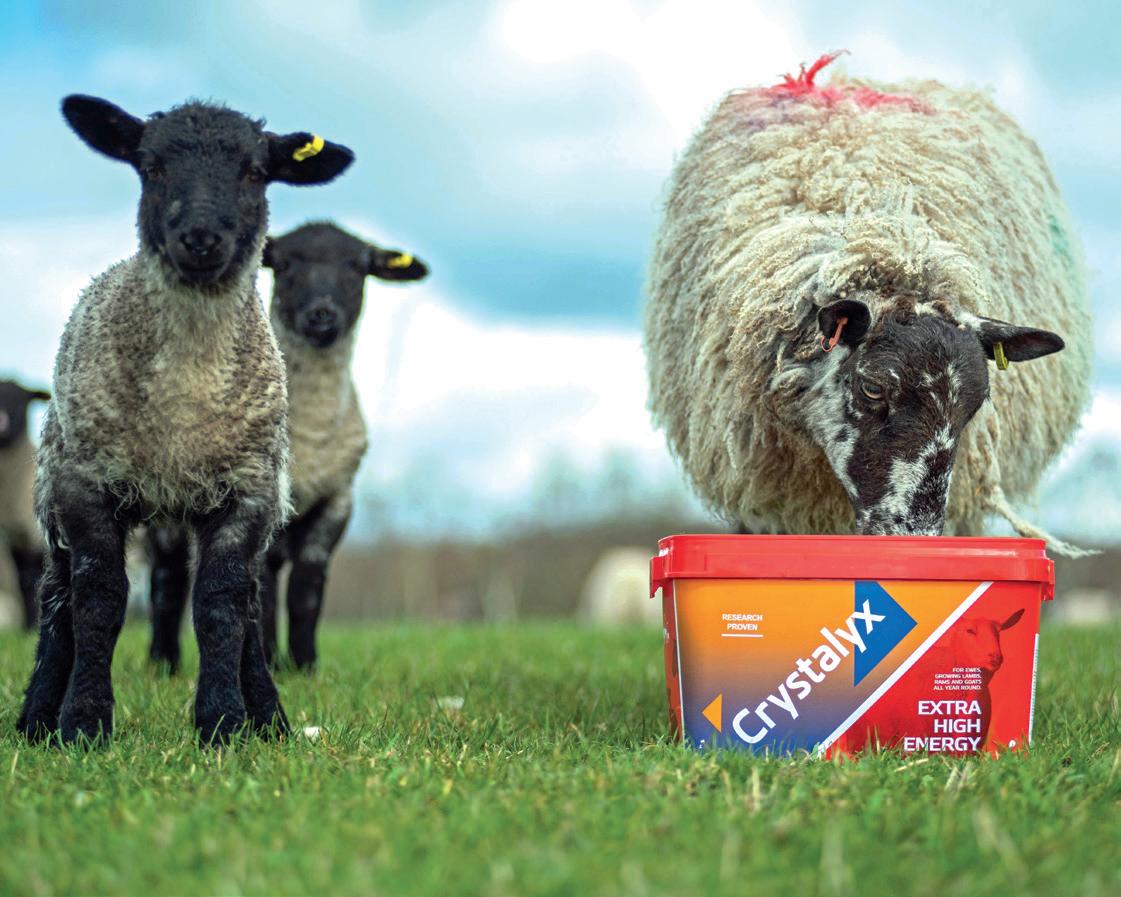
Crystalyx Extra High Energy is available 24 hours a day, allowing even
she asked how the ram lamb was, we had a chat about sheep in general and lameness in particular and I let her know that the ram lamb, although still favouring a foot a little, was much improved. She went on her way quite happily, feeling that she had done something to help and a little bit wiser about sheep keeping. A couple of days ago our paths crossed again and she asked what had happened to the ram lamb as it had disappeared from the paddock; observant, you might think, spotting that one was missing. The fact that it was the only Herdwick in amongst a group of Lleyn ram lambs might have had something to do with it; what she hadn’t spotted, however, was that all of the ram lambs had been moved to our ram paddock half a mile away and the sheep she was now looking at were in fact some ewes tidying up behind them.
So once again I explained what had happened and why; that we needed to move sheep to the available grass, and so on. With the ewes in sight, conversation inevitably turned
shy feeders the chance to lick it. It never replaces forage in the diet but complements and balances it. Therefore Crystalyx intakes can be used as a true guide to the adequacy of the ration being fed; high intakes mean the ewes are short of energy.
to lambing, so we discussed the relative merits of indoor and outdoor lambing, whether or not the ewes needed any assistance at lambing and so on. I had other things to do, but ten minutes or so of chatting to someone who, to be fair, wanted to know and asked lots of quite sensible questions, was well worthwhile.
So this lady, who I could easily have regarded as being a bit interfering and ignored, is now a little bit wiser, a little more sympathetic and I hope will no doubt have a slightly different outlook when it comes to buying lamb (she did tell me how much she enjoyed a piece of lamb occasionally), I’m sure that she will at least make some attempt to ensure that it is British lamb, I just hope that she also imparts a little of what she has discovered to her friends. I did let her know that the local farm shop sold some very nice, locally produced lamb.
Part of marketing is about winning hearts and minds. Some are doing a good job already, generating opportunities to communicate with our customers by hosting lambing open
days, taking part in Open Farm Sunday, etc. Some may not be quite so comfortable in these more formal situations, but we can all make a contribution in some small way; it is simply a matter of grasping opportunities that may arise. Many dog walkers, ramblers, people simply out for a bit of exercise etc. welcome the opportunity to find out a bit more about what we do. Someone just needs to start the conversation, a simple “good morning” is often all that it takes to stimulate a chat.
If we want our customers to support British sheep farmers and buy British, then a better knowledge and understanding of what we do goes a long way in helping to develop that support, and understanding comes from communication and meaningful dialogue. They are, after all, our customers.
I shall, by the way, the next time I see the said lady, invite her to drop in once we start lambing to see what we do and talk about some of the problems we might face - without her dog, of course.
WWW.SOUTHEASTFARMER.NET | FEBRUARY 2023 49 TO ADVERTISE CALL 01303 233883 LIVESTOCK
ADVERTISER'S ANNOUNCEMENT
On the whole, antimicrobial use is decreasing in the farm animal sector, and the importance of this is well documented. Mostly this has been through the proactive work of livestock keepers alongside their vets in identifying alternative strategies.
In some cases, hands have been tied, and discontinuation of certain products has been stipulated by assurance schemes, buyers or even by removal from the market as we saw with oral spectinomycin in 2022, although progress was already being made in reducing blanket preventative use.
In a group of more than 800 commercial sheep flocks, during the removal of oral spectinomycin, we have seen an increased reliance on injectable broad-spectrum antibiotics of 28%. Although injectable use is preferable to oral products in the sense of antimicrobial resistance development, we need to ensure that we are not simply substituting one antimicrobial product for another or waiting to be reactive when infections do develop.
There have been some success stories in reducing use. So, what have those sheep farmers been doing to ensure they don’t need to use antimicrobials virtually at all?
Inevitably, it involves planning ahead, but the good news is that it doesn’t have to be especially arduous or complicated. In infection control, we must always include the facet of environmental hygiene. That is rarely the whole answer, however, and certainly not if the other factors are not set right.
The key aspect is ewe nutrition, and the majority of sheep keepers have a good handle on what the right step-ups are in terms of hard feed kg/head in the final six weeks of lambing, when around 75% of foetal growth takes place.
This ranges from approximately 0.25 to 1Kg/head daily, depending on expected lambing date and litter size. Some also might split ewes into feeding groups based on body condition. It is right to try to avoid ewes being overly fat or thin at lambing, but if you can monitor and manage them before this phase you can mitigate a host of problems including
PLAN AHEAD
dystocia, prolapses, metabolic disease, mastitis, parasitism, joint-ill and watery mouth.
Aside from diseases like Maedi-Visna and Johnes, the ewe’s immunity is dependent on energy balance and protein intake. This affects not only her own defences but her colostrum production. Over-conditioned ewes will also deposit fat internally within the omentum and mesentery in the abdomen.
This is slower to be mobilised than the external fat deposits, so an animal which goes from fat to lean may still have the same residual problems which a fat ewe does, in terms of abdominal space, intake capacity and ketone formation. A ewe which never gets fat in the first place is less susceptible to negative energy balance.
So, we need to avoid over condition and at least have them where we want them with six weeks to go. Many flocks may be stuck with certain pasture types or stocking density and be beholden to the weather, so investment in things such as electric fencing to limit access where necessary could pay dividends.
The first step to controlling antimicrobial requirements is to major on body condition scoring. There are good resources on this in the knowledge library at ahdb.org.uk, and it is also something your vet can help you with.
A lowland ewe should score three out of five at lambing, and also at six weeks to go. Scoring, therefore, might need to take place in mid pregnancy, and scanning may also be a good opportunity to record. We need to make sure we are not restricting feed excessively in the 35 days after tupping, as this could compromise embryo implantation and pregnancy rates.
It is also worth analysing your forage, including fresh grass, so you can understand
protein content as well as energy and trace elements, for example with www.kingshay. com Energy and protein are vital for colostrum as well as for foetal growth, and this analysis will help determine just how much they need. Lamb birthweight also then directs daily liveweight gain and weaning weight potential.
It is also possible to assess the impact of what you are providing through metabolic profiling of the ewes ahead of lambing. Urea, albumin and BHBs allow us to assess macronutrient needs. Ewes that are due to lamb in the first week should be tested three to four weeks before lambing to allow for any changes to diet to be instigated well in advance of lambing.
Six ewes from each management group should be tested to give a realistic picture of nutrition of the whole flock (singles, twins, triplets, gimmers). Ewes should not have been fed concentrates less than four hours before blood sampling.
We should then be assessing the colostrum that the lambs are getting, and this can be done cheaply and accurately with a Brix refractometer, with a target Brix reading of greater than 22%.
Lambs should receive 50ml/kg within two hours of birth and 200ml/kg within the first 24 hours (so, feed until the belly is full). Bottles with teats or stomach tubes can be used to ensure the lambs get what they need.
The best supplementary colostrum is that which is collected from ewes in the same flock, for instance using a Udderly EZ ewe milker. Remember, when reheating colostrum from the fridge (for up to 24hrs) or freezer (for up to one year), don’t use the microwave or heat beyond 45 degrees Celsius, as this will damage the core components of the colostrum.
FEBRUARY 2023 | WWW.SOUTHEASTFARMER.NET 50 ADVICE FROM THE VET Westpoint Horsham T: 01306 628086 Westpoint Ashford T: 01306 628208 Westpoint Sevenoaks T: 01959 564383 Westpoint Winchester T: 01962 779593 Westpoint Chelmsford T: 01306 628489
IAN ROPER E: chelmsford@westpointfarmvets.co.uk T: 01306 628489
If you would like to discuss anything covered in this article contact your local Westpoint practice If you would like more information on flock monitoring schemes offered by Westpoint Farm Vets contact:
E: info@westpointfarmvets.co.uk www.westpointfarmvets.co.uk
To prevent lambing problems, we need to get more in touch with our ewes.
WATERWAYS NEGLECTED TO PROTECT ‘WATER RATS’ AND CRESTED NEWTS
The farming clock moves on. And what do our prospects look like? To those of my generation they are not very encouraging. With the days starting to lengthen it’s the time of year we should all be looking on the bright side, but that’s currently quite difficult.

Everywhere one looks, in the papers, on TV, and particularly on the increasingly lamentable BBC, omens are concerning. Activists across the country are still trying to bring us all to a halt. Hospital staff have been disgracing their profession by causing walk outs and stoppages. Some essentials are becoming increasingly hard to find. Environmental disciples are doing their best to demonise petrol and diesel car drivers.
For farming, fertiliser prices appear to have stabilised, if you can get the stuff, but are about four times what they were pre-2021, and it is difficult to see them returning to sensible levels soon without an end to Putin and his Ukrainian war.
Last year the price of cereals adjusted to these; milk and fodder crops too. But for how long? I don’t know about fruit but, from availability and eating quality in a wonderful summer they did seem to have had a very good 2022. Their main problem, along with vineyards, appears to be a lack of good pickers from the EU because, unfortunately, modern Britons don’t want too much physical work.
But where are the longer-term positives?
After a desperately dry spring/summer in 2022 we have at least started the new one with ditches and ponds full again, and the autumnsown crops generally look wonderful.
You really can’t win over soil moisture. If your waterways are running effectively the soil water level is lower and you avoid much serious flooding, but if winter is followed by a spring like last year, we quickly run into a big moisture deficit which disrupts good establishment of spring crops, certainly on non-irrigated land.
Alternatively, with the waterways neglected as they are today, primarily for the excuse of protecting ‘water rats’ and crested newts, the whole system breaks down. Most of us have
seen the results over recent years, and it is very frustrating. As I’ve said before, it is amazing to think how all those creatures managed to thrive in the days when the rivers and waterways were kept clear.
I imagine we are not alone, but my office has been pestered by very persistent ‘scam’ calls of late; many from voices purporting to be from the bank’s ‘fraud office’ reporting that someone is trying to take some money from our account.





Their manner immediately makes us suspicious, so we hang up, having told them in the strongest terms that we know their game. We use ‘callback’ to get their number, which never ties up with what they are saying.
I’m sure many of you get the same intrusive calls. Just report them to your bank but never give the caller a scrap of information, however genuine they may seem to you. It could cost you dearly. It would be very useful to have a number to call, but whose? The Police no longer have any interest in any but the most serious crimes and even then they don’t do too well! So, if you don’t know the caller don’t trust what they say. Just put the phone down.
Back to the farms. The vineyard, now approaching its fourth year from first planting, is looking good. I am not involved with it, having leased the land, but it is starting to look impressive. Our only real input has been that Emma worked for them last spring to autumn, some three days a week, mainly grass cutting and spraying, due to the shortage of European labour.
The project looks attractive but there is so much involved, like dealing with spring frosts, summer mildew, finding the pickers and then making good wine that will ring bells and sell. The establishment costs are huge. The vineyard is set up now with its own winery, press and storage and we hope it all goes well.
For interest only, as I’m warned off saying
nasty things about the EA, or I will be in the ‘dog house’. That is, of course, before anyone complains about me saying anything derogatory about dogs…
My immediate neighbours have around 40 acres of brookland where they used to run cattle, for which it was perfect. The cattle are now long gone, since when it has been used for cereals.
In the past 20-plus years, despite earlier huge investment in draining it, they have not managed to get one good harvest off this land. Some years, maybe 10 acres was flooded out, and this has become progressively worse to the point where they don’t plant anything there because it is a total waste of time and money.
On investigating they found the outfall pipes from their drainage scheme, which were set some 18 inches above the channel’s bottom, were now some 30 inches below the silt in the main waterways. Now I think I had better change the subject before I get my knuckles rapped.
On similar tack I’m sure many people will have noticed the explosion in house building on what is often quite marginally flood plain. Locally we have an old area known as the Five Villages. Old, distinct, largely self-contained villages.
Yet due to weak planning committees, influenced by bad planning laws and who knows what else, the area has become one sprawling town, such is the development not only on small green spaces but on ‘grade one’ land. Yet there is hardly any new infrastructure to support this explosion.

WWW.SOUTHEASTFARMER.NET | FEBRUARY 2023 51 TO ADVERTISE CALL 01303 233883 WEST SUSSEX DIARY NICK ADAMES
So why did we bother to put in the water tank?
NICK ADAMES Former dairy farmer
WE TOLD YOU SO!
As the rain continues to fall on saturated ground and the best the forecasters can offer is the prospect of more rain and then a week of cold north winds and maybe snow, I am reminded by the calendar that Candlemas (2 February) is traditionally held to be the halfway point of the winter, and a point where farmers would expect to have half of their winter fodder remaining.
It is also held to be the start of the farming year, as we move through that halfway point between the ‘shortest’ day and the spring equinox.
That would seem to suggest that better days are ahead, at least meteorologically. As always, that is the difficulty of farming, where nothing is guaranteed and planning a business strategy is riskier than picking the winner of a novice hurdle in soft ground at Fontwell.
Whether, as in the past, the over-arching support for farmers came from the EU or now, as the domestic government seeks to find an answer to its replacement, the important feature to any producer is to receive clear directional guidance satisfying short, medium and long-term ambitions.
Coupled to this financial support is the importance of the major retailers recognising the long-term nature of farming and that their responsibility is not only to their shareholders but also to the producers who, through thick and thin and with many uncontrollable circumstances such as the weather, continue to produce food that is
needed 52 weeks of the year.
As we start a new year, it is quite clear that these massive corporations, with all the resources necessary to have made the right decision for all parts of the chain, have clearly failed badly by looking after themselves; failing producers to the point of unsustainability and not actually giving a great deal to consumers.
For decades farming organisations and others with a view to the long-term viability of the countryside and its businesses have warned of treating farmers too harshly, but these warnings have gone unheeded.


Valuable generations have steadily left the industry to find greener pastures better able to sustain their dreams and their families. The age profile shift has left the livestock sector, particularly, exposed, with the heavy physical demands catching up on older farmers who have found no one to fill their boots.
Consequently, national herd and flock numbers reduce and, ultimately, an expanding population sees demand outstrip supply, creating a belated increase in price for the remaining producers but causing increased pressures and reduced margins in the other sectors of the chain. This leads to a consumer having to pay much more than the historically low food prices they have been accustomed to.

One doesn’t need to feel sorry for the sectors now affected, but maybe we can shout “We told you so!” Had the giant retailers paid those extra few pennies a litre, a kilo, or a tonne; had they not flown in products from
across the world, burning damaging fuels in order to ensure strawberries at Christmas; had they developed procurement staff with sound relationships with producers and processors that lasted more than five minutes before moving them onto fresh flowers or tinned fish, we might have seen a balance created between producer and consumer rather than the downward pressure that has been too easily exerted on the primary producer for the past 50 years.
WHERE DO WE GO NOW?
Prices in many sectors are very good, although perhaps not as good as they originally looked, with costs eating away at margins in all sectors.
But in a world that undoubtedly is going to get bigger as environmental pressures increase costs on shipping and flights, so the move away from French beans and baby sweetcorn from Kenya to swedes from Devon, carrots from Norfolk and potatoes from the Romney Marsh will undoubtedly change the look of the supermarket aisle.
We must preserve our livestock farming legacy before it is too late, and ensure that those born and raised with the knowledge are able to expand their opportunities, be rewarded for their 24/7 work lifestyle and bring another generation in behind them to continue to supply a nation that needs to understand more about its food supply and its security. It will probably take another 50 years.
FEBRUARY 2023 | WWW.SOUTHEASTFARMER.NET 52 AT ASHFORD MARKET
Reporting on the sheep market at Ashford T: 01233 502222 www.hobbsparker.co.uk
ELWYN DAVIES
EXCEPTIONALLY GOOD PRICES
The new year saw a tremendous trade in the livestock pens in Colchester Market, with cattle and sheep both making exceptionally good prices; many more stock could have been sold to advantage.


A slight downturn in the lambs during the middle of January reflected in many ways the quality of the sheep forward, with many under-finished sheep being presented but well-meated lambs of good conformation still meeting a good trade.
As stated, prime cattle started the year in a strong buoyant mood. Numbers were totally insufficient for buyers trying to replace stock. Best cattle regularly trading from 260p/kg to 280p/kg liveweight but an exceptional trade of 0+ cattle and those carrying a degree of fat cover, which butchers are moving back to. It is not excessive fat that is required but good cover. Weight was not an issue, with numbers short in all sections.
The cull cow trade also saw a buoyant trade and many more could be sold to advantage in the live ring. This is still very much a growth area in the meat trade with processing beef being to the fore.
There are some concerns about cheaper imports coming into the market place in the next two to three months, but this has happened in the past and hopefully the British public will stand up and buy British beef at a premium price. Good local butchers should be supported to ensure the trade continues. With the high cost of feed and the high price of replacement store cattle, all cattle finishers need the buoyant trade we are having.
The store cattle trade is difficult to judge in the beginning of the year, with numbers very short, but most finishers are well short of requirements.
As we moved into the new year sheep also saw a buoyant trade; in fact the two markets over Christmas and New Year were the dearest seen for some time. Many more sheep could have been sold to advantage.
As stated above, there was a slight decrease in averages in January, mainly caused by the quality of the sheep forward, and it was noticeable in mid January that numbers offered for sale were down. There is a real problem with sheep in that fodder is exceptionally short, with fodder crops being a real problem in the drought last year. The next two months are going to be very interesting.
Store sheep are becoming more difficult to sell, reflecting again the fodder situation. Short-term store lambs are trading from £80 to £100 but longer-keep lambs regularly £40 to £60 and below of less quality.
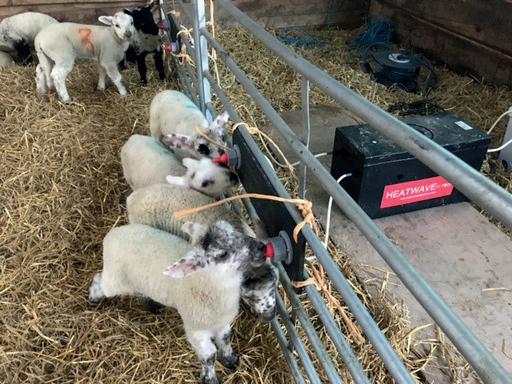

There are real concerns about imported lamb and beef having a downward effect on the market; 2023 is going to be an interesting year
for all of us but hopefully confidence in British meat will prevail.
The cull ewe trade continued to be firm, with best ewes in Colchester trading for £120 to £140 per head with good averages around £100.
Grazing ewes were becoming more difficult towards the end of the period of this report due to the lack of fodder as reflected in the finished hogget trade.
It’s good to see pigs at record prices, but this still means negative returns for producers. Again, the high cost of imports such as feed and labour is having a negative impact.
The cull sow trade has improved due to the euro against the pound rate but is still well below what has been experienced in the past. At least, however, we are showing sows coming to reasonable money compared with 12 months ago.
Stock up for lambing, with everything you need direct from farmsupplies at Westpoint Farm Vets Ashford

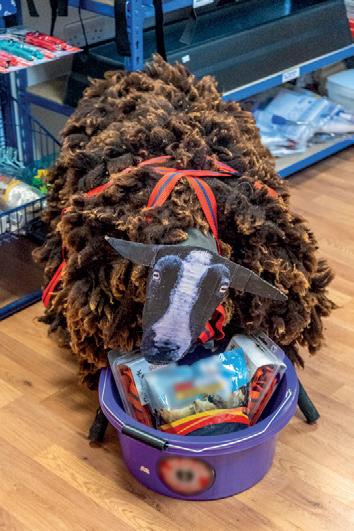
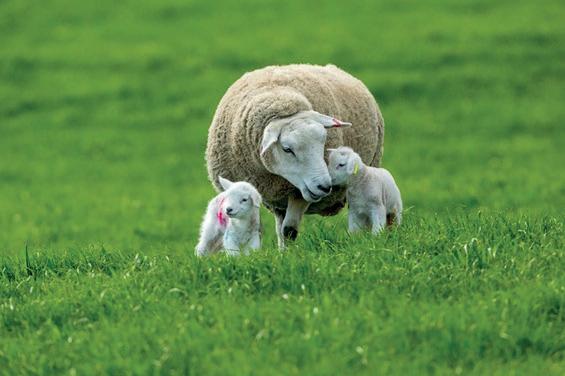
Approved by our dedicated farm vets, farmsupplies offer a full range of farming equipment at competitive prices From handling and weighing systems, to lamb feeders, electric fencing supplies, day to day essentials, livestock ear tags, and protective clothing, farmsupplies have got you covered
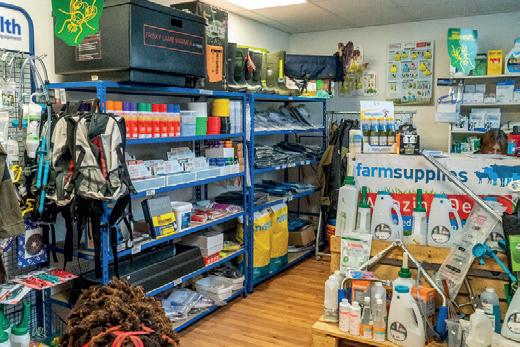

If you are not local to Ashford, you can still take advantage of our products, services, and excellent deals
Our friendly team are more than happy to assist and discuss your farm’s individual needs
can help you
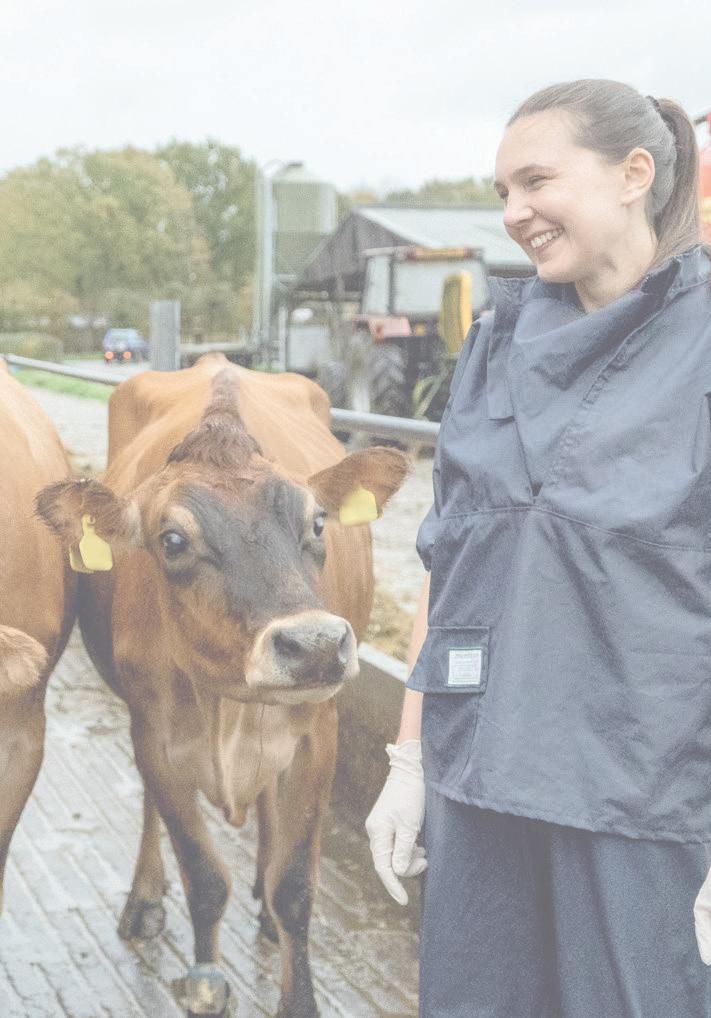
WWW.SOUTHEASTFARMER.NET | FEBRUARY 2023 53 TO ADVERTISE CALL 01303 233883 AT COLCHESTER MARKET GRAHAM
ELLIS FRICS FAAV FLAA For and on behalf of Stanfords T: 01206 842156 E: info@stanfords-colchester.co.uk www.stanfords-colchester.co.uk
Ashford Che smford Horsham|Sevenoaks|Winchester York 100% Farm Vets @westpo ntfarmvets @westpo nt vets westpo ntfarmvets co uk nfo@westpo ntfarmvets co uk
Visit us between 8am-4pm or call today on 01233 743466 to see
farmsupplies
how
EXAMINING THE OPTIONS
With the closure of Tottingworth Farm uppermost in many farmers’ minds, NFU South East Communications Adviser Isobel Bretherton outlines the views expressed at an online summit.
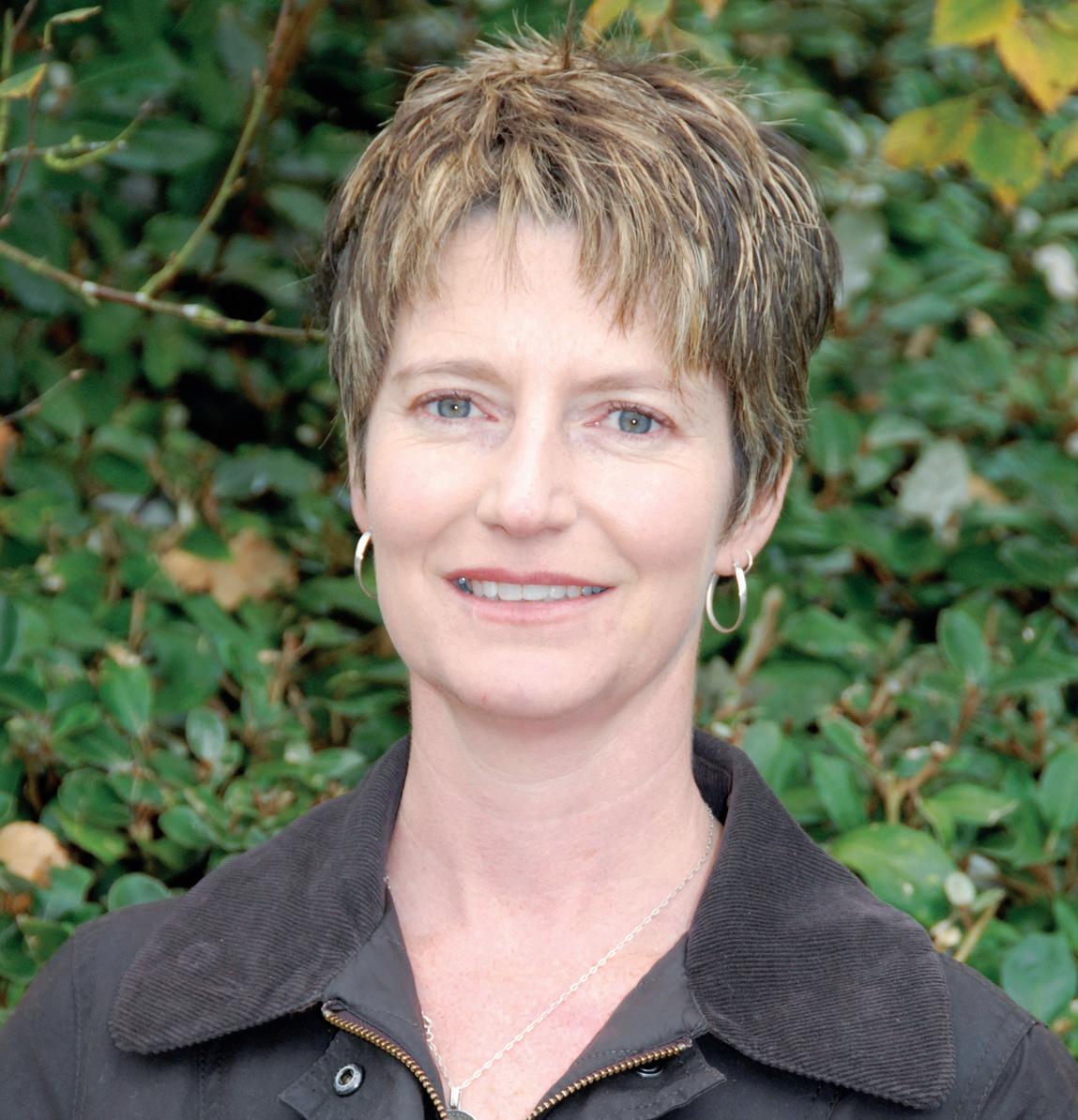
Farmer-funded abattoirs and the challenges their directors face were explored during a virtual meeting organised by NFU South East in January.
The NFU meeting helped livestock farming members examine the options following the demise of Tottingworth abattoir, near Heathfield in East Sussex. Working capital costs for small to medium-sized abattoirs run to millions of pounds, and abattoirs are often located on what later becomes prime development land.
The panel of experts for the event were Matt Smith, who runs a new on-farm abattoir in Cornwall, John Pegg, from the veterinary school of the University of Nottingham, who has a lifetime’s experience in the sector, and Mike Gooding, farmer and former director of Farmers First, a limited company funded by 2,750 farmer shareholders. It was chaired by NFU South East livestock board chair Ben Robinson, who farms near Winchester, in Hampshire.
All three speakers identified their top challenges as:
• legislative, such as a lack of help from the Food Standards Agency (FSA) in interpreting legislation and guidance
• costs - capital, operating costs and revenue generation
• staffing – finding staff, particularly experienced slaughterhouse workers
• carcase balance and waste disposal.
New Zealander Matt Smith farms 700 deer and 1,200 sheep in Cornwall. He set up an abattoir just before the pandemic, at a cost of £720,000, to slaughter his own deer, later expanding the facility to handle his own ‘single breed’ sheep, as hospitality buyers seek a consistent product. He also offers private kill, helping neighbouring livestock farmers.
“To get to a level of profitability, there is firstly a huge loss,” said Matt. Operating costs have soared from £14,000 pa to £55,000, and the pubs that buy from him are also facing huge hikes in energy costs. “How do we increase our prices but retain access to those markets?” he asked.
Matt recognised that he was fortunate to gain planning permission for his rural abattoir; it is different for those within a built-up area. He also criticised the lack of veterinary surveillance, both for bovine TB and for zoonotic diseases.
He was followed by John Pegg, who has more than 40 years’ experience in the meat trade, managing relatively large plants including ABP in the south. John is now with The University of Nottingham, only the second university in the country to run an abattoir, Bristol having been the first.
Nottingham’s three-species abattoir is small scale and is used to train 300 veterinary students per year. It has only just reopened postCovid, with plans to expand and offer a home-kill service. NFU South East livestock board chair Ben Robinson recognised the value of the university in potentially attracting vets to work on abattoir inspections.
Mike Gooding is both a farmer and a former director of Farmers First, which sprang up in the early noughties from lamb live export business
Farmers’ Ferry. Mike also has experience of poultry processing. He emphasised the importance of having clear objectives from the outset, together with a strategy to achieve them. Farmers’ Ferry, he explained, had always set out to improve returns for lamb producers through trade.
He advised abattoir directors to find a way through legislation, rather than becoming increasingly frustrated or angry. In terms of capital, five years ago Mike estimated the costs for a medium-sized abattoir on a brownfield site in south Wales at £19 million per year, with a throughput of 500,000 lambs and 5,000 cattle annually. With materials costs for steel and concrete up dramatically since then, the figure would be much higher now.
A new mobile abattoir is being trialled on the Isle of Wight. Fir Farms’ founders believe its future will lie in slaughtering at ‘hubs’ around a region, rather than travelling to farms, as the FSA must approve both the mobile abattoir and the location of slaughter, where a lairage and dirty water handling facilities are mandatory.
NFU senior veterinary adviser Clare White gave an overview of the legislative framework within which abattoirs operate. While there might be scope to streamline some rules on the basis of risk, Mike Gooding said DEFRA lacked experienced policy makers.
The costs of live exports have doubled post-Brexit, so with strong demand for meat worldwide, sales on the hook to countries around the world appear to make sense. Preserving the ability to move live animals, especially high value breeding stock, remained vital, Mike added.
FEBRUARY 2023 | WWW.SOUTHEASTFARMER.NET 54 FROM THE FRONT LINE IN CONJUNCTION WITH
Isobel Bretherton
LILLY GRIFFITHS Cliffe Veterinary Group
 T: 01273 473232
T: 01273 473232
 E: leonille.griffiths@cliffevets.co.uk
E: leonille.griffiths@cliffevets.co.uk



PRE-LAMBING PLANNING
Lambing is fast approaching and now is the time that you might start to see twin lamb disease (TLD) in your ewes. Twin lamb disease is seen as a ewe going off her feed, staggering or going down. In severe cases it can cause blindness and even death.
It is due to a negative energy balance caused by the fast-growing lamb taking up more room in the abdomen and reducing the amount of food the ewe can eat. This can be worsened by stress. It is best to transition any management changes close to lambing and avoid too many stresses at the same time, such as housing, changes in rations and dagging.


Treatment of TLD in the first instance can be given on farm with propylene glycol as an energy dense drench to correct the negative energy balance. However, TLD is hard to distinguish from hypocalcaemia – ‘milk fever’ – and so it is a good idea to give calcium under the skin at the same time. Giving an anti-inflammatory like meloxicam has been proved to improve survival rates of both ewe and lambs. Severe or non-responsive cases, or a bad run of cases, should be discussed with your vet.

The group most at risk is older, twin-bearing and triplet-bearing ewes that are either over-conditioned or in poor condition and on lower energy feed. We have been actively monitoring our clients’ forage stocks this winter using forage analyses, and are seeing huge variability in the energy and crude protein levels. These forage values affect whether or not these high-risk ewes are receiving an adequate and balanced diet. Having precise feed values for forage enables us to give accurate advice on feeding plans for single, twin-bearing and triplet-bearing ewes in the run up to lambing. We can establish the right amount of ewe nuts to feed, and with the price of good quality concentrate feed at over £400 per tonne, there may be a cost saving if your forage is better than average.
Within three weeks of lambing we can then tweak the ration on the back of a metabolic profile to help reduce TLD and milk fever in your ewes and improve lamb survival. Your vet can blood sample and body condition score a group of six ewes per management group to assess energy balance, protein, calcium and magnesium. This can give an early signal that a ration needs to be adjusted, as this is the time that the lamb is growing the most and so the ewe is working the hardest.
The final part of the jigsaw is feed presentation. There must be adequate feed space for ewes to eat concentrate unhindered. This is more of a limiting factor in housed ewes and provision of adequate manger space for forage presentation is vital, too.

There are three rations on farm; the one on paper, the one delivered to the ewes and the one the ewe manages to eat. The aim is to keep these as similar as possible. If you have previously had problems with sick ewes or high lamb losses, planning your ewe nutrition is the best place to start.
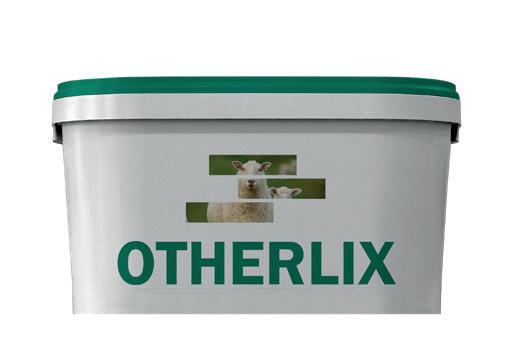
WWW.SOUTHEASTFARMER.NET | FEBRUARY 2023 55 TO ADVERTISE CALL 01303 233883
www.cliffefarm.co.uk CRYSTALYX LASTS LONGER! WITH LOW REQUIRED INTAKES AND A UNIQUE CRYSTALLINE STRUCTURE, CRYSTALYX PRODUCTS CAN LAST UP TO THREE TIMES LONGER THAN SOME OTHER FEED BLOCKS = Find your nearest stockist at www.crystalyx- global.com Tel +44 016973 32592 Email info@crystalyx-global.com Crystalyx UK
Legal services for farmers & rural businesses







Call us today or visit our website: 01227 763939 furleypage.co.uk
AGRICULTURAL & RURAL PROPERTY TEAM STRENGTHENED
Law firm Thomson Snell & Passmore has welcomed Fiona Higgott as a partner in its well-respected wills, estate and tax planning division. Fiona has significant experience in working with farming families, landowners and the rural community.



She has joined the firm from DMH Stallard, where she has spent the past 11 years. She brings with her a wealth of expertise in estate planning, including tax-efficient wills, the creation of lifetime settlements, making potentially exempt transfers (PETs), utilising gifts out of excess income and arranging estates to maximise agricultural relief and business relief.
Fiona’s appointment will add further depth and breadth to the team following the appointment of Penelope Edgar as the new head of agriculture and rural property last summer. It gives the firm one of the largest dedicated agriculture and rural property legal teams in the region.
When the only certainty
is change
Uncertainty is part of life, but the world has changed so rapidly that finding creative ways to keep pace is a huge challenge.
We provide agricultural businesses and farming families with pragmatic legal advice to help them adapt and grow.

The appointments see the team positioned to support the farming industry as it undergoes a period of rapid change. New regulations, an increased focus on sustainability and biodiversity, skills and labour shortages and the rising cost of fuel and machinery are all impacting on farmers and agricultural businesses.
As many farming businesses are family owned and run, there are also important conversations to be had around topics such as succession planning and wider estate and tax planning.

The rural community needs access to trusted advisers who not only understand the specific issues farmers face but also the wider regulatory and legal landscape. It is also important to have professional advisors who understand each client’s unique needs, from inheritance tax advice to planning issues and everything in between. Thomson Snell & Passmore believes this can only be achieved through building lasting relationships.
Having access to a good adviser will ensure farmers can better anticipate and adapt to change, allowing them not just to survive but thrive.
FEBRUARY 2023 | WWW.SOUTHEASTFARMER.NET 56
Fiona Higgott
Penelope Edgar
www.ts-p.co.uk 01892 510000 @pragmaticlawyer
WHEN ARE PROMISES TO LEAVE A LEGACY BINDING?
In the Christmas 2020 issue, I wrote about the unfortunate case of Tump Farm and the Guest family who farmed it. Since then, the case has been appealed to the Supreme Court, which gave its judgment in October 2022.
David Guest and his wife Josephine had acquired the farm in the 1960s. Their two sons, Andrew and Ross, had grown up on it, worked on it and raised their families on it in the expectation - borne of assurances made by David and by Josephine - that they would inherit the farm equally on their parents’ deaths.
Both David and Josephine made Wills to this effect but, after a major falling out, the parents changed their Wills so that Andrew would not get his share. When Andrew learned of this, he brought a claim against his parents to compensate him for his lost share.
PROMISES, PROMISES: THE LEGAL IMPLICATIONS
If you make a promise or give an assurance about an inheritance to someone which they then reasonably rely on, to their detriment, that person may have a claim against you (or more commonly your estate) if the promise is broken.
Such a claim, known as a ‘proprietary estoppel’ or ‘promissory estoppel’, is particularly common in farming families. It has been called “a little-known piece of land law” which allows individuals to assert and establish an interest in land without the usual formalities, and the court has wide powers to decide what the appropriate remedy should be.
In Andrew’s case, the lower court had been satisfied that his hard work on the farm, for only a basic wage, over 30 years was sufficient detriment on which to found a claim, and that he had a reasonable expectation he would inherit half the farm.
Andrew succeeded. Unusually, his claim was brought before David and Josephine’s deaths, but the court none the less ordered they pay their son a lump sum of £1.3 million (calculated as 50% of the farming business value and 40% of the land value). The award was to reflect that which Andrew had lost out on by the broken promise.
David and Josephine were still living on, and farming, Tump Farm. They would have had to sell it in order to pay Andrew the £1.3 million, and the court’s decision was widely regarded by some as being unfair on them. Further, Andrew would be receiving his ‘inheritance’ early - before David or Josephine had even
died. They appealed, unsuccessfully, to the Court of Appeal, and then to the highest court – the Supreme Court.
THE SUPREME COURT: A FAIRER RULING?
The Supreme Court accepted that holding a defendant to a promise may not always be fair or possible. It suggested that, depending on the facts, it may be better for the court to put a claimant back into the position they would have been in if they had not relied on the promise in the first place, rather than compensating them for the full value of the promise.
Unfortunately for David and Josephine, however, the Supreme Court largely followed the decisions made in the lower courts by compensating Andrew for the value of the promise, although it did concede there should be discount for Andrew’s early receipt of it. The court also proposed an alternative remedy and gave David and Josephine the choice of putting the farm into trust for Andrew but retaining a life interest for themselves instead of paying him the lump sum (to allow them to continue living on the farm and farming it).
The Supreme Court’s decision was perhaps a slightly fairer result, although the case does still serve as a salutary reminder about the possible consequences of making and breaking promises vis-a-vis an inheritance. It is always sensible to seek professional estate planning advice early on.
Deborah Cain is a partner at Brachers and head of the contested trust and probate team.

WWW.SOUTHEASTFARMER.NET | FEBRUARY 2023 57 TO ADVERTISE CALL 01303 233883 LEGAL DEBORAH CAIN Partner, Brachers LLP T: 01622 655297 E: deborahcain@brachers.co.uk www.brachers.co.uk
“Promises are made to be broken”, or so the saying goes. But did you know that a promise to leave land to someone may be legally enforceable – even if it isn’t written in your Will?
Maidstone | Canterbury www.brachers.co.uk
Proud to be recognised for our agricultural expertise in leading directories, Chambers and Partners and The Legal 500
A “knowledgeable and responsive” team of “excellent solicitors who know their specialisms inside out”
ESTABLISHED WEST SUSSEX VINEYARD
30 ACRES BOLNEY | WEST SUSSEX

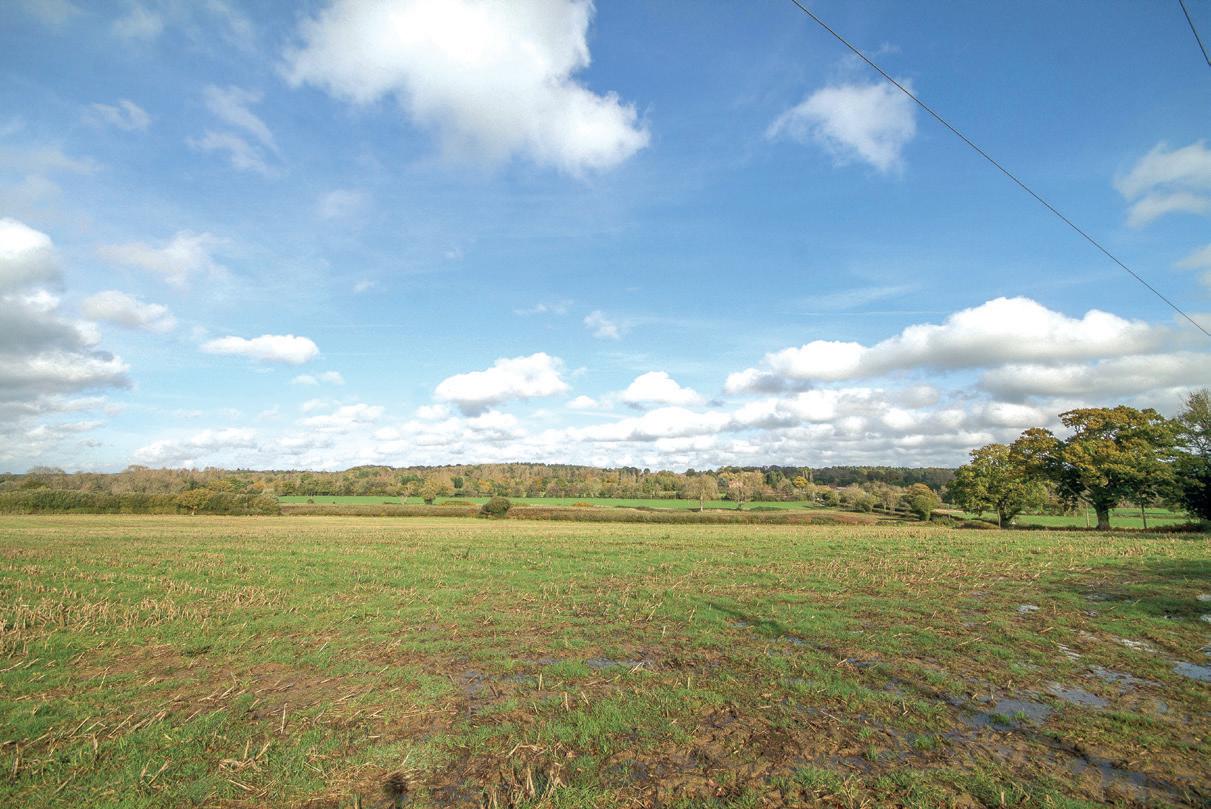
GUIDE PRICE: £690,000
An established vineyard with views to the South Downs has come to the market on the edge of Bolney village in West Sussex.
Foxhole Vineyard extends to about 30 acres, including 16 acres of well-established vines, with the remaining land down to grass. There is a wooded shaw that runs through the land with a small stream, along with a pond.
The vines were planted in 2008/2009 and are now fully established. The majority are Pinot Noir, with a smaller amount of Pinot Gris and Bacchus vines. In previous harvests, the picked grapes have been used by a highly regarded local wine producer.
The majority of the land is on a gently undulating, south-facing hillside and the altitude varies between 25m and 31m above sea level. It is surrounded by wooded shaws and hedgerows, which give an element of protection for the vines. The vineyards are also deer fenced.
Chris Spofforth, head of Savills' viticulture team, said: “Foxhole Vineyard offers a rare opportunity for a buyer to enter the rapidly expanding English wine industry and acquire a well-established standalone vineyard.
“As Foxhole is purely a producer of grapes, it would suit an


existing producer who needs a reliable source of fruit or a new entrant looking to create their own personal brand without having to start from scratch.’’
Foxhole Vineyard is being marketed by Savills for a guide price of £690,000.
VALUABLE BLOCK
GUIDE PRICE: LOT 1 £165,000 LOT 2 £345,000
A valuable block of farmland in a very accessible location on the outskirts of Lindfield and Haywards Heath with good road frontage and access is on the market with Batcheller Monkhouse.

In all it runs to approximately 36 acres for sale in 2 Lots. Lot 1 approximately 11.4 acres and Lot 2 is approximately 24.3 acres.
The land at East Mascalls Lane is conveniently located just past Great Walstead School on the outskirts of Lindfield and Haywards Heath. The area is well served with easy transport links and there is a wide variety of countryside within easy reach including by vehicle for riding on the Ashdown Forest and the South Downs.
Overlooking Bewl Water
Wadhurst, East Sussex
31.94 acres (12.92 ha)
A good block of pastureland, with shaws and stunning views.
Freehold For sale in 2 Lots
Guide Price £415,000
Contact: James Tillard - 01342 410122
DD: 01342 305825

jamest@rhrwclutton.co.uk
Lot 1 comprises a level block of pasture with private access off East Mascalls Lane with a stream running along the northern edge.
Lot 2 adjoins Lot 1 and comprises a gently sloping block of pasture with two private access points off East Mascalls Lane.
Haywards Heath office: 01444 453181



FEBRUARY 2023 | WWW.SOUTHEASTFARMER.NET 58 LAND AND FARMS
i
ABOUT
For more information contact Savills on 01732 879050
i
RH & Follow us on : & www.rhrwclutton.com
East Grinstead - 01342 410122 Petworth - 01798 344554 Guildford - 01483 300233 RH & RW CLUTTON
LAND AND FARMS SPONSORED BY BATCHELLER MONKHOUSE

LAND WITH A VIEW
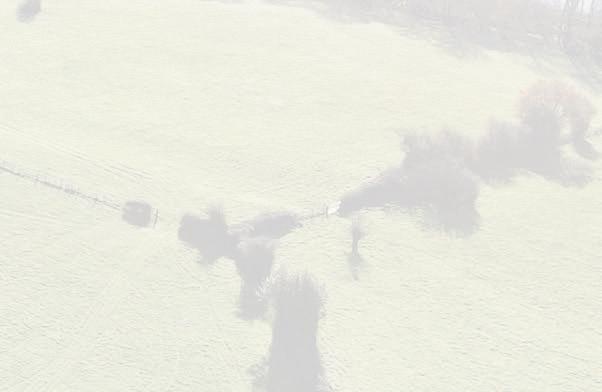
Rarely does a block of south-sloping pastureland offering such spectacular southerly views over Bewl Water, which straddles the boundary between Kent and East Sussex, come up for sale. The land, forming part of Ladymeads Farm off Bewlbridge Lane near Wadhurst, extends to nearly 32 acres and is being offered for sale by R H & R W Clutton in two lots.
Well established shaws of beech, oak, chestnut and pine run along and down the northern and eastern sides of this wellestablished pasture ground, and at the southern end a track leads through a further shaw to a rewilded paddock abutting the reservoir.
The land was organic for 30 years and registered with the Soil Association until





recently, and it benefited from a Countryside Stewardship agreement which ran out in 2020.
James Tillard, from the company’s rural agency, said he was anticipating strong interest given the land’s position and location down a quiet, dead-end lane. For the two lots there is an overall guide price of £415,000.

WWW.SOUTHEASTFARMER.NET | FEBRUARY 2023 59 SECTION TO ADVERTISE CALL 01303 233883
TOPPICK
iFurther details are available from: JamesT@rhrwclutton.co.uk Tel: 01342 305825
GUIDE PRICE: £415,000 NEARLY 32 ACRES WADHURST | EAST SUSSEX
Come and say hello on the 1st March at Farm Expo office@therpp.co.uk CIRENCESTER 01285 323200 CRANBROOK 01580 201888 www.therpp.co.uk Chartered Town Planners Image courtesy Olson Design Group In a planning pickle... ...or just looking at development options? Don’t panic. The professional, creative thinkers at The RPP can help.
BNG OFFERS NEW OPPORTUNITIES




Demand for BNG provision is growing rapidly and agreements are already being struck.
Estimates of the total annual BNG requirement vary widely, with suggestions ranging from 7,000 to 40,000-plus ‘units’, but what’s clear is that it heralds a potentially lucrative opportunity for farmers and landowners.
Some farmers might look to provide, say, three to six units as a way of supplementing their income, while others could devise schemes that deliver, say, 40 units. Large farms and estates that pursue BNG as a central plank of their strategy could provide
hundreds or even thousands of units.
One such venue is Iford, a beautiful estate near Lewes covering 1,200 hectares of mainly grade 3 and 4 land in the South Downs National Park.
Selected to take part in Natural England’s pilot project setting the framework for BNG, it’s already begun work on its 30-year vision.
Initial mapping and modelling suggested it had a ‘baseline’ of about 3,500 units, but a mix of measures could ultimately see this figure more than double. They include reverting poorer quality arable land to species-rich grassland; restoring and enhancing chalk grassland and coastal and
floodplain grazing marsh; woodland creation; hedge planting; and pond creation.

In order not to be reactive to the BNG market, the estate team and CLM devised a whole-estate plan, setting out the long-term vision.
Two agreements are already close to being inked, together covering three hectares and generating nine units at prices ranging from £25,000 to £35,000 per unit.
Central to this work will be creating grassland, based on a wildflower meadow mix, along the lines of the AB8 option in the Countryside Stewardship scheme. It will contain species such as bird’s-foot trefoil,
FEBRUARY 2023 | WWW.SOUTHEASTFARMER.NET 60 LAND MANAGEMENT
Iford inundation
With the ‘market’ for Biodiversity Net Gain (BNG) rapidly emerging, South East Farmer hears from farm and environment consultant Anthony Weston about the options and one Sussex scheme with which he's involved.
knapweed, lady’s bedstraw and ox-eye daisy. Work ‘on-spec’ will also begin in earnest in 2023 to create a ‘habitat bank’ available for developers to draw on for the provision of BNG. All the investment-readiness work has now been done and the spades-in-theground delivery work of actually creating a habitat bank is beginning.
It may be that multiple agreements are entered into with many different companies, but it’s also possible that there will be one or two larger deals, rather like ‘anchor’ tenants in a retail centre, with the others built around that. The proposal can be fine tuned as time passes.
Part of the attractiveness of Iford as a venue for providing BNG is how it fits within the wider landscape. It’s in the Ouse Valley, within a National Park and adjacent to SSSI and National Nature Reserve land, as well as ‘priority’ habitats.
It’s well placed to link those, allowing ‘aggregated’ gain, which is something CLM has seen the benefits of through its work with farmer cluster groups. It’s part of a patchwork of natural and semi-natural habitats, rather than an island.
For the estate team at Iford, this represents a way of broadening the portfolio of revenues and future proofing what has traditionally been a mainly farming-focused business. Volatile weather, uncertainties around commodity prices and, more recently, rocketing costs have focused minds on the importance of generating more predictable revenues and in a way that fits with the ethos of the next generation of owners.
This isn’t rewilding, though. The landscaperecovery and nature-recovery work is happening in tandem with some continued farming operations. The best arable land will be retained for food production, but where it becomes more marginal, the balance tips towards using it for more environmental outcomes. Beef and sheep will be kept to help manage the new habitats.
There is inevitably an element of risk because of the many unknowns when embarking on a long-term plan which involves an initial capital cost and ongoing management costs.
The big risk is policy change, either nationally or locally. But with a 10% minimum of BNG mandatory from November 2023 – and some local authorities talking about
BNG BASICS
BNG is a planning concept that requires developers to provide a minimum of 10% more biodiversity than is lost at a development site. It can be provided ‘off site’, ie on farms a distance from the development. The amount of biodiversity lost as a result of the development and the required additional provision is calculated through a system of ‘units’ using a recognised metric.
applying a figure of 20% – it feels like this is unlikely.
No one can predict exactly where the market will go in terms of the price of BNG units, but indications are that the payments will be potentially far greater than are available under the Countryside Stewardship scheme.

Another deal CLM has been involved in saw a £100,000 payment to a landowner to provide a one hectare offset for a road improvement scheme. This involves turning some existing grassland into SSSI-quality grazing marsh habitat which will be great for invertebrates and encourage wading birds such as lapwing, redshank and wigeon.
There is a lot of development happening everywhere, particularly in the South East, and the BNG system encourages the offset to be provided within the same LPA area as the development. This means development in or around places such as Brighton and Eastbourne could potentially spark a demand for ‘offsite’ gain at Iford.
With the BNG market starting to come alive, it’s important to be proactive if you want to drive the price, rather than ending up as a price-taker. If you know what is deliverable, you’ll stand a better chance of securing a better deal and are less likely to undervalue the opportunity.
It’s worth viewing BNG as a ‘commodity’. Don’t just think about it in terms of area; think about how much it might ‘yield’ within the context of the rest of your business.
It won’t be for everyone, not least because it’s committing land to a 30-year agreement, so it’s highly unlikely the market will be over-supplied. It could, therefore, represent an important revenue stream, a means of supporting nature recovery projects on your land, a way of managing risk and something that offers synergies with other estate revenues, such as those from tourism and let property.
WWW.SOUTHEASTFARMER.NET | FEBRUARY 2023 61 TO ADVERTISE CALL 01303 233883
ANTHONY WESTON Director, CLM T: 01892 770339 twitter @anthonycweston www.c-l-m.co.uk



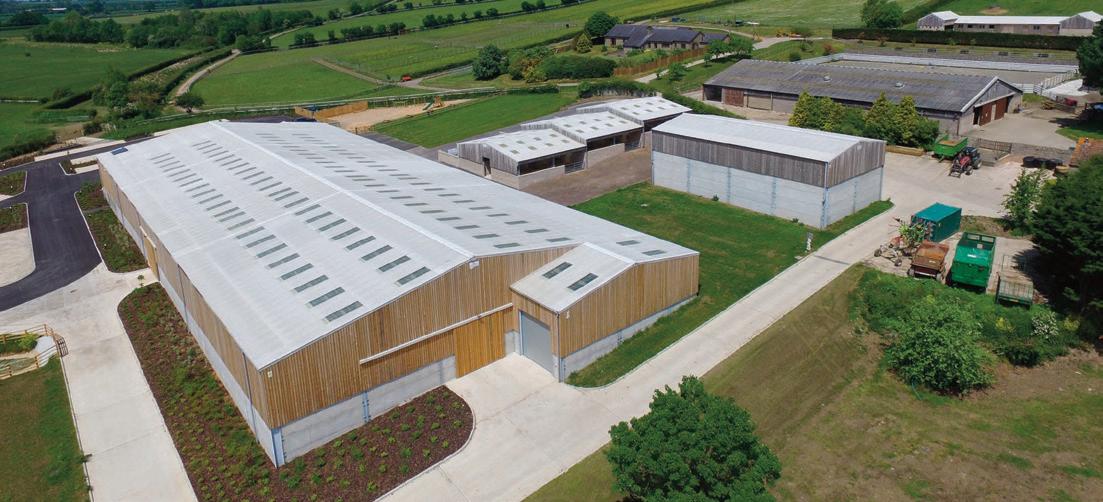
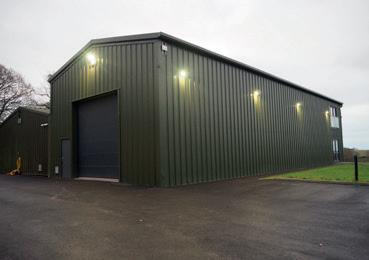
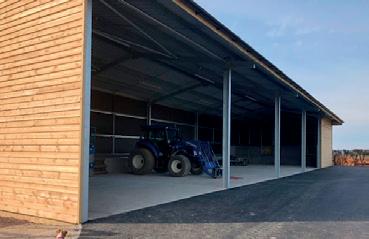
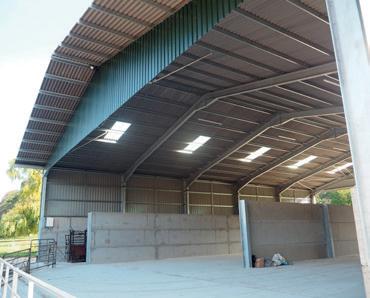


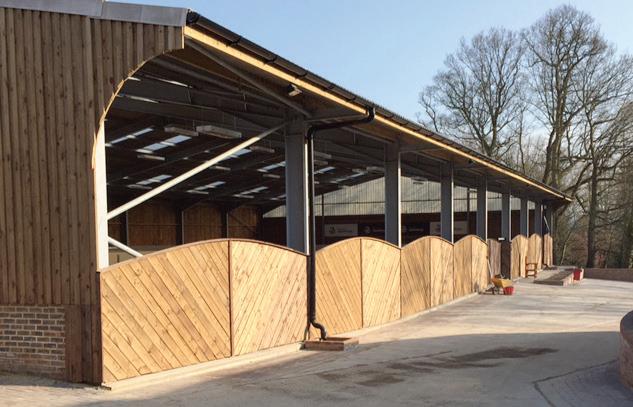










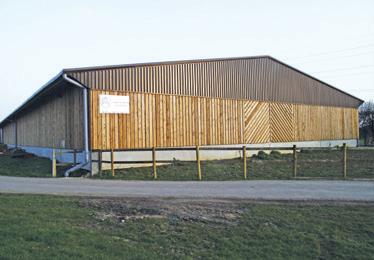



FEBRUARY 2023 | WWW.SOUTHEASTFARMER.NET 62 CLASSIFIEDS CONSTRUCTION CONSTRUCTION Industrial & Commercial | Structural Steelwork | Agricultural & Equestrian Contact us for a free quotation 01269 831831 enquiry@shufflebottom.co.uk www.shufflebottom.co.uk Shufflebottom Ltd Cross Hands Business Park, Cross Hands, Llanelli, Carmarthenshire SA14 6RE Shufflebottom Agricultural Buildings Steel-frame buildings for your farm + Supply only or supply & erect + Construction all over the UK + Award winning company Strength, Security, Style Office 01273 492404 � info@formabuild.co.uk www.formabuild.co.uk We specialise in the supply and construction of steel framed buildings together with the repair and refurbishment of existing farm buildings. Based in the heart of Sussex, covering the South East. Sussex builders since at least 1605. Forma offer all aspects of steel framed construction and cladding together with groundworks and electrical fit out if required. formabuild.co.uk 100% British designed & built Over 35 Years experience Site visits Call to arrange a site survey All our panels are marked Gary White 07812 599679 Jason White 07941 274751 Based in Lewes, East Sussex G.E.WHITE & SONS Ltd All refurbishments & repairs undertaken. Call for a free quote today. AGRICULTURAL, EQUESTRIAN & INDUSTRIAL STEEL FRAMED BUILDINGS We supply CONCRETE PANELS – Any size to suit your needs All aspects of steel work, cladding & groundwork. Family run business with 45 years experience. “You tried the others, now try the brothers” All our buildings are marked www.gjelgarconstruction.co.uk For more information contact us: t: 01233 623739 m: 07860 414227 e: office@gjelgarconstruction.co.uk • Steel frame buildings • Sheeting and cladding • Guttering and repairs • Groundworks and drainage • Demolition and asbestos removal • Refurbishment and change of use • Concrete frame and steel frame repairs • Insurance and general repairs • Concrete floor and block paving G. J. ELGAR CONSTRUCTION Ltd













WWW.SOUTHEASTFARMER.NET | FEBRUARY 2023 63 TO ADVERTISE CALL 01303 233883 CLASSIFIEDS CONSTRUCTION CONSTRUCTION CONSTRUCTION Agriculture ~ Cold Storage ~ Equestrian ~ Industrial ~ Waste Recycling • Agricultural Buildings • Cold Store Buildings • Equestrian Buildings • Industrial Buildings • Waste Recycling Buildings • Structural Steel • Drawing Services • Design Services • Mezzanine Floors • Custom Steelwork 01323 890403 www.danddconstruction.co.uk info@danddconstruction.co.uk To advertise in South East Farmer telephone 01303 233883 Steel frame buildings for all your farming and agricultural needs. Visit our website or find us on social media to learn more... Supplying profiled roofing products to contractors, builders and farmers visit www.southernsheeting.co.uk for our full range or call 01342 590 357 to speak to our friendly sales team Our main products off the shelf include: • Metal sheeting • Insulated panels • Fibre cement • Rooflights • Onduline • Fixings and accessories southernsheeting.co.uk NATIONWIDE DELIVERY • EXTENSIVE RANGES IN STOCK CS3152 SS SE Farmers 190mm x 133mm advert v2.indd 2 23/11/2022 15:47 Arrange a site visit with one of our contracts managers to discuss your project in more detail by emailing enquiries@kenwardgroundworks.co.uk or call 01403 210218 www.kenwardgroundworks.co.uk Kenward Construction based in Horsham, West Sussex offer a full design and build service for your next steel framed building including composite cladding, concrete panels, roller shutter doors and bespoke designs to meet individual planning conditions. Kenward Construction also offer a wide range of services offering a truly one stop shop for your next farm building project. Demolition, plant hire, access roads, drainage, sewage treatment plants, rainwater harvesting, biobed wash downs, paving, concrete foundations / slabs, walling and site landscaping. ENWARD FREEPHONE: 01233 659129 from BT land-line charlie.woodger@btinternet.com REFURBS, BIG 6 ROOF SHEETS, ROOF LIGHTS, RIDGES, VERGES, VALLEY GUTTERS, BOX GUTTERS, BOUNDARY GUTTERS, ASBESTOS, SHEETING Single Sheet To Whole Roof Roller Shutters Accidental or Storm Damage Works Demolition Refurbishments Waste Clearances CALL TO DISCUSS YOUR PROJECT! ALL WORKS KENT & SUSSEX Professional Services to the Agricultural, Industrial & Equestrian Sectors FARM BUILDING REPAIRS



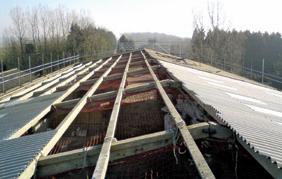
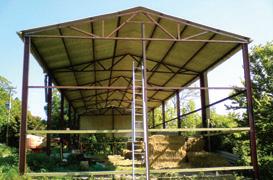



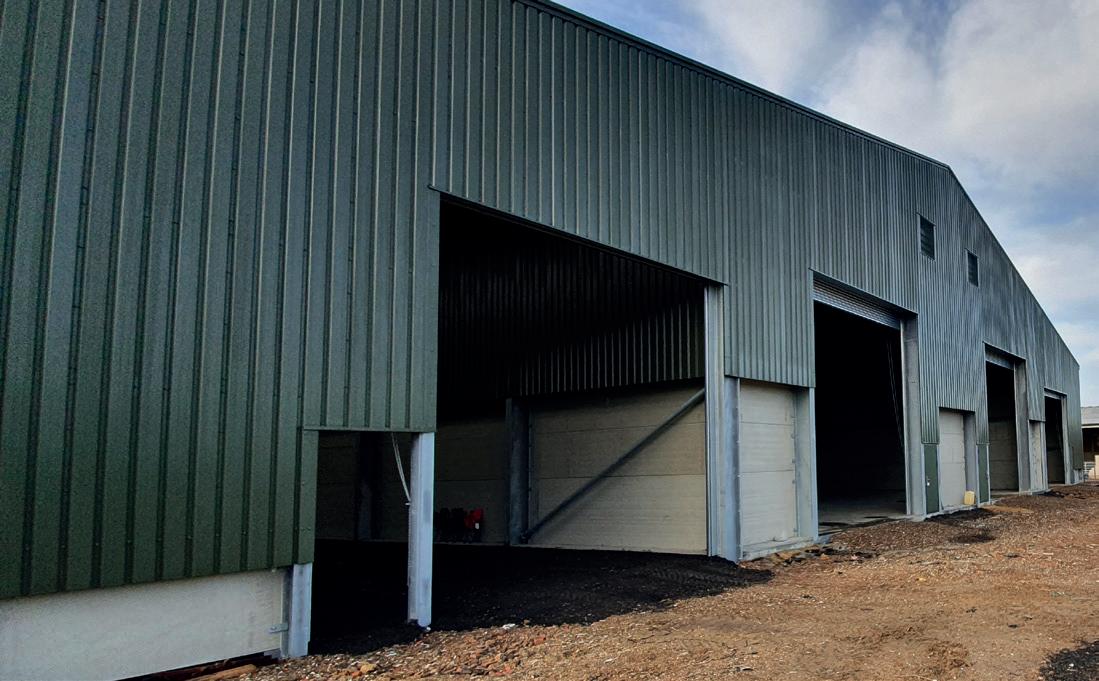
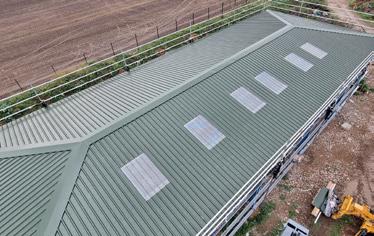






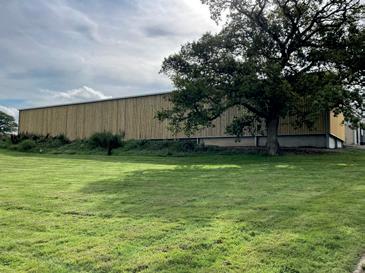



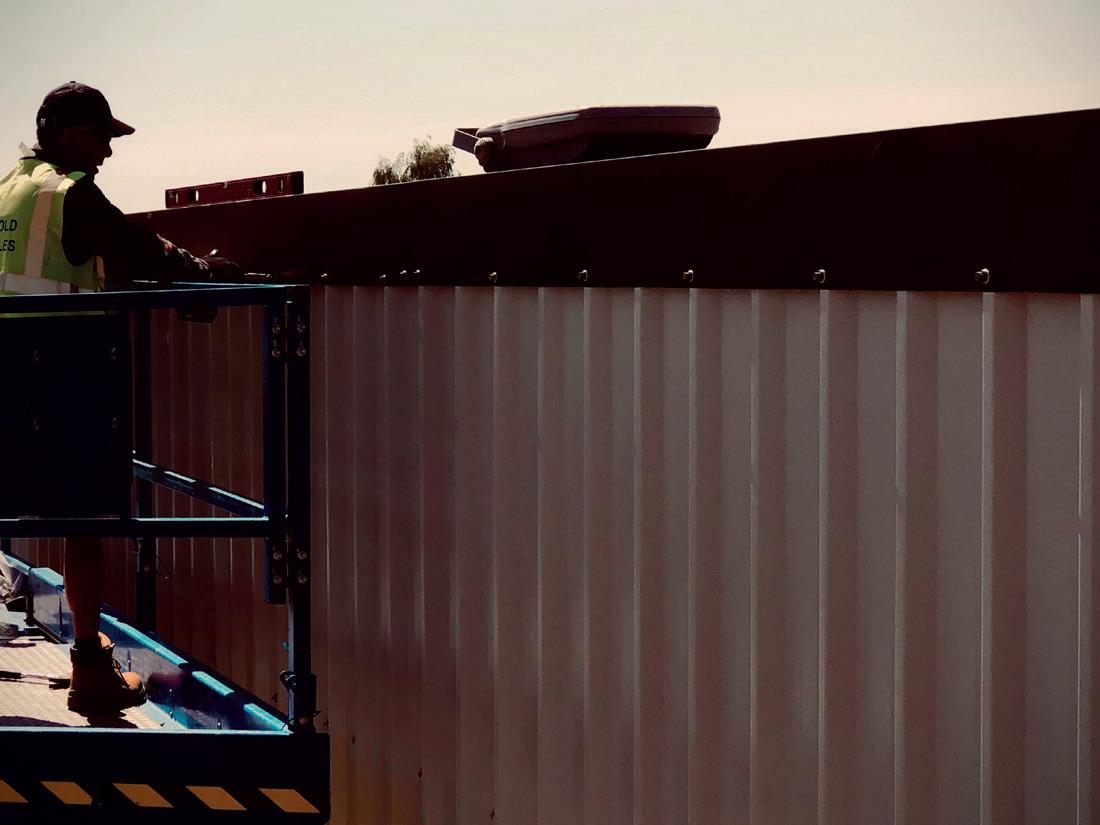






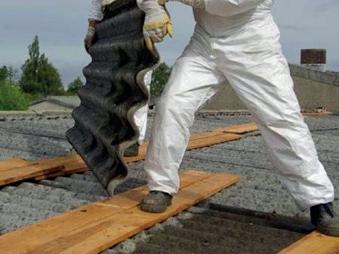

FEBRUARY 2023 | WWW.SOUTHEASTFARMER.NET 64 CLASSIFIEDS JPR ROOFING & CLADDING… Professional Services to the Agricultural, Industrial & Equestrian Sectors ROOFING & CLADDING Including: • Sheeting & Cladding to New & Existing Buildings • Roof repairs, Replacements and over sheeting • Insulated or single skin plastic coated sheeting in a wide range of colours • Concrete fibre sheeting, Big 6 profile etc • Asbestos sheeting removal & disposal, using registered waste carrier • Valley gutters, concrete or metal, repaired or re-lined • Roof lights replaced or covered • Maintenance Programmes to avoid the problems that occur with neglect • Conversions & extensions to existing buildings • Groundworks, Access Roads, Drives, concrete bases, Drainage etc FIRE,FLOOD & STORM DAMAGE Including: • 24 Hour Call out service • Making site/building/premises safe • Structural safety assessment • Emergency clear-up operations • Emergency procedures to reduce impact on your business or premises • Demolition/site clearance • Asbestos removal/clearance & disposal, using registered waste carrier • Re-instatement works • Insurance Claims ALL WORKS GUARANTEED Specialists in: FREEPHONE: 0800 756 9886 Covering Kent, East/West Sussex and the South East from BT land-line MOBILE: 07813 142 145 CONSTRUCTION Specialist in the Agricultural, Industrial and Equestrian sectors Steel frame supply and erect or just supply. Sheeting, cladding and oversheeting. Gutter replacement, repairs and lining. Steel frame, concrete frame alterations and repairs. Asbestos removal. Roof light and sheet changes. Refurbishments and usage changes. Demolition, groundworks and site clearance. 24 hour call out in the event of fire or break in. Roller shutters, sliding and personnel doors. Drone surveys Insurance and repair work On site welding and steel fabrication ALL WORKS GUARANTEED 01227 918723 Quality of work Reliability and honesty Unbeatable on price 07784 619603 jez@JRJconstruction.co.uk www.JRJconstruction.co.uk We are a Hampshire-based family run company specialising in the refurbishment, renovation, alteration and upgrade to the external envelope of buildings within the industrial, commercial and agricultural sectors. Our services Structural Steel Cladding Systems Roof Repairs Doors Gutter Maintenance Asbestos Removal Tel: 02380 617383 Email: info@symesindustrial.co.uk Web: www.symesindustrial.co.uk Units 6 & 7, Upper Norton Farm, Sutton Scotney, Hampshire SO21 3QF Industrial Commercial Agricultural Penfold’s commercial, agricultural and residential building specialists with over 40 years experience – Standing seam – Snaplock systems – Aluminium – Zinc – Copper METAL ROOFING – Composite cladding – Metal cladding – Fibre cement cladding – Timber cladding CLADDING – Removal – Disposal – Surveys ASBESTOS REMOVAL 07864 823 476 07889 481618 Nextgen Cladding Ltd www.nextgencladding.co.uk










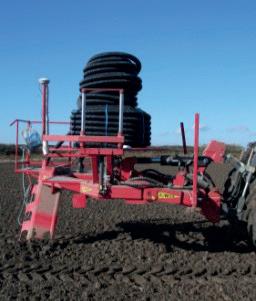

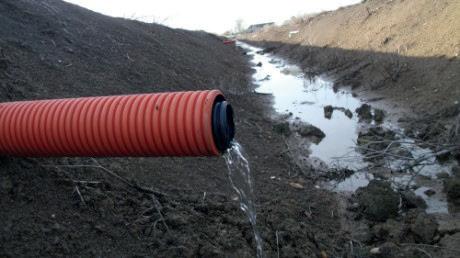
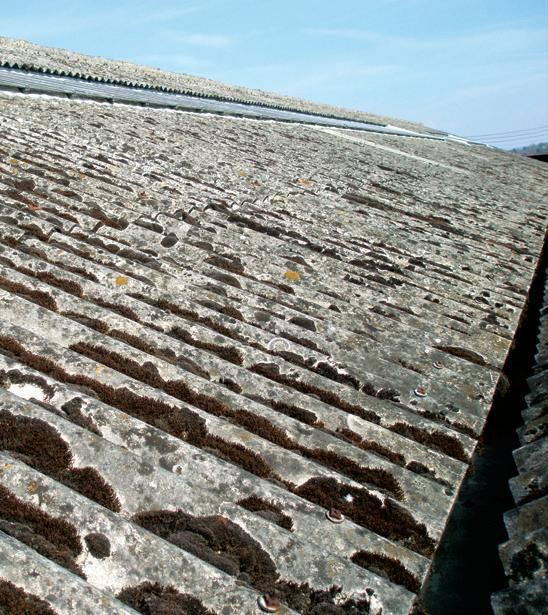
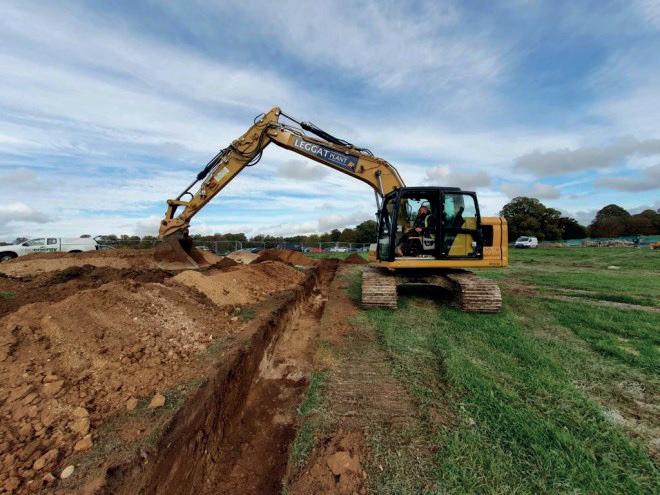




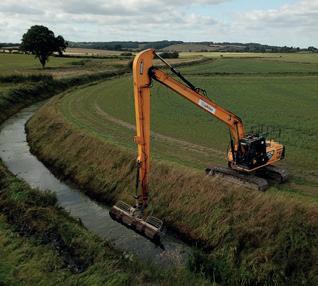
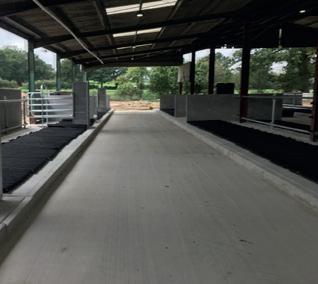
WWW.SOUTHEASTFARMER.NET | FEBRUARY 2023 TO ADVERTISE CALL 01303 233883 CLASSIFIEDS CONTRACTORS Mobile: 07976 287836 Email: sales@shortlandstructures.com www.shortlandstructures.com • STEEL FRAMED BUILDINGS • CLADDING • ERECTING • • EXTENSIONS • ALTERATIONS • CONCRETE PANELS • ROLLER/SLIDING/PERSONNEL DOORS • SHORTLAND STRUCTURES LTD ● LAND DRAINAGE ● DITCHING ● POND WORK ● WATER SUPPLIES ● SEWAGE TREATMENT PLANTS ● GROUNDWORKS ● PLANT HIRE 360° EXCAVATORS FOR ESTIMATES & ENQUIRIES (01622) 890884 G & S BROWN Drainage Contractors Working with farmers since 1947 Email: info@brownsdrainage.co.uk www.brownsdrainage.co.uk SWA SW ATTWOOD & PARTNERS • FIELD MAPPING • DRAINAGE SURVEYING • DESIGN • DRAINAGE FOR FURTHER INFORMATION OR VISIT OUR WEBSITE TOM: 01795 880441 or 07943 192383 EMAIL: james@swattwood.com S W ATTWOOD & PARTNERS LAND DRAINAGE james@swattwood.com PLEASE CONTACT US OR VISIT OUR www.attwoodfarms.com GRAIN STORAGE & LAND DRAINAGE PLANT HIRE INERT TIPPING CLAY SALES FROM £220 PER ACRE FIELD MAPPING DRAINAGE SURVEYING DESIGN DRAINAGE LAND DRAINAGE www.swjfattwood.com S W ATTWOOD & PARTNERS LAND DRAINAGE PHONE: 01795 880441 EMAIL: james@swattwood.com FOR FURTHER INFORMATION PLEASE CONTACT US OR VISIT OUR WEBSITE: www.attwoodfarms.com GRAIN STORAGE & TESTING LAND DRAINAGE PLANT HIRE INERT TIPPING CLAY SALES FROM £220 PER ACRE DRAINAGE SURVEYING S W ATTWOOD & PARTNERS LAND DRAINAGE james@swattwood.com PLEASE CONTACT US OR VISIT OUR www.attwoodfarms.com GRAIN STORAGE & TESTING LAND DRAINAGE PLANT HIRE INERT TIPPING FROM £220 PER ACRE DRAINAGE SURVEYING DRAINAGE CONSTRUCTION CONTRACTORS FREEPHONE: 01233 659129 from BT land-line charlie.woodger@btinternet.com Asbestos roof sheeting removals Asbestos encapsulation Asbestos fire damage, clearance & re-instatement works Asbestos clearance & de-contamination Asbestos disposals by licenced registered company New metal roofs installed over old asbestos roofs Roof light & sheet repairs Gutter repairs Gutter replacements & re-lining Strip & refurbishment works Change of use projects Demolition & Groundworks CALL TO DISCUSS YOUR PROJECT! Professional Services to the Agricultural, Industrial & Equestrian Sectors ALL RISKS LTD ASBESTOS ROOF REMOVALS CIVIL ENGINEERING GROUNDWORKS CONSTRUCTION BUILDING ERECTION LIVESTOCK & CROP STORAGE SOLUTIONS LAND DRAINAGE SYSTEMS NEW SERVICES INSTALLATIONS FOUNDATION EXCAVATIONS RENEWABLE ENERGY INSTALLATION & MUCH MORE! 01342 325738 | leggatplant.com sales@leggatplant.com @leggatplant @leggatplant LEGGAT PLANT LP LAND DRAINAGE, EARTHWORKS, GROUNDWORKS & CONSTRUCTION FULL LAND DRAINAGE SERVICE Sportsfields, amenity and irrigation systems using Mastenbroek trenchers PONDS, LAKES & RESERVOIRS Construction and maintenance GROUNDWORKS & CONSTRUCTION Primary excavations, aggregate sub-base, agricultural construction and concreting ENVIRONMENTAL HABITATS Water course maintenance and improvement works For all enquiries call 01233 860404 or 07770 867625 (Harvey) T P DRAINAGE AND GROUNDWORKS Treatment Plants, slurry pits, ditches, field irrigation, concrete bays and footings, cattle grids, grubbing out hedges and trees. Call 07494 269848 Email tommypenfold24@gmail.com
Redhill Farm Services: Fencing Division


















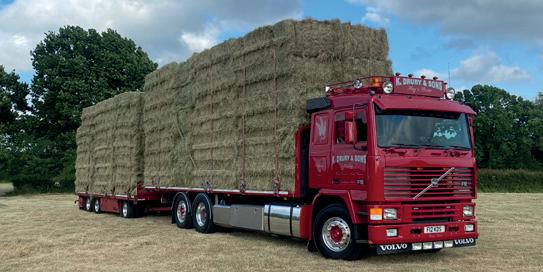
Supplied and erected & Repairs
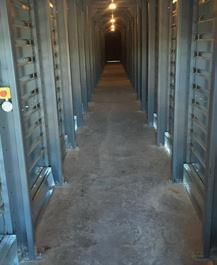









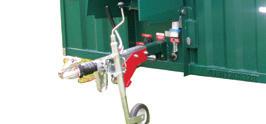







Tel: 01737 821220 Mob: 07768 931891
Email: redhillfarmservices@gmail.com
Standing Sweet Chestnut Wanted Cleft post and rail Cleft field gates
Standing Sweet Chestnut Wanted Cleft post and rail Cleft field gates
CWP fencing


Standing Sweet Chestnut Wanted Cleft post and rail Cleft field gates
Fencing stakes
Fencing stakes
Fencing stakes
Straining posts
Straining posts
Straining posts




Chestnut fencing
Chestnut fencing
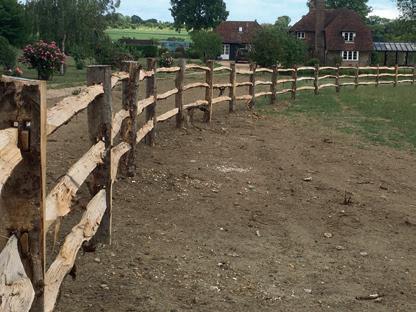
Tel: 07985 298221 colin@cwpfencing.co.uk
Chestnut fencing Tel: 07985298221 colin@cwpfencing.co.uk
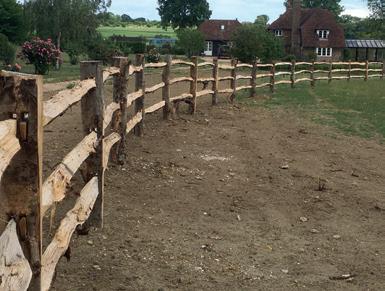

Tel: 07985298221 colin@cwpfencing.co.uk
To advertise in South East Farmer telephone 01303 233883


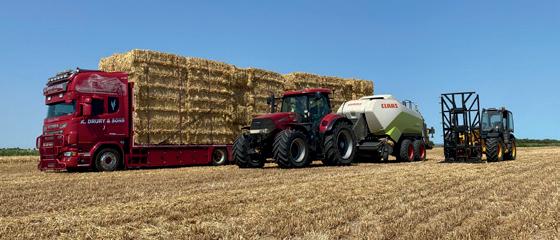


FEBRUARY 2023 | WWW.SOUTHEASTFARMER.NET 66 CLASSIFIEDS
CONTAINERS FENCING HAY & STRAW IN STOCK | ROUND & BIG SQUARE BALES
Hay & Straw Merchant | Machinery Haulage Find us on Facebook FOR HIRE CROP DRYING FOR SALE
HAULIERS
07860 728204
ALL TYPES OF FENCING & GATES
STORAGE TANKS Visit www.smdd.co.uk or call 01594 833308 Buy from stock. Visit us to collect or same day dispatch with nationwide delivery. New and recycled IBC tanks. Plastic and steel drums. Water tanks & plenty of fittings. Smiths of the Forest of Dean The Tank and Drum Experts Visit www.smdd.co.uk or call 01594 833308 Buy from stock. Visit us to collect or same day dispatch with nationwide delivery. New and recycled IBC tanks. Plastic and steel drums. Water tanks & plenty of fittings. Smiths of the Forest of Dean The Tank and Drum Experts • Toilets & Showers for hire • Large range of Temporary canteens, stores & welfare units • E uent Tank Emptying • Events also catered for with chillers & toilets FOUR JAYS GROUP Tel: 01622 843135 Fax: 01622 844410 enquiries@fourjays.co.uk www.fourjays.co.uk HIRE SPECIALISTS ACROSS THE SOUTH EAST Container Sales & Rental New & Used Guaranteed Wind/Watertight equipment 10ft, 20ft & 40ft Equipment available Crawley – viewing by appointment only Freight Container Services (FCS) 01403 268723 • 01636 616335 • 07831 142 401 sales@fcs-uk.co.uk www.freightcontainerservices.com ENT Machines E: enquiries@kentmachines.co.uk T: 01732 884 551 • Mini Diggers • Telehandlers • Forklifts • Trailers @kentmachines.co.uk for SALE @KentMachines Kent Machines Ltd www.kentmachines.co.uk www.pellcroft.com | sales@pellcroft.com | 01526 342466 PELLCROFT Manufacturers of centrifugal, low volume and portable fans, air tunnels, drive over oors, grain stirrers and gas burners
COMPLETE OUR CROSSWORD TO WIN
One bottle of Gribble Bridge Sparkling Rosé and five bottles of Red Love® apple juice

ACROSS
1 Finish (9)
5 Smudge, mark (5)
8 Capturing, interesting (8)
9 To openly display emotion (5)
11 A wide ditch filled with water surrounding a castle (4)
12 Suffocate a person (7)
14 A person who is an expert in cultivation (14)
16 Musical instrument (7)
18 Method of transport in inclement weather (6)
21 A place where operations take place (7)
24 Cut with shears (4)
26 Increase fivefold (9)
27 To become occupied and engrossed in something (8)
28 Fee paid to travel on a road or bridge (4) DOWN
1 Dairy product (5)
2 Derisory term for a horse (3)
3 Wood used for fuel (4)
4 Braking system using an electric traction motor as generation (7)
6 Domestic appliance (5)
7 A formal speech (7)
10 Lead pellets in a cartridge (4)
13 Cease (4)
14 Non-native ladybird (9)
15 Second hand (4)
17 A place to wipe your feet (3)
18 Loose stones on a mountain top (5)
19 Weapon (3)
20 Urgently request (6)
22 Inn (5)
23 Fruit (5)
24 A supporting rod (5)
PRIZE ANAGRAM: Condition that occurs in sheep (9,8)
LAST MONTH’S ANSWERS:
Email your replies with your name, address and phone number to sef.ed@kelsey.co.uk
Correct entries will be entered into a draw which will take place on 20 February. The winner will be announced in the March edition.
Love is in the air! We’re offering readers the chance to win one bottle of Gribble Bridge Sparkling Rosé and five bottles of Red Love® apple juice. For more information about the vineyards, please visit www.biddendenvineyards.com or call 01580 291726.
*Subject to availability
Correct answer: British Saddleback
LAST MONTH’S WINNER: Kate Sills from Basingstoke, Hampshire
WWW.SOUTHEASTFARMER.NET | FEBRUARY 2023 67 TO ADVERTISE CALL 01303 233883 ®
VI NE YA R DS
VI NE YA R DS
CROSSWORD
To enter, simply unscramble the anagram (9,8) using the green squares.
1 2 3 4 5 6 7 8 9 10 11 12 13 14 15 16 17 18 19 20 21 22 23 24 26 27 28 1 2 3 4 5 6 7 8 9 10 11 12 13 14 15 16 17 18 19 20 21 22 23 24 25 26 B A C K F I R E S P A R E A A E E L I C A T B E L L S B A R O N O C T E C C T N H B A N D A G E O G S S U C H I L T E R N H I L L S O A S S N O W D O N F I L L E T F I A E Y S I T S H I R T M E L T D P A U R D E C E I T F U L L E N L C E S T A R L I G H T H O S T
Crossword by Rebecca Farmer, Broadstairs, Kent





West Country Farming & Machinery Show Brought to you by Sponsored by: Auction Sponsor: AGRI & PLANT DIVISION AGRI & PLANT DIVISION Terms and conditions apply: *Subject to final approval. ^Limited availability, other food options available. Wednesday 22 February 2023 at Westpoint Exeter REGISTER FOR YOUR FREE TICKET AT www.westcountryfarmmachineryshow.co.uk Register toWin Everyone who registers and attends will be entered into a prize draw to win an iPad worth £499! All the latest livestock and arable machinery from the biggest manufacturers in one place! Live auction of over 200 farm machinery items Handling demonstrations by Case IH, Merlo, John Deere, Manitou, Zetor and JCB BASIS, FACTS and NRoSO points available* Dedicated NAAC lounge for professional farm contractor members and visitors FREE Devon bacon roll^ for all early bird arrivals! Courtesy of Case IH Experience the latest John Deere Gator with all proceeds going to charity Series of seminars on topics relevant to farmers and farming today FREE PARKING Plus easily accessible, just minutes from the M5


































































































































































































































































































































































































































































































































































































































































































































 T: 01273 473232
T: 01273 473232
 E: leonille.griffiths@cliffevets.co.uk
E: leonille.griffiths@cliffevets.co.uk


























































































































































































